




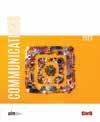













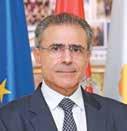

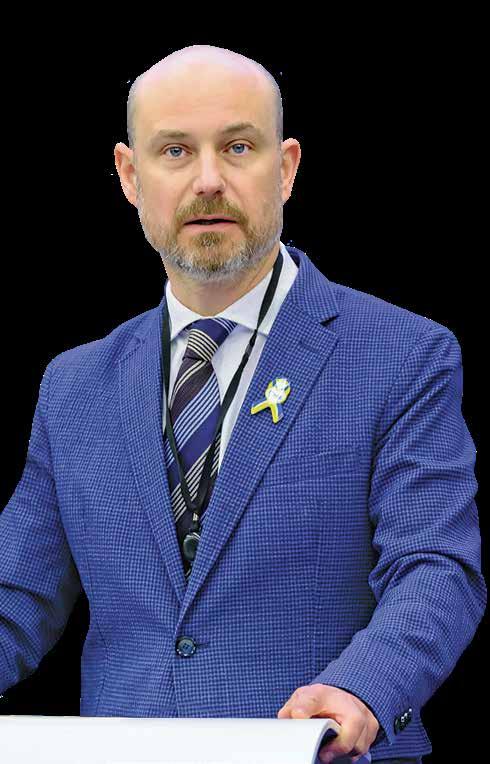
9 771451 783002 ISSN1451-7833 TAMARA DALTROFF CEO OF THE EUROPEAN ASSOCIATION OF COMMUNICATIONS AGENCIES (EACA) Promoting The Power Of Self-Regulation H.E. DEMETRIOS THEOPHYLACTOU AMBASSADOR OF CYPRUS TO SERBIA Double Standards Are Counterproductive IVA DRAŠKIĆ VIĆANOVIĆ DEAN OF THE UNIVERSITY OF BELGRADE, FACULTY OF PHILOLOGY Being And Remaining Worthy interviews opinions news comments events www.cordmagazine.com FEBRUARY 2023/ ISSUE NO. 220 Confusion & Hypocrisy COMMENT FOCUS VLADIMIR BILČIK MEP, EUROPEAN PARLIAMENT RAPPORTEUR FOR SERBIA A Clear Message To Serbia Exclusive SERBIA – KOSOVO CONFLICT

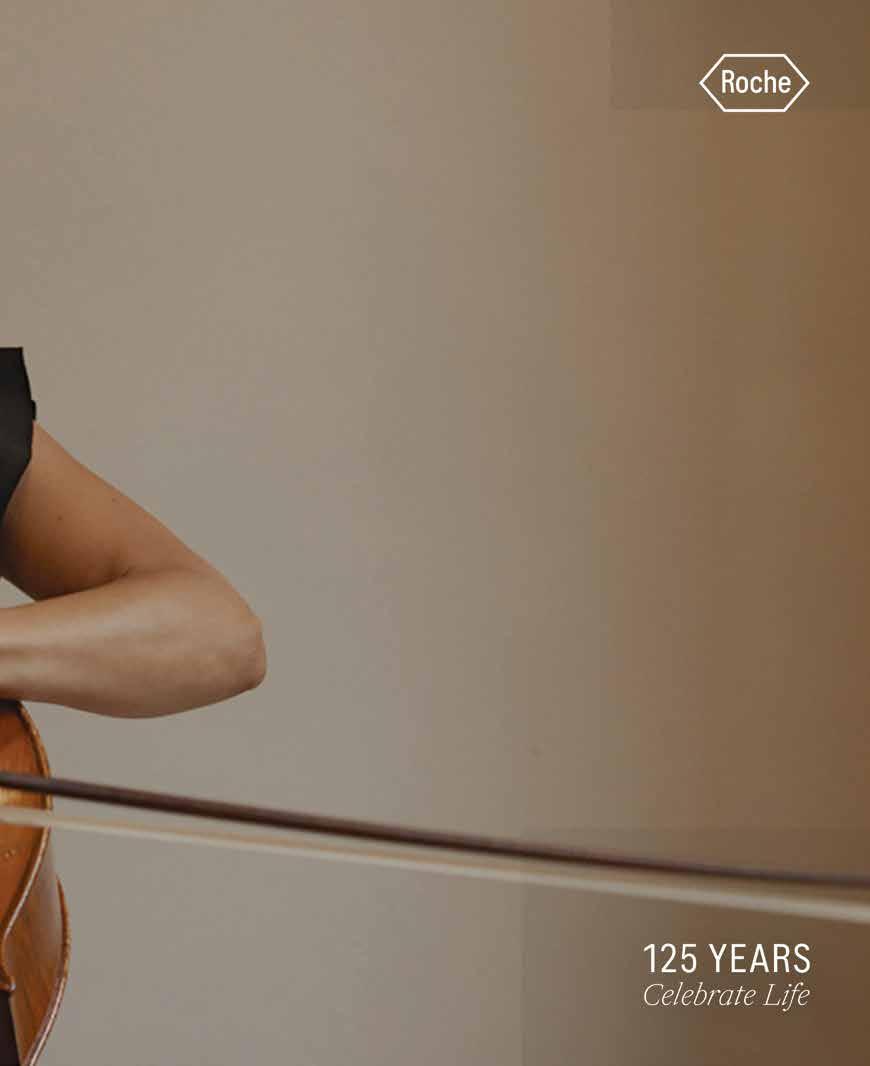
CURRENT TOPIC
By Zoran Panović
@CORD_MAGAZINE
@CORDMAGAZINE
@THECORDMAGAZINE
CORDMAGAZINE

EDITOR IN CHIEF:
Neda Lukić n.lukic@aim.rs
ART DIRECTOR:
Branislav Ninković b.ninkovic@aim.rs
CONTRIBUTORS:
Ljubica Gojgić, Radmila Stanković,
Maja Vukadinović, Mirjana Jovanović, Miša Brkić, Rob Dugdale, Steve MacKenzie, Zorica Todorović Mirković, Sonja Ćirić, Miloš Belčević
PHOTOS:
Zoran Petrović
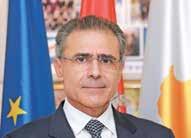
COPY EDITOR: Mark Pullen
TRANSLATION & EDITING: PULLEN EDITORIAL HALIFAX
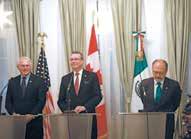
SALES MANAGERS: Biljana Dević, b.devic@aim.rs

Mihailo Čučković, m.cuckovic@aim.rs

Renata Šteković Zagorac r.zagorac@aim.rs
Bojana Nikolić b.nikolic@aim.rs

OFFICE MANAGER: Svetlana Petrović s.petrovic@aim.rs
FINANCE: Dragana Skrobonja finance@aim.rs



EXECUTIVE DIRECTOR: Maja Vidaković m.vidakovic@aim.rs
DIRECTOR: Ana Novčić a.novcic@aim.rs a.novcic@cordmagazine.com
PUBLISHER: Ivan Novčić i.novcic@aim.rs

IVA
PRINTING: Rotografika d.o.o. Segedinski put 72, Subotica
CorD is published by:
alliance international media
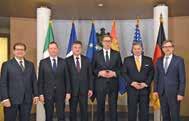
Prote Mateje 52, 11111 Belgrade 17, PAK 126909, Serbia
Phone: +(381 11) 2450 508
E-mail: office@aim.rs office@cordmagazine.com www.cordmagazine.com www.aim.rs
58
60
62
ISSN no: 1451-7833
All rights reserved
alliance international media 2023
The views expressed in this publication are those of the presenter; they do not necessary reflect the view of publications published by alliance international media
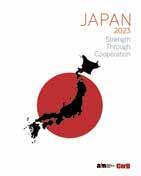

4 February “CorD does not criticise or critique. We are a place where people can inspire and be inspired by others” 06 CONFUSION & HYPOCRISY
06 VLADIMIR BILČIK MEP, European Parliament Rapporteur for Serbia A CLEAR MESSAGE TO SERBIA 14 H.E. DEMETRIOS THEOPHYLACTOU Ambassador of Cyprus to Serbia DOUBLE STANDARDS ARE COUNTERPRODUCTIVE 18 GLOBAL DIARY 20 SERBIA – KOSOVO CONFLICT Focus ETERNAL REPETITION OR HISTORICAL CHANCE? 24 GROWTH PLATFORM Feature 30 YEARS OF NAFTA
BUSINESS DIALOGUE 43 PRIORITISING COMMUNITY WELLBEING Profile JELENA MEDAKOVIĆ, DIRECTOR OF THE BELGRADE CITY MUSEUM
10 GREAT WOMEN SCULPTORS YOU SHOULD KNOW Art
27
44
REMAINING WORTHY
life
50 BEING AND
My
THE UNIVERSITY OF BELGRADE FACULTY OF PHILOLOGY
CHILL OUT
DRAŠKIĆ VIĆANOVIĆ, DEAN OF
56
REMEMBERING VIVIENNE WESTWOOD Fashion
CULTURE CALENDAR
FACES & PLACES CONTENTS

However, gaslighting doesn’t necessarily have to relate to deceiving media manipulation that causes people to doubt their own experience of reality. The perception of deception can be much more subtle with gaslighting, and only then is it harder to perceive the “desert of the real”, as Morpheus would say to Neo in The Matrix. When Russia claims to Serbia persistently and “fraternally” that it cares about Kosovo being part of Serbia, that’s gaslighting, just as it’s a form of gaslighting when the “collective West” (as Putin followers like to call it) claim to “care” a lot about Serbia’s European future.
The winning term in Oxford Languages selection for 2022 Word of the Year is “goblin mode”, a slang term referring to a type of behaviour that is unapologetically self-indulgent, lazy, slovenly or greedy. If that is the case, then the typical media consumer is operating in “goblin mode”. And those who understand the world of Tolkien’s Middle-earth or Rowling’s world of Harry Potter understand why goblin specifically! Serbian media consumers operating in “goblin mode” are rapacious when it comes to consuming ‘porno’ nationalism and obscure entertainment, and slovenly and passive when it comes to selfawareness, democracy, institutions (and belong to the section of the public sphere that Habermas dubbed manipulative, in contrast to the critical part of the public sphere). Goblin mode comes
BY ZORAN PANOVIĆ
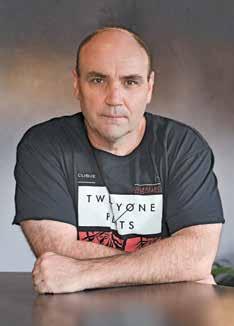
Confusion & Hypocrisy
American dictionary publisher Merriam-Webster declared “gaslighting” the word of the year for 2022, with the explanation that it reflects the current era of disinformation and other misleading media manipulation. The term comes from the title of the 1938 play Gaslight, written by Patrick Hamilton. A film of the same name was made six years later. Starring Ingrid Bergman, it tells the story of a man who drives his wife crazy to the point that she begins to doubt her own thoughts and mental stability
as a direct consequence of gaslighting. Research conducted by Belgrade’s Demostat shows that the majority of Serbian citizens are under the influence of gaslighting and are in goblin mode.
Confusion, contradiction and hypocrisy are characteristics of Serbian public opinion. Con-
It’s absurd, but most Pro-Vučić media outlets have been antiWestern for years, and the cult of Putin has been nurtured systemically. It is now political ballast for Vučić when he is called “little Putin”, whether realistically or sarcastically
tributing to this, alongside media manipulation, is anomie, i.e., the breakdown of moral standards causing a crisis of social values, as formulated long ago by architect of modern social science Émile Durkheim. And Demostat’s latest research, covering only the territory of Belgrade (December 2022), showed that citizens are simultaneously in favour of both democracy and autocracy; that they confuse actual neutrality and neutrality as a euphemism for a pro-Russian stance, with the majority emotionally supporting Putin’s Russia while
rationally wanting to live more like Westerners. There is even an emergence of nihilism – cheering for Putin to drop atomic bombs. The zero point of a new identity has been in the making since the NATO aggression of 1999. Even Vučić has become imprisoned by his own propaganda and has to prepare the public to choose the EU, despite Serbia having purportedly already been on that path. It’s absurd, but most Pro-Vučić media outlets have been anti-Western for years, and the cult of Putin has been nurtured systemically. It is now political ballast for Vučić when he is called “little Putin”, whether realistically or sarcastically.
When the layers of hypocrisy are revealed, there are more Belgraders who are aware of the reality in Kosovo, while three-fifths of respondents in the capital don’t favour a new war with the Albanians. On the other hand, the majority of Belgraders believe that Serbia should maintain good relations with Russia even if that comes at the cost of giving up on EU integration. And Belgraders are slightly more pro-EU: across the rest of Serbia beyond Belgrade, there are even more Putin supporters and more authoritarians.
The ruling Serbian Progressive Party isn’t conceptually homogeneous, but Vučić also knows that it has a large section that’s more pro-Putin than the non-Progressive right (which isn’t extreme), and it’s questionable whether Vučić still has a controlling package of shares over the right… And which one.
6 February
Comment

A Clear Message To Serbia
VLADIMIR BILČIK
MEP, EUROPEAN PARLIAMENT RAPPORTEUR FOR SERBIA
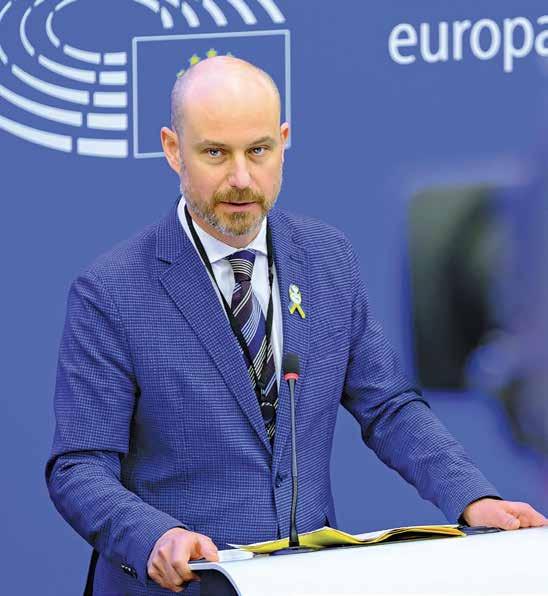
MEP Vladimir Bilčik, who currently serves as European Parliament Rapporteur for Serbia, says that he wasn’t pleased with some parts of the recently adopted EP Resolution on the common foreign and security policy that relate to Serbia, but that real, detailed analysis can be found in his own report, which has just been released. Commenting on the harsh tones directed towards Serbia from the EP, Bilčik reiterates in this CorD Magazine interview that, under the conditions of war in Europe, Serbia is expected to make a clear choice, while he also confirms that the EP is not calling for the freezing of Serbia’s European integration process.
You visited Belgrade in late January, with local media reporting that you are renewing the political dialogue in Serbia that was first launched in 2019. Given that there have been two election cycles since then, what is that dialogue focused on now?
We are ready to continue the EP facilitated Inter-Party Dialogue (IPD), which has been taking place in Serbia since 2019, and this is going to be a new phase of the IPD. We are pleased that Speaker Orlić and the new Serbian National Assembly are ready to engage. We are very much ready to help all relevant legal forces improve the work and quality of democracy and democratic institutions. We will discuss the exact focus of this next phase of the dialogue with our partners: Speaker Orlić, of course, and all relevant parliamentary groups, both among the government and the opposition. At the moment I can’t tell you what the exact focus will be, since this will be subject of our discussion, especially on Friday [27th January 2023]. My personal hope is that we can be helpful in facilitating a parliamentary dialogue that can help improve democratic institutions, especially the Parliament and Parliamentary democracy,
8 February Exclusive
I have not heard or seen any indications that any of the five non-recognising countries would shift from their current position. What I have seen is agreement among the 27 member states that the only way forward is dialogue, dialogue, dialogue, and a commitment to the normalisation of relations between Belgrade and Pristina, on the basis of a comprehensive and legally-binding agreement ~ Vladimir Bilčik
Interview
EP RESOLUTION
Let’s be very clear: this is not about gestures, this is not about some symbols or occasional lip service, this is about a strategic choice
the quality of the discussion, but we will also touch on a number of areas and a number of conditions that are necessary for democracy in Serbia, including the overall public and media environment and all conditions necessary for a free and fair campaign in the run up to the next elections. Based on public announcements, we expect that the next elections to be held sometime next year. But, again, the exact focus of the dialogue will be discussed with the authorities in Belgrade, because we are just co-facilitators between the EP and the National Assembly and we co-facilitate dialogue among the political parties, together with speaker Orlić and the leadership of the National Assembly.
Your latest trip to Belgrade came after the release of the European Parliament Resolution on the implementation of the common foreign and security policy. According to the tone of the part that relates to Serbia, it is certainly one of the harshest documents you’ve adopted, which practically propose freezing Serbia’s European integration process if the country fails to impose sanctions against Russia. Given that you are the rapporteur for Serbia, are you in full agreement with the evaluation included in the document?
I was not pleased with some of the lastminute amendments that made it into the European Parliament resolution of 18 January 2023 on the implementation of the common foreign and security policy – annual report 2022, because this is a comprehensive report on the state of the Common Foreign and Security Policy (CFSP) of the European Union. It is absolutely appropriate to treat the Serbia situation and the relationship between Serbia and EU in a separate report. This would be the EP’s 2022 Report on Serbia, which is the Report that I am in charge of and that has just been published. That Report will focus primarily on the relationship between Belgrade and Brussels, and the state of the accession process. I was not pleased with last-minute amendments to the common foreign and security policy 2022 annual report.I know that a number of my colleagues weren’t pleased with this either, including rapporteur David McAllister, because this was really a comprehensive report covering
INTERNATIONAL LAW
The EP has always stood by, and will continue to stand by, the principles of the rule of law, including international law. I would hope that we have a constructive conversation that leads to convergence
many different aspects of CFSP. We can never do justice to the complexity of the situation in any member state or third country when we’re treated with a few specific references in a comprehensive report like this one. I just want to make everyone aware of the context here, and I think this is extremely important to keep in mind. Having said this, I also want to highlight that nowhere in this report is there any mention of the word ‘’freeze’’. There is no mention of freezing accession negotiations. My public reaction on this EP report was that this is a clear signal to everyone in Serbia who is serious about the European path and European integration that we expect and want Serbia to
RECOGNITION
By Ljubica Gojgić
work with us in all areas, and any progress on the EU path will be determined by the progress of Serbia. This is Serbia’s choice in key policy areas, key policy reforms, including, of course, the CFSP policyand alignment with the EU in this area, which unfortunately has been consistently low; the lowest among all candidate countries in the Western Balkans, and especially low since the Russia launched its brutal aggression against Ukraine.
Whilst we do not recognise Kosovo, we recognise and support the European future and European integration for the entire Western Balkan region, for all the people in the Western Balkans
The resolution failed to acknowledge Serbia’s UN voting, in which it declared its opposition to the aggression and the undermining of Ukraine’s territorial integrity in the same way as other EU members, but also other gestures made by Belgrade that serve to condemn the war and support the citizens of Ukraine. Why is this overlooked while insisting on mandatory full alignment with the common foreign and security policy, despite the rules of accession negotiations not requiring this of the membership candidate country at this stage?
Nothing is overlooked. I have explained that this was a particular reference to Serbia in a much bigger report (Serbia was mentioned in two paragraphs from 177) on a broad global situation with respect to the common foreign and security policy. If you read my draft report on Serbia that has just been released,, you will also see very clear references to Serbia’s voting in the UN. Nothing is overlooked, and nothing will be overlooked. But let’s be also very clear: this is not about gestures, this is not about some symbols or occasional lip service, this is about a strategic choice. We have war back in Europe; this war was started by Russia’s illegal and brutal invasion of Ukraine. That war continues and the entire EU and all of the EU membership candidate countries, with the exception of Serbia, have aligned with the same restrictive measures. In that sense, this is a strategic choice, and I think that everyone is aware of Serbia’s position in the UN and other international organisations. But what counts the most when it comes to Serbia’s EU accession is Serbia’s commitment to the EU’s positions, and here, unfortunately, there has not been a promising trend. There has been a real divergence, and in this case a strategic divergence, because this is a question of war and peace. Simply put, it is a question of whether you are with us or not. Serbia has made a choice and continues to make a choice that clearly differentiates it from other countries. That is well noted and, of course, that choice has important consequences for any further progress in the EU accession process. This is also something that is not only mentioned in the document from the European Parliament, but is also clear in
9 February
It has been clear for years that Serbia’s progress will be determined by three things. First are reforms in the area of the rule of law linked to structural democratic changes in the country. Second is progress on the Dialogue between Belgrade and Pristina. Third is the commitment to aligning with the foreign and security policy
Exclusive Interview
the latest report of the European Commission, which was published last autumn, last October, and it’s also very clear from EU member states. I think there is absolute consistency in this. It has been clear for years that Serbia’s progress will be determined by three things. First are reforms in the area of the rule of law linked to structural democratic changes in the country. Second is progress on the Dialogue between Belgrade and Pristina. Third is the commitment to aligning with the foreign and security policy. Since that progress has not been forthcoming, especially in this game-changing moment for security in Europe, then there are, of course, many question marks about Serbia’s position and commitment. In that sense, the ball is very much in Belgrade’s court. We see all the signals, we see all positions in all international organisations, but the key question is whether Serbia is ready to work with us in the EU? The EU is ready to work with Serbia and has been doing so. I think this is something that has to be made very, very clear when we discuss any such references in EU documents.
Serbia’s foreign minister dubbed this Resolution hypocritical. You were asked by Ivica Dačić in the European Parliament the extent to which you are in alignment with international law when you express your views with regard to Kosovo and Serbia’s own territorial integrity?
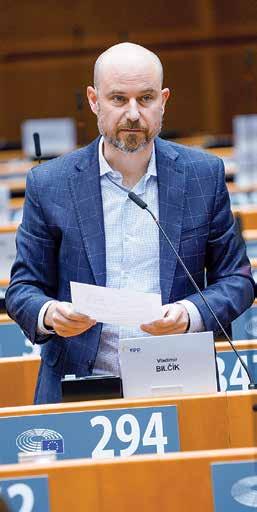
I take note of all the public comments about the resolutions we adopt, but these are important political signals that will reflect not only the positions of individual MEPs, but also reflect discussion, the mood and the positions of member states. I would like to underline that MEPs ultimately come from all 27 member states. Their positions are serious. The European Parliament has always stood by, and will continue to stand by, the principles of the rule of law, including international law. I would hope that we have a constructive conversation that leads to convergence, because we want to see Serbia on board with us. This is the signal we are sending. We are trying to reach out, to agree on the basis of a common understanding of our common destiny. But that has to take place on the basis of common principles and common positions, particularly when European peace is brutally attacked by Russia’s aggression in Ukraine. Our position is clear: we remain very much ready to shake the hands of all of those in Serbia who want to work with us, and we are ready to continue discussing how we can move on together. That’s because when I look at the map of Europe, and I look at the situation in Europe and the situation in Serbia, I see no other choice for Serbia than the European
choice. I understand that this requires important decisions by political leaders in the country, and these decisions have important consequences. But what is at stake in Europe is the European future of everyone.I come from a country that made a strategic choice in the 1990s, and this has been a gamechanger for the quality of our lives, for the quality of our public institutions, for the quality of democracy, for the quality of living standards of all people in Slovakia. I hope that Serbs and everyone else living in Serbia can have the same future. This also, of course, depends on the kinds of decisions and the kinds of positions that political leaders in Serbia take. We are ready, we are patient and we are engaging. There is yet more very clear proof in the fact that me and Matjaž Nemec [Slovenian MEP] are travelling to Belgrade this week.
According to the assessment of you and your colleagues, the only threat to peace and obstacle to dialogue with Pristina is located in Belgrade. These views differ markedly from the assessments of other EU officials, including special envoy Miroslav Lajčák, who have noted for years that Pristina refuses to formalise the Community of Serbian Municipalities stipulated under the Brussels Dialogue. How do you see that?
I would suggest that you please read all relevant documents. If you read my Report,all relevant assessments of the situation regarding the Belgrade - Pristina Dialogue are there, including the call to establish the Community of Serbian Municipalities, which is a longstanding commitment dating back to the last decade. It also contains condemnations of the tension and violence, including the shootings in Kosovo on Serbian Orthodox Christmas Eve. Once again, please consult relevant documents, don’t make hasty conclusions on the basis of one resolution that deals with much larger issues. The position of the EP is very much aligned with the position of Miroslav Lajčák and the High Representative, who have been engaged in facilitating this Dialogue. It’s very much aligned with the position of the European Council. We also express full support for the work of Miroslav Lajčák and there is no divergence here. This is certainly the case on the basis of the relevant documents. For me, the most relevant document is the EP Report on Serbia.
Your own report is somehow not as harsh. You note Serbia’s progress even when it comes to voting in the UN with regard to the war in Ukraine. How should one understand the differences between
10 February
If you read my Report,all relevant assessments of the situation regarding the Belgrade - Pristina Dialogue are there, including the call to establish the Community of Serbian Municipalities, which is a longstanding commitment dating back to the last decade. It also contains condemnations of the tension and violence, including the shootings in Kosovo on Serbian Orthodox Christmas Eve
your report and the aforementioned resolution?
I have compiled a complex report on the situation in Serbia and the relationship between Belgrade and Brussels.The Resolution (European Parliament resolution of 18 January 2023 on the implementation of the common foreign and security policy – annual report 2022) that has been discussed in Serbia so much in recent days is a resolution that addresses much wider issues concerning the common foreign and security policy in a very broad sense. Such a resolution can never do justice to individual references, to individual countries, including Serbia. In that sense, please let us move on from discussing the resolution that did not deal with Serbia specifically, let’s discuss the resolution that is now up for discussion, and will be discussed by the European Parliament’s Foreign Affairs Committee in February, which will be amended, eventually negotiated, and voted on by the Foreign Affairs Committee this spring, and also in the plenary of the European Parliament. This will be a relevant document. I think we need to have discussions of our relationship on the basis of relevant processes, relevant procedures and relevant documents. Yes, the EP is a political body, at times individual members of that House want to highlight certain issues with respect to specific countries, but there is only one position of the House towards candidate countries that is expressed in a complex way. Those are the regular, annualreports by standing Rapporterus that are drafted and published every year. One such report has just been drafted, and will be discussed and voted on. Let us focus on what is relevant here.
You advocate in favour of the forming of the Community of Serb Municipalities, while that is being decisively rejected by Pristina. Where can an exit to this deadlock be found?
Dialogue, negotiations, agreement. It is very simple. That has been the recipe in past years, it’s the recipe for the next few days, weeks and months. I’ve been encouraged by some recent signals. In Belgrade in particular, there has been a great willingness to reach some mutual understanding, and I hope that the same mutual understanding can be also reached with respect to the authorities in Pristina. The ball is in the hands of both, and yes, I do appreciate the constructive tone and position we see from Belgrade at the moment. Let us hope that lasts andas I said, dialogue, talking, negotiating and, ultimately, agreeing is the only way forward. There is no alternative here. I feel and sense that this year could be the year that could see some historic breakthroughs in this situation.
Because the status quo is unsustainable. We’ve already seen mounting tension and a number of individual shootings in Kosovo in recent weeks. A European future for the region as a whole is only meaningful if there is peace, clarity and understanding of the responsibilities of all sides when it comes to resolving issues of the past and moving ahead towards the European future.
In contrast to other EU institutions that use a special mark for Kosovo to imply its unresolved status, the European Parliament uses the wording Republic of Kosovo, while it also supports Kosovo’s membership candidacy and calls for the abolishing of visas. What did Pristina do to qualify for such high marks?
I understand that symbols are extremely important in politics, but this has been a longstanding practice in the EP; this is not a new situation. I’m sure that you and many others in Serbia have noticed that. In that sense, the EP is a political body and is using the kinds of symbols in the sort of political communication it has been using for years. It also means that we fully respect all the competences of the relevant actors, including EU member states, and the principles of international law. We also very much respect the decisions made by other institutions. Here I have to most clearly disagree with the statement that the EP has a position that differs to that of other institutions, because it is, and has been for years, the European Commission that has advocated for visa liberalisation with Kosovo. Finally, there has been agreement on this in the Council of Ministers, which is composed of all 27 member states, including those that have not officially recognised Kosovo. All these countries have agreed on the principles according to which visas can be liberalised for all people in Kosovo. In that sense, the EP has supported a position that was presented/suggested by the Commission, has been agreed by the member states, and has now received the stamp of approval of
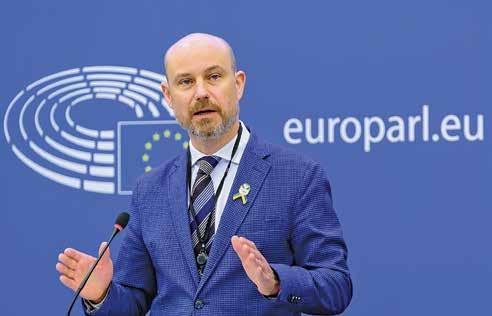
11 February
I have compiled a complex report on the situation in Serbia and the relationship between Belgrade and Brussels. The Resolution (EP resolution of 18 Jan 2023 –annual report 2022) that has been discussed in Serbia so much in recent days is a resolution that addresses much wider issues concerning the common foreign and security policy in a very broad sense. Such a resolution can never do justice to individual references, to individual countries, including Serbia
the EP. So, this is the reality. The EP has really been only one of the consensual institutions in this regard. And, quite frankly, this has been in line with what all the five countries that don’t recognise Kosovo have been saying inside the EU. Whilst we do not recognise Kosovo, we recognise and support the European future and European integration for the entire Western Balkan region, for all the people in the Western Balkans. In that sense, any clarity of the rules and conditions, guiding for instance the free movement of people, which is one of the basic freedoms of the EU, is a welcome step. It should be see as a supporting step for everyone in the region who’s keen to see the European future of the region. This concerns all people living in Kosovo, all nationalities living in Kosovo, including Serbs. I view this as an important step forward for the European future of the region, and the European future of the region as a whole. It has always been a priority among all governments of the region, including the one sitting in Belgrade.
Do you expect your own Slovakia, as well as other EU member states that don’t currently recognise Kosovo’s independence, to respond positively to the Resolution’s call for them to change their stance regarding Kosovo’s unilaterally declared independence?
I have not heard or seen any indications that any of the five non-recognising countries would shift from their current position. What I have seen is agreement among the 27 member states that the only way forward is dialogue, dialogue, dialogue, and a commitment to the normalisation of relations between Belgrade and Pristina, on the basis of a comprehensive and legally-binding agreement. This is a key issue. I understand that the majority of MEPs are calling for recognition by these five countries. That’s only natural, since 22 out of the 27 member states have recognised and continue to recognise Kosovo and the authorities in Pristina. This majority is reflected in the make-up of the European Parliament. In that sense, the majority of MEPs comes from countries that are representing the recognising countries. It should come as no surprise to anyone who understands political dynamics inside the EU, and also inside the EP. It’s also true that it is the sole prerogative and sole competence of the member states to decide when and under what conditions they will recognise any third country, and this continues to be the case.
The European Parliament is also calling on Serbia to continue reforms aimed at strengthening democracy and the judici-
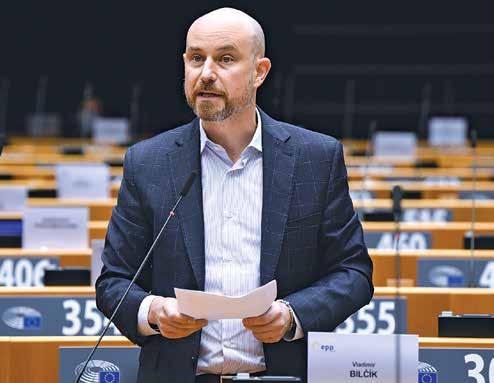
ary. What do you consider as being the key challenges in those areas?
I think they are the same as we have mentioned, and we have highlighted them over the past few years in previous reports. In the area of democracy, there are also number of issues that have been outstanding since the OSCE conclusions of the last 2020 and 2022 elections. There is great room for improvement when it comes to conditions for political competition, for free and fair elections, conditions for a truly independent and free media environment.This is
extremely important for journalists across Serbia to be able to feel safe and secure, and also free to do their job independently of any political or financial influence. There is a long way to go here: in improving institutions of democracy, parliamentary democracy, elections, as well as the standing and position of the media. That’s one aspect that’s been in focus for years now, and will continue to be in focus. I think this is also going to be an important and integral part of our discussions as we engage in the Inter-Party Dialogue with our partners in the Serbian National Assembly. On the judiciary and judicial changes, we note very strongly and welcome that Serbia has adopted some important changes through constitutional amendments, which were also adopted in a referendum. This is an important step forward, but what now needs to happen is fully-fledged work on these reforms, and their subsequent delivery and implementation. A lot of expert work has been done, consultations have taken place, including with the Venice Commission, following some positive opinions. It’s good news that Serbia has a working government committed to continuing the EU path, and that commitment also includes important reforms in the area of justice and the rule of law. I hope that this can provide good impetus to deliver on these this year, because much work has already been done on the basis of constitutional amendments. However, work now needs to be translated into specific institutional changes, and this is something we will both encourage and monitor closely.
12 February Interview Exclusive
There is great room for improvement when it comes to conditions for political competition, for free and fair elections, conditions for a truly independent and free media environment. This is extremely important for journalists across Serbia to be able to feel safe and secure, and also free to do their job independently of any political or financial influence

Double Standards Are Counterproductive
Cyprus maintains its principled position regarding the preservation of the Republic of Serbia’s sovereignty and territorial integrity, and this applies with regard to non-recognition of the unilaterally declared independence of Kosovo ~
As he prepares to conclude his tenure as ambassador in Belgrade, Demetrios Theophylactou tells CorD Magazine that he considers his service in Serbia as the best post in his nearly 30-year diplomatic career! “I did serve on four continents, acquiring rich and diverse

experiences, yet Serbia was closer to my heart: culturally, religiously, emotionally…” Cyprus and Serbia are linked by a strong friendship and understanding when it comes to issues of vital national interests, but also by a shared desire to strengthen their cooperation in the face of today’s challenges. As the ambassador explains,
this means strengthening economic cooperation and developing shared responses to issues like migrant flows or environmental challenges.
Your Excellency, given that your term in Serbia is coming to an end, how would you summarise your time in our country?
14 February
Demetrios Theophylactou
H.E. DEMETRIOS THEOPHYLACTOU AMBASSADOR OF CYPRUS TO SERBIA
Interview
CREDIBILITY
In order to be credible, we must maintain our positions of principle and our full compliance with international legal order, in a consistent and non-discriminatory manner
Though my term in Serbia is only two-and-a-half years, simply because I will be retiring on 1st June, I have done my best to achieve concrete resultsmainly because I consider this as the best post in my nearly 30-year diplomatic career. I have served on four continents, acquiring rich and diverse experiences, yet Serbia was closer to my heart: culturally, religiously, emotionally - certainly also in terms of thoroughly and systematically strengthening bilateral relations in all sectors, primarily in defence and security, but equally so in terms of academic and scientific cooperation, innovation and renewable energy, sports and culture. Our views on issues of vital national interest are aligned. Moreover, I have worked as consistently as possible in order to promote, along with other EU colleagues, Serbia’s accession path to the European Union. We believe that Serbia’s future lies in the EU. In this regard, working together to promote the rule of law and facilitate the reform process was worth the effort. All in all, I thoroughly enjoyed my term in Serbia and will maintain close ties with the country and its people, well beyond my retirement.
Since first arriving in Belgrade, you’ve repeated that Cyprus will not recognise Kosovo’s unilaterally declared independence. How do you view the situation in Kosovo today; do you share concerns over the possible escalation of the conflict?
Cyprus maintains its principled position regarding the preservation of the sovereignty and territorial integrity of the Republic of Serbia, and this applies with regard to the non-recognition of the unilaterally declared independence of Kosovo. Like other interested parties in the region, most notably the EU, we are quite concerned about the volatile situation in Kosovo and continue to pursue active diplomatic activity with a view to preventing further escalation. That would be detrimental not only to the interested parties and the states of the Western Balkans, which also aspire to become EU members, but also to the European continent as a whole. At a time when Russian aggression in Ukraine is placing undue pressure on our economies, not to
TRADE EXCHANGE
In 2022, the volume of mutual economic and trade exchanges increased by over 30 per cent
mention the whole security system in Europe, we must maintain a sense of unity and purpose by continuing our active engagement with the Serbian Government and other parties to prevent escalation and consolidate peace, as well as solid economic prosperity in Serbia and the region.
PRIORITY
Increasing synergies amongst relevant institutions, but also between the public and private sectors, including with universities and research institutes
behaviour that demonstrates arrogance, that other states – regardless of their size – must be consistent when it comes to the letter and spirit of international law, and must apply it as a “weapon”, so to speak, to defend their national interests and maintain a credible posture in international affairs. Having said that, it by no means implies that we neglect our defence capabilities or the readiness of our armed forces to prevent aggression by other, more hawkish states.
Like many other officials of Cyprus, you have also reiterated that your country won’t amend its stance on non-recognition of Kosovo’s unilaterally declared independence. However, you have mentioned that EU member states are under pressure to change that position. From where does this pressure emanate?
Speaking in one recent interview about the Cypriot position regarding Kosovo’s independence, you stated that “for small countries like Serbia and Cyprus, the only ‘weapon’ is to call on international law”. However, don’t current circumstances around the world demonstrate that international law often falls victim to the interests of great powers?
That was exactly my point: that is, it is precisely because international law is often used and abused by those who consider themselves as more powerful than others, and therefore above the law, reflecting
Our stance concerning the non-recognition of Kosovo is firm. This is well known, for obvious reasons. In order to be credible, we must maintain our positions of principle and our full compliance with international legal order, in a consistent and non-discriminatory manner. We should not apply double standards, because that’s counterproductive. At the same time, in line with EU policies, we support the dialogue between Belgrade and Priština, as well as the full implementation of the Brussels Agreement. I cannot speak for others, but no one is applying pressure on us because they know very well that our position is solid. As I said just recently, we should not succumb to political pressure from anyone. Nor should we function arbitrarily and without prior consultation, either with EU partners or other like-minded states.
How does Cyprus view Kosovo’s EU accession request?
Just like Kosovo, Cyprus is also a victim of aggression and invasion, in violation of international law. There are numerous UN Resolutions condemning the invasion and occupation of the northern part of Cyprus, as it is the case of UN Resolution 1244 that applies to Kosovo. In this context, provided that Kosovo is not recognised by a large number
15 February
By Ljubica Gojgić
The international law is often used and abused by those who consider themselves as more powerful than others, and therefore above the law, reflecting behaviour that demonstrates arrogance, that other states – regardless of their size –must be consistent when it comes to the letter and spirit of international law, and must apply it as a “weapon”, so to speak, to defend their national interests and maintain a credible posture in international affairs
of UN Member States, and given that five EU Member States do not recognise this entity either, it is a logical extension that the EU cannot have a unified policy on the issue. Kosovo’s accession request is therefore not an option.
The authorities in Priština are hopeful that Kosovo will soon succeed in becoming a member of the Council of Europe. What will be the Cypriot position?
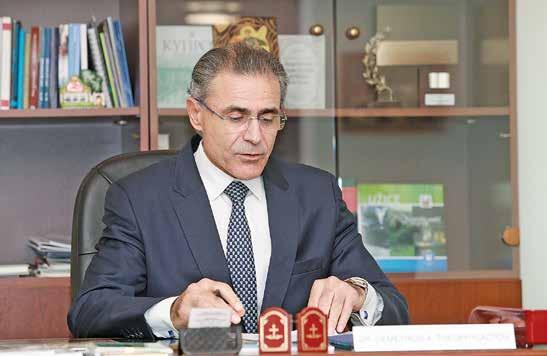
The positions that I have stated already are more than clear and apply to this issue as well. It is not up to the authorities in Priština to decide that, but rather the states of the Council of Europe. It is well known that any application of the sort would be premature, and thus unsuccessful.
Turkish President Erdoğan recently stated that international lobbying to support the independence of Kosovo should serve as the model for a similar campaign to be initiated by the northern part of Cyprus, which has been under Turkish occupation for almost 50 years. How do you see that statement?
It is widely known that the Turkish President applies a policy not only of double standards but, indeed, of multiple standards; in short, as it suits him. The contradictions in this policy are obvious. As such, its inconsistent application lacks credibility. Ankara has been behind ‘international lobbying’ in support of the
so-called independence of Kosovo from day one. Nonetheless, much like the unilateral declaration of independence is illegal, both in occupied Cyprus and Kosovo, as per relevant UN Resolutions, the legal basis differs. Subsequently, one cannot serve as a model for the other. Moreover, in the case of Cyprus, Turkey aims to impose a permanent division, instead of unification, through a two-state solution, in contradiction of relevant UN Security Council Resolutions.
There are plenty of media articles that refer to military cooperation between Cy-
prus and Serbia. What forms the basis of that cooperation and what are its key aspects? There is nothing to hide regarding our military cooperation with Belgrade. As a militarily neutral country, Serbia has been a traditional partner of Cyprus in terms of military cooperation, which dates back to the 1970s, during the time of the former Yugoslavia, and continues to date with the supply of small arms, firearms, rocket launchers, ammunition and spare parts. Most recently, Cyprus acquired the new edition of the Nora Alexander TGS from Serbia. The supply of this weapons system is part of the multiannual plan for the upgrading and modernisation of Cyprus’s defence capabilities. Moreover, several activities and joint training exercises are being carried out in the framework of our annual bilateral military cooperation programme. Cyprus also participates in the EU Battle Group (HELBROC), together with Serbia and Greece, as a Framework Nation.
Could you tell us something about current activities unfolding within the scope of the Cyprus, Greece and Serbia trilateral framework?
We see trilateral cooperation mechanisms as a way to further strengthen the bonds of friendship amongst countries and, mainly, creating a platform for practical collaboration in various sectors of mutual interest. This format of enhanced cooperation has its own added value. The aim is to create a positive agenda, in the interest of participating nations. The ultimate objective is to promote stability and prosperity. Trilateral cooperation also offers participating states the opportunity to exchange views on current developments, on a regular basis, and assess challenges, for instance, on security and economic matters, as well as environmental issues and migratory flows, amongst others.
Trilateral cooperation between Serbia, Greece and Cyprus was launched two years ago, and therefore needs time to achieve more tangible results. Needless to say, this trilateral cooperation applies to all sectors, some of which have the potential to unfold into a regional strategic partnership. For example, in the context of energy policy, Cyprus and Greece have actively promoted trilateral and quadrilateral cooperation with countries such as Israel and Egypt. Moreover, in the framework of regional cooperation, the East Mediterranean Gas Forum (EMGF) was founded by seven countries of the region. The founding members are Egypt,
16 February
Interview
Provided that Kosovo is not recognised by a large number of UN Member States, and given that five EU Member States do not recognise this entity either, it is a logical extension that the EU cannot have a unified policy on the issue. Kosovo’s accession request is therefore not an option
Cyprus, Greece, Israel, Italy, Jordan and Palestine, while France joined in 2021. The Forum enjoys the full support of both the European Union and the United States. It is a platform for structured dialogue on technical and trade cooperation between import, export and transit countries to the natural gas pathway.
Subsequently, expanding this energy-based cooperation beyond the Eastern Mediterranean and interconnecting the European continent via the Western Balkans, for instance, provides opportunities for countries like Serbia to serve as a transit point. This enhances the geostrategic position of Cyprus and Greece in the region by contributing to EU’s security of supply and diversification of routes. Likewise, it could enhance the regional strategic position of Serbia, as well as other states – both EU Member States – like Bulgaria – and candidate states – like North Macedonia. This type of trilateral-plus cooperation will allow gas from the Eastern Mediterranean to be transferred to European countries and contribute to the European Union’s security of supply and diversification of sources and routes.
Along these lines, trilateral Serbia – Greece – Cyprus cooperation can unfold in the context of EU security policies, including EU Peacekeeping Operations.
When it comes to bilateral relations between Cyprus and Serbia, you mention historical mutual understanding and cooperation, but you also suggest that it points to the need to constantly move forward in the modern world. During your time in Serbia, have you succeeded in advancing economic cooperation between the two countries?
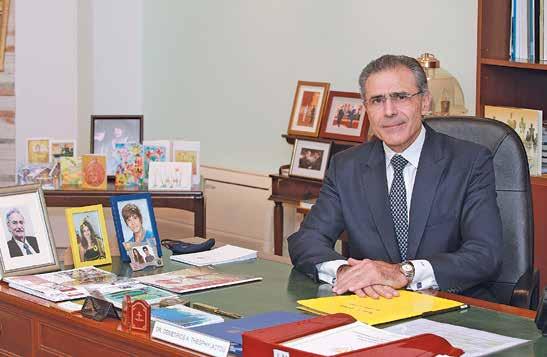
Bilateral relations are premised on strong historical ties and shared values, yet in our days they can grow even further precisely because the focus is on more strategic sectors, such as energy efficiency and related technologies, research and innovation – as is the case, for example, in the context of climate change. In 2022, the volume of economic and trade exchanges increased by over 30 per cent. One of my priorities when I assumed this post in 2020 was to increase synergies amongst relevant institutions, but also between the public and private sectors, including with universities and research institutes.The ultimate objective is to promote subsequent applications, as a result of more focused scientific collaboration, generating economic activities. This takes time to yield results; yet the ambition and potential is there.
Moreover, we are in the process of setting strong foundations for cooperation in the fields of education and science, as well as modern agriculture, including agrotourism, with joint environmental protection projects. For instance, our Ministry of Agriculture, Rural Development and Environment is engaged in joint activities with AP Vojvodina. Some of these activities can also take place in the context of, and benefiting from, EU-related programmes and funding schemes, which benefit membership candidate countries and allow for synergies with EU member states. In addition, joint efforts to strengthen cooperation in key sectors like defence and security, education and science, sports and culture, including youth exchanges, can all contribute to enhancing broader bilateral economic cooperation. We can further
promote business activities with a more active collaboration between the two chambers of commerce. I am keen to pursue my mission until the end of my tenure, by pushing relevant ministries and institutions to enhance collaboration, because I believe that all the extra effort is worth it.
Tourism seems to be the area that most clearly shows the results of strengthening cooperation between the two countries. With the exception of tourism, what else can serve to connect Cyprus and Serbia today? The Cyprus Embassy in Belgrade has pursued an active promotion of tourism and tourist exchanges. Several events have taken place over the last two years, even during the difficult period of the COVID-19 pandemic. That effort proved quite successful. As a result, we are glad to see a steady increase in the number of visitors from Serbia to Cyprus, for instance, with direct flights continuing on a regular basis. Tourist exchanges can certainly increase, with more scope and attention to special interest tourism, i.e., in business, medical, scientific, educational, sports, cultural and religious tourism. Connecting our peoples and institutions is best exemplified, in my view, in enhanced cooperation between universities, where synergies – at the academic and research level – do achieve excellence, while at the same time facilitating valuable youth exchanges.
17 February
In the case of Cyprus, Turkey aims to impose a permanent division, instead of unification, through a two-state solution, in contradiction of relevant UN Security Council Resolutions
GLOBAL DIARY
THUNBERG ACCUSES ENERGY COMPANIES OF THROWING PEOPLE ‘UNDER THE BUS’ AT DAVOS 2023
Greta Thunberg called on the global energy industry and its financiers to end all fossil fuel investments at a high-profile meeting in Davos with the head of the International

MACHU PICCHU CLOSED INDEFINITELY

Peru has indefinitely closed its famous tourist site Machu Picchu over the ongoing protests against the country’s new president. The government said it closed the site, and the Inca trail hike leading up to it, to protect tourists and citizens. Hundreds of people who were stuck for hours at the foot of the 15th Century Inca citadel have now been rescued. The violent protests, which have seen dozens of people killed, began when Peru’s previous leader was ousted. Rail services to Machu Picchu were suspended after some train tracks were damaged, allegedly by protesters. It left 418 people stranded at the site, tourism minister Luis Fernando Helguero said during a press conference. However, the tourism ministry later announced that everyone - 148 foreigners and 270 Peruvians - had been safely evacuated on trains and buses.
PREDICTION
“The world’s leading economists spent most of 2022 convincing themselves that if the global economy was not already in a recession, it was about to fall into one. But with the year’s end, the global slump has been postponed to 2023”
~ JEFFREY
FRANKEL, PROFESSOR OF CAPITAL FORMATION AND GROWTH AT HARVARD UNIVERSITY

NEW ZEALAND PRIME MINISTER ANNOUNCES SHOCK RESIGNATION
New Zealand prime minister Jacinda Ardern has sent a jolt around the world by announcing she will not seek re-election. The Labour Party premier said in an emotional and tearful address that she planned to stand down next month, saying she was too tired to seek a third term. “I no longer have enough in the tank,” said the 42-year-old, who had secured a reputation internationally for a no-nonsense approach to politics and leading her country. Ardern became the world’s youngest female head of government when she was elected prime minister in 2017, aged 37, and said she had taken time last summer to ponder her future.
Energy Agency (IEA). During a round-table discussion with Fatih Birol on the sidelines of the World Economic Forum (WEF) annual meeting, activists said they had presented a “cease and desist” letter to CEOs calling for a stop to new oil, gas and coal extraction. “As long as they can get away with it, they will continue to invest in fossil fuels; they will continue to throw people under the bus,” Thunberg warned.
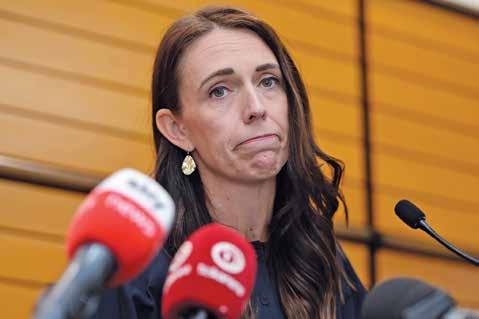
18 February
STRATEGY
“During the Great Recession of 2008-09, the G20 arguably helped to prevent a worse crisis by persuading the world’s biggest economies to coordinate their fiscal and monetary policies” ~ KAUSHIK
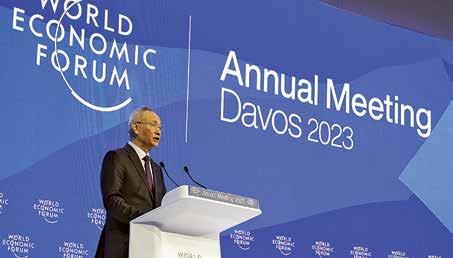
 BASU, FORMER CHIEF ECONOMIST OF THE WORLD BANK AND CHIEF ECONOMIC ADVISOR TO THE GOVERNMENT OF INDIA
BASU, FORMER CHIEF ECONOMIST OF THE WORLD BANK AND CHIEF ECONOMIC ADVISOR TO THE GOVERNMENT OF INDIA
NOVAK DJOKOVIC WINS HIS 10TH AUSTRALIAN TITLE

After missing last year’s tournament when he was deported from Australia for being unvaccinated for Covid-19, Novak made a triumphant return to Australia to beat Stefanos Tsitsipas in finals with a straight sets, winning his 10th Australian Open title. Novak also won a record-tying 22nd grand-slam title, and claimed his 66th ‘Big Title’, which encompasses trophies at Grand Slam championships, the Nitto ATP Finals, ATP Masters 1000 tournaments and Olympic singles gold medals. He is seven ‘Big Titles’ clear of his biggest rivals. Nadal owns 59 of them and Federer 54.
SCHOLZ AND MACRON CELEBRATE 60 YEARS OF THE ELYSEE TREATY
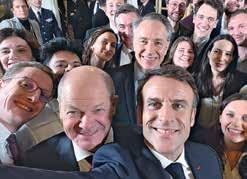
German Chancellor Olaf Scholz met with his French counterpart, Emmanuel Macron, in Paris to mark 60 years since the signing of the Elysee Treaty. Speaking at the Sorbonne University, Germany’s Scholz said the future of Europe rested on the “driving force” of Paris and Berlin. “The German-French engine
is a machine for compromise - well oiled, but from time to time also loud and marked by hard work,” the German chancellor said. Macron said that Germany and France had “cleared the path to reconciliation” and must “become pioneers to relaunch Europe.” He stressed there was a need to “build a new energy model,” encourage “innovation and the technologies of tomorrow,” and ensure the European Union is “a geopolitical power in its own right, in defence, space and diplomacy.”
CHINA: WE ARE OPEN FOR BUSINESS
Xi Jinping’s top economic advisor has announced that China’s economy will return to normal growth this year, as he sought to reassure global investors that the country was open for business and not retreating from capitalism. Vice Premier Liu He stated that China would welcome foreign investment and prioritise economic growth as the country reopened after three years of strict COVID-19 controls. China’s reopened borders and a renewed focus on boosting the sagging economy have brightened the deals outlook, with bankers starting to field interest in mergers, acquisitions and fundraising involving the world’s second-largest economy.
19 February
Eternal Repetition Or Historical Chance?

Elevated tones in Kosovo and the consolidating of diplomatic initiatives are once again leading us into seemingly very lively dialogue over this conflict that has endured for many years. But are we really asking the right questions about the possibility of peace and sparks of conflict?
Are we on the brink of another war on the borders of the European Union, or is the current sharpening of the dialogue in Kosovo and the intensifying of diplomatic pressure part of the staging that we’ve already grown accustomed to and which has yet to produce tangible peace results? Or are we really closer to a historic breakthrough this time around?
Our interlocutors for this edition of CorD’s Focus feature discuss all the theories being offered publicly regarding this being about a minor rebalancing of internal (Serbian-Kosovo) political powers, to the influence of the Russian factor. They additionally also point to other conflicts in the Western Balkans that could be an even bigger problem than Kosovo.
20 February
Serbia – Kosovo Conflict Focus
BOŠKO JAKŠIĆ JOURNALIST

IS KOSOVO ONCE AGAIN WRITING SERBIAN HISTORY?
IN LESS THAN TWO MONTHS, THE WEST DEPLOYED CONCENTRATED DIPLOMATIC FIRE THAT SUCCEEDED IN BRINGING THE MOST COMPLEX AND ENDURING CONFLICT IN THE WESTERN BALKANS TO ITS FINAL STAGES, IN ORDER TO BRING THE TWO SIDES IN THE KOSOVO CONFLICT TO AN AGREED SOLUTION.
Regardlessof how much they were controlled by their organisers, the series of incidents in Kosovo last December carried the potential of a wider conflict and led to writing about the threat of another war on the borders of the European Union.
Now, at the end of January, such predictions fail to hold water. Belgrade and Priština are on the verge of accepting a European plan that offers – with the strong support of the United States – a platform for the normalisation of relations after at least two decades of conflict that have obstructed the European accession prospects of Serbia and Kosovo and imperilled the Western Balkans.
The plan envisages, in short, that Serbia will stop blocking Kosovo’s entry into international organisations, including the United Nations, and that Kosovo will give up on its request for mutual recognition and, after a decade-long delay, fulfil its obligation to form the Community of Serb Municipalities in the north of Kosovo, which was included in the Brussels agreement.
Since Kosovo unilaterally declared its independence in 2008, Belgrade has refused to acknowledge it and conducts its foreign and domestic policy in line with the slogan “Kosovo is Serbia”. That could now come to a historic turnaround.
SERBIA HAS A CHANCE TO FREE ITSELF OF THE HEAVY BURDEN OF KOSOVO, TO DEVOTE ITSELF MORE DECISIVELY TO THE WEST, AS ITS LONGPROCLAIMED GEOSTRATEGIC COMMITMENT, AND TO DISTANCE ITSELF FROM THE INFLUENCE OF RUSSIA, WHICH HAS BEEN USING KOSOVO AS A KEY LEVER TO EXPAND ITS INFLUENCE OVER SERBIA
Aleksandar Vučić, as the leader of the political stratum opposing the granting of a seat in the UN for Kosovo, said after meeting with the West’s diplomatic quintet that Serbia is ready to consider the concept of the European plan.
President Vučić is defending his implied agreement to de facto accept the independence of Kosovo, without the obligation of establishing diplomatic relations, by noting the possible ramifications of his failure to do so. If Serbia rejects the tabled solution, it could face the freezing of its European integration process and the halting and withdrawal of investments, representing comprehensive measures on the political and economic fronts that would prove extremely damaging to the country.
“There is no progress if we do not cooperate... We would be economically and politically lost,” said Vučić in seeking support to accept the agreement from the very public that has been taught to declare the independence of this “holy Serbian land” a national treason.
The road to sobriety of thought won’t be easy. “It will be difficult,” admits Vučić, “that’s why I’m scared”. It will also be difficult for a country that has been taught for decades to believe that Serbia has no life without Kosovo, but Serbia has a chance to free itself of the heavy burden of Kosovo, to devote itself more decisively to the West, as its long-proclaimed geostrategic commitment, and to distance itself from the influence of Russia, which has been using Kosovo as a key lever to expand its influence over Serbia and which, even during the current war in Ukraine, is not abandoning its intentions to destabilise the Western Balkans.
21 February
DRAGAN ĐUKANOVIĆ
PROFESSOR OF THE UNIVERSITY OF BELGRADE FACULTY OF POLITICAL SCIENCES


WHO’S PLAYING THE KOSOVO CARD?
ANY WORSENING OF THE ALREADY POOR RELATIONS BETWEEN BELGRADE AND PRIŠTINA COULD LEAD TO SOMETHING THAT WOULD FUNDAMENTALLY THREATEN REGIONAL STABILITY AND ENABLE ACTORS NOT FROM THE REGION, PRIMARILY THE RUSSIAN FEDERATION, TO IMPACT ON SHIFTING THE FOCUS OF THE WORLD’S ATTENTION FROM THE WAR IN UKRAINE TO THE WESTERN BALKANS
Unfortunately, the cyclical tensions arising in Kosovo could destabilise the situation across the wider region of the Western Balkans and Southeast Europe. The only sure way to prevent and reduce them is to accelerate the resumption of dialogue on the normalisation process, which started in 2011 and is today clearly confronted by more than one crisis that it has faced. However, any absence of dialogue and any worsening of the already poor relations between Belgrade and Priština could lead to something that would fundamentally threaten regional stability and simultaneously enable the strengthening of other actors not from the region, primarily the Russian Federation, which at this juncture could impact on shifting the focus of the world’s attention from the war in Ukraine to the Western Balkans. Will this situation lead to the further marginalising of Serbia and the Western Balkans? Everything depends on how Serbia positions itself in the context of the dialogue. I think that whether or not there will be marginalisa-
THE EU UNFORTUNATELY HASN’T OFFERED ADEQUATE OR TIMELY RESPONSES TO CONFLICTS IN THE WESTERN BALKANS. I THINK WE SHOULD NONETHELESS EXPECT THE U.S. TO PROMOTE THE DIALOGUE BETWEEN BELGRADE AND PRIŠTINA, DIRECTLY AND INDIRECTLY I.E., TO SOMEHOW EASE THESE DECIDEDLY COMPLEX RELATIONS
tion depends on the dialogue linked to the Franco-German plan to regulate relations between Belgrade and Priština, which recently also received the support of the U.S. Thus, Serbia’s position will depend on the response to that initiative, and we should also consider the extremely complex situation linked to Serbia’s non-compliance with the respective measures against the Russian Federation being implemented by the EU.
It would be good if the EU redefined itself regarding the Western Balkans, but this is unlikely given that it didn’t offer adequate or timely responses when other crises involving the Western Balkans arose. I think we should nonetheless expect the U.S. to promote the dialogue between Belgrade and Priština, directly and indirectly i.e., to somehow ease these decidedly complex relations.
DRAGIŠA MIJAČIĆ
DIRECTOR OF THE INSTITUTE FOR TERRITORIAL ECONOMIC DEVELOPMENT (INTER) AND COORDINATOR OF THE WORKING GROUP OF THE NCEU
A SOLUTION MUST BE FOUND AT THE NEGOTIATING TABLE
PUBLIC SUPPORT FOR SOME NEW AGREEMENT IS LOW, WHETHER THAT’S IN SERBIA OR KOSOVO. HOWEVER, THE ALTERNATIVE TO THIS WOULD PROVE RUINOUS FOR BOTH SERBS AND ALBANIANS
Disturbing news about incidents with overtones of ethnicallymotivated violence against members of the Serbian community has long been coming from Kosovo. The number of incidents increased sharply with the arrival of Albin Kurti at the helm of the Government of Kosovo, with his administration making series of unilateral moves that violated the institutional mechanisms for the peaceful integration of Serbs in municipalities in the north of Kosovo that proved difficult to create in the first place. Moreover, the nationalist narratives of political leaders from Priština, but also from Belgrade, that are accompanied by sensationalist and provocative headlines in tabloids and obscure media outlets, only serve to further contribute to inter-ethnic intolerance in mixed communities across Kosovo.
Also challenging the preservation of peace is the construction of fortifications and the fortifying of the existing facilities of the special police forces of Kosovo in the Serb-dominated areas of northern municipalities. The presence of these forces contravenes the provisions of the Brussels Agreement, because their arrival was not approved by the mayors of the northern municipalities. Additionally, we have repeatedly heard public remarks about the arrogant conduct of members of the special forces towards the local population, which caused further unrest among citizens. The situation has been further complicated by the withdrawal from Kosovo’s institutions of Serbs based in the north – primarily from local governments, the police and the judiciary, which created security and institutional issues. Not long after abandoning these institutions, the local population blocked the main roads in the north of Kosovo, which has brought the situation to the brink of conflict. In response to these events, combat readiness has been raised in Serbia, and the atmosphere has been aggravated further by inappropriate media reports and heightened rhetoric from officials in both Belgrade and Priština. It seemed at one point that a conflict between local Serbs and special police forces was inevitable, and that it was only a matter of time until the Serbian army entered Kosovo.
Regardless of the dramatic situation in the north of Kosovo, security is ensured by the presence and activities of KFOR and EULEX, which have played a significant role in easing tensions at critical junctures. It is also important to note the zero tolerance
22 February
Serbia – Kosovo Conflict Focus
of Western diplomacy towards any form of violence against members of international forces. Under such circumstances, the possibility of major conflicts erupting is reduced to a minimum, though the potential of conflict arising from various forms of provocation between special police forces and the local population have not been fully avoided.
The most recent crisis in Kosovo once again showed unequivocally that there is no military or force-based solution to the security and political challenges, but rather a solution must be found at the negotiating table. We are witnessing a significant degree of involvement among high-level diplomats of the most important countries of the West, who are trying to help officials in Belgrade and Priština find a solution to the historical problem between Serbia and Kosovo. Their efforts continue to be met with resistance
THE MOST RECENT CRISIS IN KOSOVO ONCE AGAIN SHOWED UNEQUIVOCALLY THAT THERE IS NO MILITARY OR FORCE-BASED SOLUTION TO THE SECURITY AND POLITICAL CHALLENGES, BUT RATHER A SOLUTION MUST BE FOUND AT THE NEGOTIATING TABLE
against the reaching of agreement, primarily on the part of Albin Kurti, who built his political career on opposing any agreement with Serbia, but also among many political structures in Belgrade. Public support for some new agreement is low, whether that’s in Serbia or Kosovo. However, Western diplomats conveyed a clear message during their recent visits to Priština and Belgrade: that an agreement on the normalisation of relations between Serbia and Kosovo must be signed. The alternative would be ruinous for both Serbs and Albanians. Upcoming events will show the degree of maturity and seriousness of the political elites in Belgrade and Priština to respond to the challenges in resolving this issue, which will determine whether the Serbian and Albanian people will move in the direction of a promising future or mutual conflicts.
ALEKSANDAR RADIĆ
MILITARY ANALYST

BiH HAUNTED BY POSTPONED HIGH-LEVEL CONFLICT
SERBIA ACCEPTS THE POLITICAL REALITY AND NEGOTIATIONS ON THE STATUS OF KOSOVO, BUT THOSE IN POWER IN SERBIA SIMULTANEOUSLY WANT THE IMAGE OF BEING POWERFUL AND DANGEROUS, WHICH IS ESSENTIAL FOR THEM TO AVOID A LOSS OF CONFIDENCE IN THEIR REAL CAPACITY. AT THE SAME TIME, THE FAR MORE COMPLEX ISSUE OF BOSNIA-HERZEGOVINA IS IGNORED
Thedramatic tones linked to Kosovo are primarily an issue of propaganda and the internal political needs of the authorities in Belgrade, and they create the image that they are ready to do whatever is required, including the use of force, to protect national interests. At the same time, we have their counterparts in Priština, who also need to project an image of being determined patriots.
The Kosovo issue is a medium of daily political propaganda, which is precisely why it is important to note that showing 155mm self-propelled howitzers near the administrative line is a media pose. When it comes to our side, the Serbian side, I support the show of force provided it is a tool of foreign policy at a specific juncture. Showing force is not a taboo topic, but that is not to be abused in the media for the needs of domestic politics.
If we observe the bigger picture, we see that there is communication between the Serbian authorities and the Serbian Army with KFOR, with KFOR presenting itself and accepting its role as the only relevant interlocutor when it comes to the security of Kosovo, which is of course reassuring and indicates that it is acting responsibly and that there are no indications of the situation becoming radicalised. On the flip side, strong pressure is being exerted on domestic public opinion with images intended to show that the army and the police are just a step away from war.
Of course, this is presumably because it is politically correct for the public promotion of people from the non-governmental sector, then to a number of our fellow analysts and journalists, to insist on Russian pressure, on the Russian factor. That is valid, but it is by no means as radical as our Balkan problems actually being our problems. We have inherited hatred and unresolved conflicts from the past.
Unlike Kosovo, elements of unfavourable assessments exist in Bosnia-Herzegovina. The wars of the 1990s were actually stopped through truces, provisional solutions, none of which are stable. And here B-H is seen as the main problem. In NATO over the last few months, whenever the war in Ukraine is mentioned, the next sentence makes mention of the situation in the Balkans, but with the focus on Bosnia-Herzegovina. That’s because the peace of the Dayton Accords left sharp national divisions, and a state that never became functional. And there one can see a postponed conflict at a high level, in contrast to the situation regarding Kosovo, where day-to-day politics mainly dominates. Of course, here we must add the caveat that the possibility always exists that control of the situation could be lost in this dangerous game being played.
A large section of our public is convinced that foreigners create wars; that a foreign factor is in control, and until 1991 it was neglect that was one of the catalysts for the radical development of the situation. Back in 2014, when the crisis in relations between Moscow and Kiev, or between Moscow and the West, began with Crimea and the Donbass, then German Chancellor Angela Merkel noted that she wouldn’t want problems to arise in the Balkans in the shadow of that conflict. I believe that today the EU, U.S. and NATO perceive the Western Balkans as a potential area of high security risk, particularly in the shadow of the war in Ukraine, and that they perceive it as risky precisely when pressure is lacking. I am nevertheless convinced that the real risk of armed conflict between Serbia and the Albanian authorities and their formations isn’t high.
23 February
Growth Platform
Last year marked three decades since the signing of the North American Free Trade Agreement (NAFTA), which – observed on the basis of the total GDP of the three countries involved and measured according to the purchasing power ratio – represents the world’s largest FTA
Trilateral trade in goods between Canada, the U.S and Mexico has tripled, while Canada-Mexico trade has increased eightfold over the course of these 30 years, during which there was a sincere belief that progress for nearly 500 million people could only be achieved by working together.
NAFTA is the North American Free Trade Agreement between Canada, Mexico and the U.S., which was signed in 1992 and came into force on 1st January, 1994. NAFTA was built on the foundations of the pre-existing
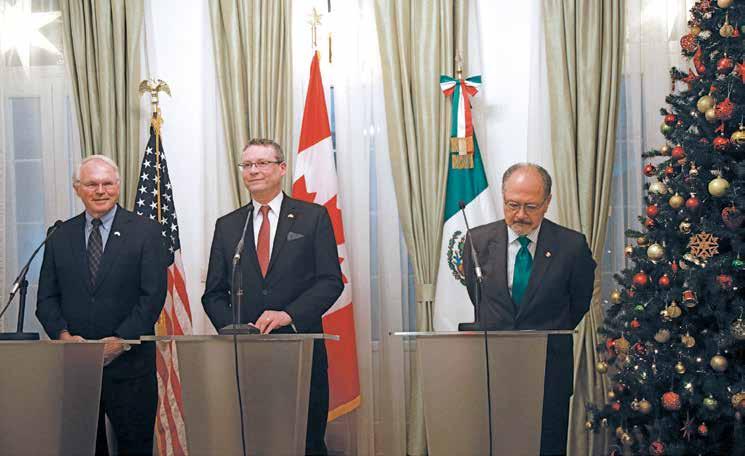
Canada–United States Free Trade Agreement (CUSFTA), which came into force in 1989. The introduction of NAFTA created the world’s largest free trade zone. Tariffs were immediately eliminated or reduced on the majority of goods included in the agreement, which resulted in economic growth and the creation of jobs for members of the middleclass across North America. It paved the way for unprecedented economic integration between the three partner countries, creating a platform for companies from Canada, the U.S. and Mexico to collaborate, produce and
perform together, instead of merely selling goods to one another, as they had previously. NAFTA was utilised by North American businesses to increase their export opportunities, as it provided them with lower tariffs, more predictable operations, clearer rules and reduced technical barriers to trade. In parallel with increased exports and imports, companies from the three countries also became more specialised and thus more competitive, which enabled them to produce together and perform together in addressing customers both within and beyond the NAFTA region.
24 February
Feature
30 Years of NAFTA
H. E. MR. CHRISTOPHER R. HILL, US AMBASSADOR, H.E. MR. GILES NORMAN, AMBASSADOR OF CANADA, AND H.E. MR. CARLOS FÉLIX CORONA, AMBASSADOR OF MEXICO
ANNIVERSARY ALSO COMMEMORATED IN BELGRADE
The Embassy of Canada in Belgrade commemorated the 30th anniversary of the signing of NAFTA, which – observed in terms of the total GDP of the three countries and measured according to the purchasing power ratio – is the world’s largest free trade agreement. “The commemorating of 30 years since the signing of NAFTA testifies to our shared belief that trade agreements represent a cohesive factor in connecting peoples, countries and continents. Trade ties between Canada, Mexico and the U.S. are strong. Since 1993, trilateral trade in goods between Canada, Mexico and the U.S. has more than tripled, which has enabled our companies to create new jobs, but also to engage in innovations and grow together. Economies need to develop and grow. Our trade agreements also continue to evolve, and now include improved environmental and labour standards, as well as the better regulation of digital trade and small enterprises. It was in this way that NAFTA developed into the new USMCA agreement in 2020,” reads the Canadian Embassy’s statement. “With the exchange of goods and investments, social ties between our three countries have also developed significantly. Exchanges in the spheres of culture and the arts in various forms, including gastronomy and tradition, academic exchanges, sports and student mobility, are growing continuously between our three countries, adding a social and human component to trade and investment exchanges. One clear example of this social dimension of the NAFTA agreement is the co-hosting of the next FIFA World Cup in Canada, Mexico and the United States in 2026. We hope that the experience of North America can serve as an example for other regional free trade agreements around the world, including in the Western Balkans,” the statement noted.
TRILATERAL TRADE HAS TRIPLED
NAFTA established the world’s largest free trade region and has since led to the renewing of the foundations of trilateral cooperation. Since the day the agreement was signed, there has been no disputing of the fact that these three nations may have cultural, historical or
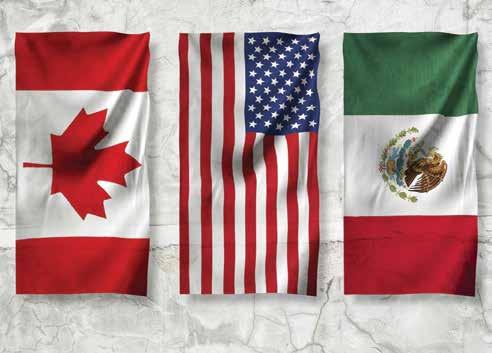
ethnic differences, but they have never lost sight of the fact that they can only ensure progress for their almost 500 million people by working together. NAFTA symbolised the joint commitment of these three nations and the shared belief that cooperation and the reducing of barriers, particularly in the area of trade, have a multiplier effect that leads to improved cooperation in culture, politics and other areas, as well as mutual ties.
Thanks to this free trade agreement, the almost half a billion people who call North America home have gained opportunities to find good-paying jobs. By utilising NAFTA as a platform, the governments of the three countries have not only supported trade, but also investment, research, development and cooperation between businesses and individu-
als. By helping them at the regional level, the NAFTA agreement also helped them succeed on the international front.
Over the course of the previous three decades, trilateral trade in goods between Canada, the U.S and Mexico has tripled, while Canada-Mexico trade has increased eightfold. NAFTA, and now also CUSMA, have supported the development of an integrated and competitive North American market, providing a predictable and secure commercial environment for manufacturers, farmers, companies and consumers. It thus came as no surprise to anyone that trilateral trade reached a value of almost a trillion U.S. dollars in 2016, representing a more than threefold increase compared to 1993.
The North American Free Trade Agreement has 22 chapters, divided into eight parts, and 10 annexes, including special chapters, and is accompanied by two side agreements: the North American Agreement on Labour Cooperation (NAALC) and the North American Agreement on Environmental Cooperation (NAAEC). These two side agreements aimed to establish high common standards on workplace safety, labour rights and environmental protection, in order to prevent the relocating of companies to other countries with lower wages and less stringent regulations.
25 February
the experience of North America can serve as an example for other regional free trade agreements around the world, including in the Western Balkans
Feature 30 Years of NAFTA
American trade bloc cannot be overlooked. Proximity still counts, as does the common language and business culture in the case of the U.S.
“THREE AMIGOS” SUMMIT IN IN MEXICO CITY
In order to strengthen cooperation, representatives of Canada, the U.S. and Mexico participated in the ‘Three Amigos’ summit in Mexico City at the beginning of January this year. This three-day summit of North American leaders included events that brought together diplomats, government officials and privatesector emissaries from across the continent. Canadian Prime Minister Justin Trudeau acknowledged how close the continent came to losing NAFTA in 2019, with the free trade agreement replaced during the Donald Trump era with the U.S.-Mexico-Canada Agreement, or USMCA, which came into effect in 2020. “We’re talking amongst friends now… we almost lost NAFTA,” said Trudeau, as he thanked the group for the various roles that they played in securing the new deal, which is known in Canada as CUSMA.
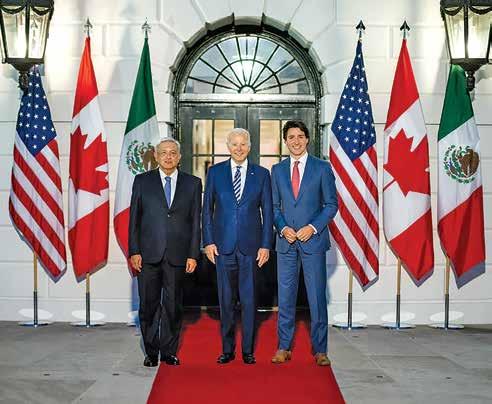
NEW TIMES REQUIRED A NEW AGREEMENT
The Canada-United States-Mexico Agreement (CUSMA) came into force on 1st July, 2020, three years after the launch of negotiations. Talks between the three countries included trade disputes and new tariffs that were used as negotiating tactics. CUSMA is the legal successor to NAFTA and has a different name in each of the three signatory countries. Although it is known as CUSMA in Canada, it is referred to in the U.S. as the United States-Mexico-Canada Agreement, or USMCA, and in Mexico as T-MEC, which is the Spanish version of the agreement’s name. CUSMA and NAFTA are very similar in terms of their general concepts. CUSMA is the successor to NAFTA, but the two agreements nevertheless differ significantly. CUSMA covers 1,500 pages, twice that of NAFTA. The transition from NAFTA to CUSMA once again emphasises that import-export strategies come down to the fine details. This new trade agreement introduces new and revised rules of origin that impact manufacturers and their supply chains, particularly as they relate
to the automotive sector. It is imperative that all importers and exporters review the new agreement and the sections that apply to their specific industry in order to ensure their right to duty-free entry.
CUSMA was born into a world of trade that differs greatly from that of its predecessor. When NAFTA came into effect in the 1990s, importers and exporters had numerous options, but nothing like today. The business world has shrunk, while supply chains have become longer and more complex. CUSMA is now just one of many trade agreements that Canada has signed with partners around the world and is diversifying opportunities for Canadian companies. However, the North
“The last North American gathering at the White House in 2021 produced a list of more than 40 different ‘deliverables’. That is a huge number by most standards, but not surprising for three countries that share borders,” said U.S. Assistant Secretary of State for Western Hemisphere Affairs Brian Nichols, making clear that his country’s unique ties to Canada and Mexico won’t be lost because this is “a family relationship and family conversation”. Scotty Greenwood, CEO of the CanadianAmerican Business Council, is in agreement with Nichols. She suggested: “Let’s view things as a bloc and as a region, and let’s take things on together. I hope it [Canada] embraces it”. There are more than ample reasons for optimism, and the strongest one is based on the fact that the U.S., Canada and Mexico are home to more than 470 million people and that companies from all three countries require strong economies. CUSMA/USMCA will expire in 2036 unless extended in the meantime. All three parties have agreed to review the agreement every six years, in an effort to ensure its continued relevance in trade environment that’s constantly evolving.
26 February
CUSMA is the successor to NAFTA, but the two agreements nevertheless differ significantly. CUSMA covers 1,500 pages, twice that of NAFTA
MEXICAN PRESIDENT LÓPEZ OBRADOR, U.S. PRESIDENT BIDEN, CANADIAN PRIME MINISTER TRUDEAU




 Predrag Milutinović MSc eng. Architect, Founder & Owner, Studio MAPA Architects
Milorad Janković General Manager of Gorski Hotel&Spa, Kopaonik Ski Resort
Black Horse FAS, Sombor
Predrag Milutinović MSc eng. Architect, Founder & Owner, Studio MAPA Architects
Milorad Janković General Manager of Gorski Hotel&Spa, Kopaonik Ski Resort
Black Horse FAS, Sombor
Page /28 Page /32 Page /33 Page /36 The Space Is The Message Every Season Presents A New Challenge Our Vehicle Batteries Will Conquer Europe The Second Green Revolution Will Be Digitized
Agricultural Innovation
The Space Is The Message
One of our most awarded architects, the founder and owner of Studio Mapa, speaks to CorD Magazine about the state of the building industry and profession, about the challenges faced by every designer, every creative person, and about relations with investors.
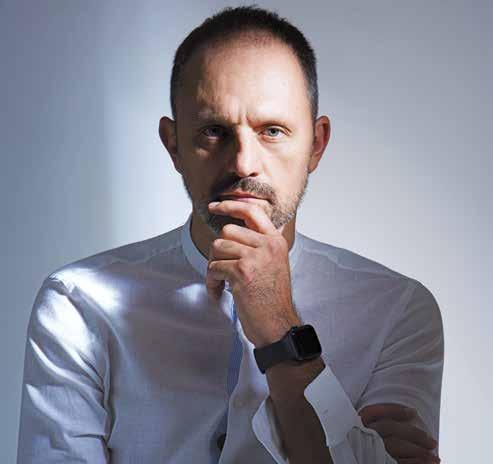
During your successful career, you’ve worked on large commercial business buildings, but also on residential villas and luxury houses. What do you enjoy more?
The job of an architect is demanding and multidisciplinary, you have to have diverse knowledge and look at the programming task from many aspects. When you work on large projects, complexes or public or commercial facilities, the focus is on deadlines, values, resources, evaluation of the relationship of all parameters and the wider urban, architectural and social context, all kinds of influences.
Commercial projects often do not provide a lot of space for trials, analysis or looking back, while private invest -
ment is special, because here emotion is important and somehow comes before everything else. Each villa or house is unique in itself, there is no repetition of either concept or design. Every investor has his own particularities, wishes and expectations, and so does the designer with the challenge of responding to the new task with quality and originality..
Business or private, the important thing is the challenge, the theme and desire to achieve a good architectural response in an environment that provides users with comfort, and consumers with an unencumbered and refined space.
Before opening the MAPA Studio, you were the director of architecture and design management in the development and project management work of Delta Holding. How much does that corporate experience mean to you today?
Through many years of work in the corporation, I have gone through some great exercises. This included efforts to colour all that is corporate and standard with an attitude towards architecture, the building, the project; not necessarily with a personal stamp, but with a shift that can be achieved and recognized at all levels of the development of a project. That experience means a lot to me, because I learned the relationships of the participants in the project, since I was on all sides. Today, it helps me to fully understand interests and expectations,
28 February
The role of an architect is to see things that others do not see, to foresee developments and trends that have an impact on society and his professional work. It must be guided by the public and general interest, because our projects influence the development of the community
PREDRAG MILUTINOVIĆ, MSC ENG.
ARCHITECT, FOUNDER & OWNER, STUDIO MAPA ARCHITECTS
and to properly dose myself emotionally with complete focus on processes.
You try to approach each task with full commitment, unencumbered by previous experience and projects. Is it possible to avoid a client’s influence?
I try to find the right measure, from the relationship to the context, the initial idea, the client’s expectations and all standards. The balance of all aspects and participants in the design is almost the most important for the success of the project. I think that the influence of clients and the desire to participate is the greatest with villas, because they are building their own home. I approach such projects, which have been “cooking” for a long time with the awareness that I should listen to the needs of the investor and channel the idea so that the result is good. This balancing act during the design between us and the client is something one of our investors calls ‘plusing’, as an upgrading of the creative process in the creative industries.
There is building going on all around, there is a lot of business but not enough work force. Does this mean that the situation in the construction industry is better than ever, or that we will be paying for the sin of unplanned urban development?
The state of the construction industry has been excellent in recent years, which is not necessarily related to the quality of what is produced, designed and built. The explosive growth of the industry was made possible by re-industrialisation, the arrival of foreign institutions and opening of investment to all interested parties. The industry itself was not ready for all the challenges, so it allowed some of its workers to leave. Now we import labour, but this has not reduced productivity.
Investors expect a quick return on investment, they want to take advantage of the moment. This certainly means that everyone in the chain must be fast enough, but that speed does not give complete results. There is no time for reflection,
involvement of the wider community and interested parties, so micro-planning often opens up macro-level problems. Restricted by investors’ budgets and earnings, our profession does not have time, nor is it respected enough to take reasonable steps in the general interest, which is often forgotten, and the consequences are not subsequently corrected.
To what extent does the fight against investor urbanism depend on restoring dignity and respect to architecture and architects?
The space is the message! A space once built is an exhausted resource. The role of architects is to see things that others do not see, to foresee developments and trends that have an impact on society. In our professional activities, we must
built surface area, making it expressive at first glance, without time for dedication and innovation, although in recent years the situation has improved, but the architect and architecture are still not in our proper place.
Which of your many projects could you single out as special?
My most important project is a home for developmentally disabled children, an building that was designed with a lot of care and emotion, without the standards that follow modern inclusion, which makes it demanding. With this building, I set new standards in the design of facilities for specialised purposes for people with disabilities. The Mind Office Park gave new freedom in the approach to design, which resulted in a space that excites and moves you, but I am most emotional about villas, which in the modern world are partly eclipsed by multifunctional luxury complexes. I am currently working on a residential project that preoccupies me, and which has had the greatest synthesis in the process with the users, and I am looking forward to its finalisation.
be guided by the principle of the public and general interest. That is why focus and control of any activity in the space is important. Architecture must and should have a theme, an essence, something measurable, not just an expression of the moment or trend. By projecting moves and complexes, we greatly influence the development of the community and the feeling of people in the space, looking equally towards users and consumers.
In the process of the integrated development of investment, the role of architects is multifaceted, as creators and as producers of technical documentation, so we can observe our status from several aspects. Also through our status in society, the status of an artist, the status of a creator... Architecture has long been seen as a service for quick construction for the sake of maximising the
You are one of the best and most awarded architects in Serbia. We assume that you don’t count the accolades anymore, but can you at least list the most significant ones...
The greatest reward is a new opportunity. I am grateful for all the opportunities I have received so far thanks to my dedication and the dedication of my team. I believe that we have made excellent results that will open up new opportunities. The most important awards are those awarded by our professional associations and societies of architects and artists: Grand prix 39. The Architecture Salon, the Museum of Applied Art; Award of the City of Belgrade; the Aleksej Brkić annual award of the Association of Architects of Serbia; the Grand Prix of ULUPUDS, the Aleksandar Šaletić Fund Award; the 54th May exhibition of ULUPUDS; the award of the company Novosti...
29 February
Architecture must and should have a theme, an essence, something measurable, not just an expression of the moment or trend.
“We are particularly proud of the introduction of the e-registration of seasonal workers, thanks to which to date more than 73,000 of them have been effectively included in legal flows” ~
CVETKOVIĆ, PRESIDENT OF THE NALED MANAGING BOARD

SERBIA HAS 500 TONS OF GOLD IN EXISTING AND POTENTIAL DEPOSITS
According to the latest estimates of the Geological Survey of Serbia (GZS), which were made in 2000, Serbia has 250 tons of gold in existing deposits and 150 tons in potential deposits, and after the latest discoveries, such as Čukaru Peki, it can be said that according to a rough estimate, it has reserves of 500 tons in ore, said the deputy director of GZS Predrag Mijatović. As he stated, after processing, the gold in the ore is used to make gold bars or investment gold, which is then placed in the vault of the central bank, as in all countries, and if this rate of exploitation continues, it will take several centuries for all that gold to be processed.

CHILDREN OF KONSTRUKTOR EMPLOYEES FOR TIRŠOVA
Children of the employees of the construction company Konstruktor, small donors with big hearts, on the eve of the new year 2023, painted a hundred works of art - for the sake of other children. All their works were purchased by Konstruktor, and the funds were donated to the needs of the Tiršova Children’s Hospital in Belgrade in the form of modern medical and surgical equipment. This noble and creative action encouraged all children of the employees to do something nice for others, and the management of the Konstruktor company fully supported it financially with a clear ultimate goal - “how many sparks, that many coins” - children paint!
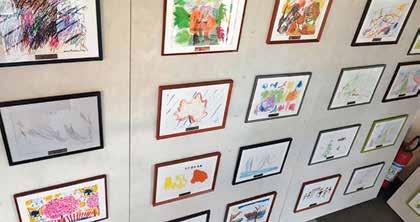
REGIONAL AWARDS FOR SERBIAN EXPERTS
In accordance with the rules of the PRO PR GLOBE Awards, and after the nomination process, a total of 25 renowned experts in the field of public relations from 12 countries on three continents are the winners of the PRO PR GLOBE Awards for 2022. They will be presented with unique statues and works of art by students of the Academy of Applied Arts of the University of Rijeka. The award ceremony will be held as part of a gala dinner on 5th May at the Jezero Hotel on the Plitvice Lakes, where the 20th anniversary PRO PR conference is also being held. The award was won by: Jelena Zlatanović, corporate marketing and communications expert at MOL (Magyar OLaj-és Gázipari Részvénytársaság) and Emilija Lilić, manager of internal communications at Tigar Tires from Serbia. For the full list of winners visit cordmagazine.com

30 April
VLADISLAV
LOCAL NEWS
“By signing the Agreement on the donation of 8.5 million euros from the European Union, an additional step was taken in the process of the Trans-Balkan Corridor for the transmission of electricity” ~ DUBRAVKA

ĐEDOVIĆ, MINISTER OF MINING AND ENERGY OF SERBIA
SERBIAN CHAMBER OF COMMERCE OPENS OFFICE IN DUBAI

The Serbian Chamber of Commerce (PKS) continues to expand its global network in 2023. At the very beginning of the year, the new Representative Office of the Chamber of Commerce of Serbia started working in Dubai, the business centre of the United Arab Emirates. This is PKS’s eighth representative office after Germany, Austria, the Russian Federation, Belgium, Italy, Israel and China. Companies from Serbia, members of the Open Balkans, and the region, which operate or plan to operate on the market of the UAE and other countries of the Persian Gulf, can receive all the necessary information and support for starting and developing businesses in these markets from the PKS Representative Office in Dubai.
APR AND NALED ENABLE ELECTRONIC REGISTRATION IN THE REGISTER OF BIDDERS
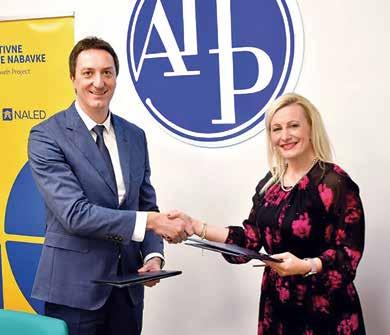
From 1st January, all businessmen will be able to register in the Register of Bidders at the Agency for Business Registers (APR) completely electronically, with significant savings of time and money because they will no longer have to collect all certificates personally from different counters. The registration will make it easier for bidders to participate in tenders, for clients to check the companies with which they would conclude a contract, and for institutions to better analyze the state of the public procurement system and further improve it based on the available data. In this regard, the Agency for Business Registers was presented with a new improved register of bidders, which in 2023 will enable more efficient work and thus, a more positive impact on the economic environment and society.
EBRD LENDS €21.4 MILLION TO SERBIA’S METALFER FOR GREENER STEEL PRODUCTION
The European Bank for Reconstruction and Development (EBRD) has provided a loan of €21.4 million to Metalfer Still Mill d.o.o., Serbia’s leading manufacturer of concrete reinforcement steel. The loan will finance the construction of a new rolling mill for processing scrap metal and semifinished products, which will improve efficiency and reduce emissions, as well as a new rooftop solar photovoltaic (PV) mini-plant, producing up to 4 MW of renewable power to meet production needs.

31 April
Every Season Presents A New Challenge
The Gorski Hotel&Spa team comprises people who have a clear vision and idea. They are pioneers who don’t follow in anyone else’s footsteps. With belief in what they do and the innovations they implement, they waited patiently to be recognised by the market
ing factors – from the changing behaviour and expectations of tourists, to new technological options and opportunities. The specific boundaries that we’ve pushed the most are in the food and beverage segment, which is supported by the accolades and awards we received in the previous period. Apart from those boundaries, we’ve also extended those in the spa and wellness programmes segment, and, finally, we are most proud of our innovations from the segment of programmes intended for children.
We constantly push the boundaries in the food and beverage segment, in our spa and wellness programmes, but we are most proud of our innovations intended for children. We emerge from every season victorious, with satisfied guests who happily return to us multiple times during the year - reveals Gorski Hotel&Spa GM Milorad Janković in this interview.

We know that you have the biggest rooms and the most luxurious suites, the best location, the most modern ski room, great services etc. In which other aspects have you shifted the boundaries of the mountain tourism segment?
The boundaries shift from day to day, with many contribut-
We’ve organised free workshops where our youngest guests spend five days preparing a play with distinguished academic actors, and on the last day they perform the play for their parents and other hotel guests.
What is it that ensures both families and businesspeople, young and old, active holidaymakers, but also those for whom rest and relaxation are the most important elements, are happy to stay with you?
The Gorski Hotel&Spa team comprises people who have a clear vision and idea, so we are mostly pioneers who don’t follow in anyone else’s footprints, but rather – with belief in what we do and the innovations we implement – we waited patiently

for that to be recognised by the market. By using an appropriate marketing mix and other promotional elements, we’ve succeeded in maintaining a position that ensures we enter each new season with plenty of innovations and new packages of services. We emerge victorious, with a successful season behind us and satisfied guests who happily return multiple times during the year. This might sound simple, but is very demanding in practice.
Ever since Kopaonik entered into competition against Europe’s most famous mountain centres, and primarily ski resorts, lots of work has been done to improve the offer. Does that also apply to hoteliers?

There’s really a lot that’s been done to improve the offer of the Kopaonik Ski Resort, and representing the biggest shift in this sense is the construction of the Brzeće - Mali Karaman gondola (cable car). When it comes to hoteliers, constantly improving
the offer represents the ultimate approach if you want to retain the attention of your guests, to avoid boring them and losing them. The hoteliers of Kopaonik certainly set new limits and there’s no longer a question over whether a mountain hotel that aspires to be at the very top of the offer covers all segments in the domain of hotel services – from accommodation to food and drinks, spa and wellness programmes, children’s playrooms, ski equipment rooms and all other entertainment content, generally with a rich music programme. This all existed before too, the only difference being that today each segment is approached with much greater attention to detail and much more is invested in each segment. It is certainly possible to charm a guest who’s visiting for the first time, but the real challenge is to turn them into a regular guest, one who will delight every time at the very thought of booking their stay at your hotel.
32 February
MILORAD JANKOVIĆ, GENERAL MANAGER OF GORSKI HOTEL&SPA, KOPAONIK SKI RESORT
Our Vehicle Batteries Will Conquer Europe
After tumultuous experiences with different investors over several years, Sombor-based Black Horse, Serbia’s only domestic producer of vehicle batteries, finally got back to its feet in 2022 with its new Czech owner, CEZ Industries
Last year will be fondly remembered by vehicle battery maker Black Horse, as it marked the return of the company’s products to the market, which is also confirmed by the words of company director Petar Miljković.
This is the start of a major market comeback and we expect this trend to achieve its full momentum this year. We’ve so far created a service network that will primarily enable us to realise our outlined operational dynamics and to next year try to regain part of the market. And when I say market, I’m referring to that of the Adriatic region, and we’ve also signed more than 40 contracts with local sales representatives - stresses Miljković.
NEW TECHNOLOGY AND NEW JOBS
Everyone at Black Horse achieved great technological advances in 2022 and acquired significant experiences on the market.
“After many years, we achieved positive operations in 2022. The company has stabilised and there are finally financial elements that enable us to launch new investment cycles. Last year was also marked by an increase in the number of employees and the introduction of another shift. We undertook a major overhaul in May and June, which meant production being halted, but productivity is
now two or three times higher than it was before,” reveals Miljković.
OPEN DOORS TO YOUNG EXPERTS
Black Horse places particular importance on its cooperation agreement with the University of Novi Sad Faculty of Technical Sciences,


The company has been stabilised and we finally have the financial elements that allow us to launch new investment cycles
which will enable final year students to acquire knowledge and experience, and to develop as engineers.
“This is a long-term project that relates to final year students who are doing master’s theses in the field of robotics and automation. That project will only achieve its full effects in the years to come. We have already hired certain personnel, and I’m hopeful there will be even more of that in the period ahead.”
PLANNED GROWTH AND EU MARKET PENETRATION
The company’s aim for 2023 is to continue growing sales across the Adriatic region.
“The next important task is to complete the investments now launched during the second half of this year, thereby enabling Black Horse to rub shoulders with Europe’s top manufacturers of vehicle batteries. We started this investment cycle in cooperation with the Development Agency of Serbia, development funds and banks, which will enable us to once again position Black Horse on the top rung of the ladder, as we will strive to be a strong competitor to producers in Eastern Europe,” says Miljković.
TARGETING AN ENVIRONMENTAL PERMIT
One of the challenges in the coming period will be to harmonise production with environmental standards.
“We are awaited by Intensive work on the obtaining an integrated permit, which will be required by law by the end of 2024, i.e., work on all environmental protection projects that relate to air, soil and wastewater pollution. Those three directions are the most important to us, and we will work on all projects to protect the human environment in order to receive an integrated permit by the end of 2024 that will serve as a guarantee that Black Horse operates according to all standards that apply in Serbia,” concludes Miljković.
33 February
SOMBOR
BLACK HORSE FAS,
“The EU continues to be Serbia’s largest donor. The Trans-Balkan Electricity Corridor is connected to our overall efforts to support the energy sector in Serbia. Since 2000, Serbia has received more than 835 million euros for the energy sector alone” ~ EMANUELE GIAUFRET, HEAD OF THE EUROPEAN UNION DELEGATION TO SERBIA

MONTENEGRIN HOTELS & RESTAURANTS THE MOST EXPENSIVE IN THE REGION
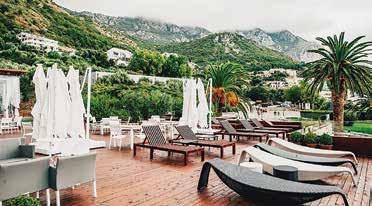
Hotels and restaurants in Montenegro are the most expensive in the region, while Switzerland is the most expensive in Europe, according to data from the European Union statistics agency Eurostat for 2021. As reported by RTCG, Montenegro is the first in terms of the cost of hotels and restaurants, with about 57 per cent more than the European average, followed by Serbia and Bosnia-Herzegovina (55 per cent). Albania and North Macedonia are the cheapest in the region but also among the cheapest in all of Europe, with 46.2 per cent of the European average. According to statistics, Turkey is a country where you can find Europe’s cheapest accommodation and food.
ROAMING BETWEEN WESTERN BALKAN COUNTRIES AND THE EU TO BE ABOLISHED BY YEAR’S END 2023

The agreement on roaming, mobile internet and calls, to be charged the same amount in the Western Balkans and the EU countries, will enter into force by the end of 2023, member of the Croatian Parliament Bojan Glavašević announced on Twitter. The same rule is in force among EU members, and Glavašević added that the idea of abolishing roaming for the countries of the Western Balkans in the EU has existed for a long time, and now it is close to being realized. As he stated, the agreement will include all Western Balkans countries that are in any way in the process of joining the European Union.
ROMANIA LISTED AMONG WORLD’S TOP TRENDING SPA DESTINATIONS FOR 2023
Online booking site SpaSeekers.com used Google search data to analyse which spa destinations around the world are having a surge in interest and found Romania to be a top trending destination. The country ranks in the 16th position, with a +125% increase in searches. The data found Costa Rica to be the number one trending spa destination for 2023, with a vast 62,273% YoY increase in searches globally. Germany is next with a 12,400% increase, followed by Croatia (up 1,019%), Moldova (up 250%), and Cambodia (+191%). Europe features the most in the top 20, with Poland, Slovenia, Bulgaria and Portugal being named as some of the world’s top trending spa destinations.

34 February
REGIONAL NEWS
SLOVENIA’S KOPER PORT REVENUES JUMPED BY ALMOST 40%
In 2022, the Port of Koper, according to incomplete and unaudited data, generated 309.4 million euros in net revenue from sales, which is 38 per cent more than the year before. In total, the Slovenian company announced that they handled 23.2 million tons of cargo, i.e. 12 per cent more than the year before. As the Port of Koper announced on the pages of the Ljubljana Stock Exchange, in 2022, it recorded growth in all product groups, and historical results were achieved in two categories - one million container units and 800,000 cars, reports SeeBiz.
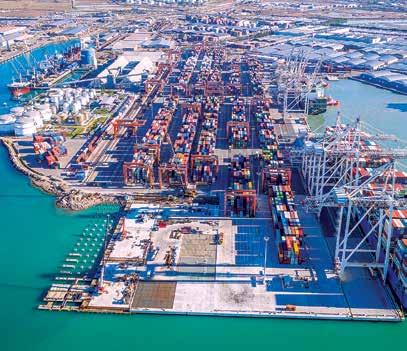
BULGARIA IS THE WORLD’S THIRD BIGGEST IMPORTER OF TURKISH TOMATOES

The leading importer of tomatoes from Turkey in 2022 was Romania, where production was delivered for the amount of 65,228 million dollars. It is followed by Ukraine - 45,320 million dollars, and Bulgaria - 38,113 million dollars. The volume of tomato exports from Turkey in 2022 increased by 4% compared to 2021 - to more than 377 million dollars. These data are quoted by the Anatolian Agency with reference to the Association of Southeast Anatolian Exporters. In 2022, Turkey supplied 526,703 tons of tomatoes to 54 countries, including Romania, Ukraine, Bulgaria, Germany, the United Kingdom, the Czech Republic, Switzerland, Spain, Kazakhstan, Latvia, Russia, Poland and Malaysia. Tomato export volume in price terms in 2022 is $377,418,000 compared to $362,993,000 in 2021.
GERMAN
DONATION AGREEMENT SIGNED FOR THE FOURTH SECTION OF TRANS-BALKAN CORRIDOR
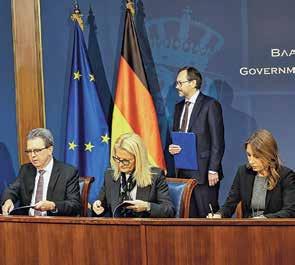
The Minister of Mining and Energy Dubravka Đedović, the Minister for European Integration Tanja Miščević, the director of Elektromreža Srbije Jelena Matejić and the director of the office of the German development bank KfW in Belgrade Rudiger Hartmann signed the Agreement on the donation of 8.5 million euros from the European Union, through the Investment Framework for Western Balkans, which will be used for the fourth section of the Trans-Balkan Corridor. According to Rudiger Hartmann, the Trans-Balkan Corridor will significantly strengthen Southeast Europe’s European energy network and the critical pan-European electricity corridors.

35 February
“Strong community and a European approach based on trust and solidarity are needed in order to achieve energy security and independence together” ~ H.E. ANKE KONRAD,
AMBASSADOR
The Second Green Revolution Will Be Digitized
Six decades after the Green Revolution began, the rise of robotics and artificial intelligence may usher in another agricultural transformation. By enabling farmers to grow more while using fewer resources and generating less waste, these tools could make food more sustainable, accessible, and cheaper to produce
thus allowing farmers to grow more and waste less.
AI-powered programs, like IBM’s Watson, combine data on weather patterns, crop yields, and market prices to advise farmers regarding the best time to plant, the precise amount of fertilizers to use, and when to harvest for peak ripeness. Researchers at Microsoft and Wageningen University in the Netherlands are growing cucumbers with the help of algorithms, combining the efforts of humans and AI to boost yields while using fewer natural resources.
Arming is one of the world’s oldest and most far-reaching endeavors. Meeting the growing food demands of the global population – projected to reach ten billion by 2050 – amid accelerating climate change presents an unprecedented highwire act that requires human ingenuity, good governance, and technology.
The last time the agriculture sector went through a seismic shift like this was when new technologies, such as highyielding wheat and rice seeds, chemical fertilizers, and irrigation technologies, kicked off the Green Revolution in the 1960s. In the following three decades, cereal production in famine-prone Asia doubled, and wheat and rice became cheaper, even though the population increased by 60% during this period.
Unfortunately, the Green Revolution brought with it a host of environmental costs. Lax regulations and generous subsidies made fertilizers and pesticides cheap, and farmers, with no training, used them excessively, leaving soil damaged and waterways polluted. As new crops took over, traditional plant varieties were lost, contributing to biodiversity loss.
The rise of robotics and artificial intelligence might help usher in a second, even greener Green Revolution. Robots are already harvesting crops, weeding, and collecting data to improve soil management. Soon, they will be as common in farm pastures and greenhouses as they are in medical labs or Amazon warehouses. The hope is that AI can help meet food and climate goals by adding more precision to agriculture,
In California, a state that grows irrigated fruits and vegetables at a large scale, such technologies mean real savings in seasonal labor requirements. For example, a $150,000 “grape-gobbling robot” can sort two tons of grapes in 12 minutes, replacing 15 human workers – as well as reducing the use of fertilizers, pesticides, and water, while producing higher yields.
In the past, agricultural automation was characterized by large industrial farms using heavy machinery to boost yields. Mechanization on this scale increased producers’ dependence on fossil fuels and the unbridled use of chemicals. The steep cost also meant that small farmers, especially in poorer countries, lacked access, creating an uneven playing field.
Digital technologies are changing this to benefit both large-scale and small-scale farms. Farmers have taken a page from ride-sharing apps like Uber, using GPS tracking devices and fleet-management software that allows small producers to share assets required for agricultural mechanization. Some companies, like

36 February
AGRICULTURAL INNOVATION
TROTRO Tractor in Ghana and Tun Yat in Myanmar, allow small farmers to share the cost of renting a tractor they could not afford alone.
Digital support can also upgrade traditional mechanization, even if it is not advanced technology. For example, GPS devices that track cattle (“smart collars”) and transmit data about animals’ health and movements can determine the amount of feed to dispense and automate the feeding process, improving productivity.
The great advantage of robotics is its potential for cost-effectiveness, allowing small farmers to compete with their larger counterparts. Like computers and smartphones, these machines, once manufactured in large volumes, should become much less expensive, thus paving the way for wider use.
But robotics and AI-based tools, which favor highly skilled farmers over low-skilled ones, have the potential to deepen existing inequality. They could further alienate the world’s poorest people, especially those who live in rural areas and eke out a living
The hope is that AI can help meet food and climate goals by adding more precision to agriculture, thus allowing farmers to grow more and waste less
on a small plot of land without access to markets or financial services.
To ensure that agricultural automation, from tractors to drones, is inclusive, governments should invest in essential infrastructure, including electricity and broadband connectivity in rural areas. They should also provide training on these digital tools to create a new class of skilled farmers who can operate more advanced technologies – and can create new, high-skill opportunities for rural youth.
To be sure, technology alone will not right the world’s wrongs when it comes to
delivering food more sustainably or making farming more efficient and equitable. Nor can it transform agriculture overnight. From California to Kenya, robotics and AI are still expensive and tend to favor larger farms over smaller ones. Moreover, greater use of robotics could encourage the expansion of monoculture farming systems, as robotic machines require uniformity to function efficiently. That would lead to a loss of genetic diversity.
Robotics and AI in agriculture are still at an early stage of development. Thoughtful policy and rigorous impact assessments of its adoption are required to realize the Second Green Revolution’s full potential.
Robots are not substitutes for human farmers. But in a future with billions of extra mouths to feed, they can make food more sustainable, available, and cheaper to produce. It’s high time to give machines a chance.
 By Maximo Torero, Chief Economist of the Food and Agriculture Organization of the United Nations
By Maximo Torero, Chief Economist of the Food and Agriculture Organization of the United Nations
37 February
“What a year it has been! At The Coca-Cola Company, we activated the FIFA World Cup in 180+ markets around the world, making it a truly global asset.”

GOLD TRADES NEAR 8-MONTH HIGH, ANALYSTS EXPECT CONTINUED RISE
Gold traded near an 8-month high as the precious metal’s strong start to 2023 continued, buoyed by lower yields and a weaker dollar. Spot gold hit $1,881.5 per troy ounce beginning of the second week of January, its highest point since 9 May, before cooling off as U.S. Federal Reserve officials signaled further aggressive monetary policy action to combat inflation.
Last year — a tough one for most asset classes — gold offered an effective hedge for investors, according to precious metals investment firm Sprott. It called the precious metal a “clear macroeconomic winner in relative and absolute terms.”


DISNEY EMPLOYEES MUST RETURN TO THE OFFICE FOUR DAYS A WEEK
Disney CEO Bob Iger told hybrid employees they must return to corporate offices four days a week starting 1 March, according to an email obtained by the US’s CNBC. In the email, Iger stressed the importance of in-person collaboration. Iger’s four-day-per-week stipulation is relatively strict compared with other large companies, which have opted for two or three mandated in-office days for hybrid employees. Disney’s new policy comes less than two months after Iger returned to the helm of the company, promising a two-year stint that would spark renewed growth for the company and develop a successor to take his place.
SWISS CENTRAL BANK POSTS BIGGEST LOSS IN ITS 116-YEAR HISTORY
The Swiss National Bank reported a loss of 132 billion Swiss francs ($143 billion) for the 2022 financial year, citing preliminary figures. It represents the biggest loss in the central bank’s 116-year history and equates to roughly 18% of Switzerland’s projected gross domestic product of 744.5 billion Swiss francs. Its previous record loss was 23 billion francs in 2015. As a result, it will not make its usual payouts to the Swiss government and member states, it said, with payments to its shareholders also set to be affected. In 2021, the bank reported a 26 billion franc profit. Of the losses, 131 billion francs came from its foreign currency positions and 1 billion from its Swiss franc positions amid strong gains made by the franc as investors flocked to the perceived safe haven amid European volatility.

38 February
~ JAN QUIRIJN SCHETTERS, DIRECTOR, GLOBAL SPORTS PARTNERSHIPS & OPERATIONS AT THE COCA-COLA COMPANY
WORLD NEWS
“At Virgin, we look for optimists. We look for people who praise instead of criticise. This is particularly important at a senior leadership level, as an incompatible leader can quickly corrode the company culture, and much more too.”
 BRANSON, CHIEF PURPOSE AND VISION OFFICER AT VIRGIN
BRANSON, CHIEF PURPOSE AND VISION OFFICER AT VIRGIN
EUROPEAN NATURAL GAS PRICES RETURN TO PRE-UKRAINE WAR LEVELS

European natural gas prices fell in the second week of January to levels not seen since before Russia’s invasion of Ukraine. Front-month natural gas futures on the Dutch Title Transfer Facility, the benchmark contract in Europe, plunged in recent weeks to bottom out below 77 euros per megawatt hour, a level not seen since February — prior to the beginning of a full-scale war in Ukraine. At their peak in August, European gas prices topped 345 euros/MWh as Russia’s weaponization of its natural gas exports to the rest of the continent in response to punitive EU sanctions, and sky-high temperatures over the summer, drove up demand while constricting supply. The spiking prices sent household energy bills soaring and have fueled a cost-of-living crisis across much of the continent.
HONOR UNVEILED LATEST TABLET TO COMPETE WITH APPLE
Chinese tech company Honor Device Co Ltd unveiled its latest tablet V8 Pro on Monday night, as it aims to compete with Apple’s iPad in the 2,000 to 3,500 yuan $503 price range. The move is also part of Honor’s broader push to expand its presence in the tech sector amid intensified competition. Zhao Ming, CEO of Honor, said the company has become the No.3 tablet brand in China during the third quarter. Speaking of market competition, Zhao said consumers often get fascinated with Apple’s good product ecology, but in terms of services and understanding of Chinese consumers, domestic brands can do better than Apple adapting to the diversified demands of Chinese business people, students, home audio-visual entertainment needs and other scenes.

ROLLS-ROYCE SEES RECORD SALES IN 2022
Rolls-Royce sold a record number of cars in 2022 as demand for its $500,000 vehicles remained strong, despite recession fears, according to CEO Torsten Muller-Otvos. “We haven’t seen any slowdown or downturn,” Muller-Otvos told CNBC. “We haven’t seen any negative impact.” Rolls-Royce delivered 6,021 cars last year, up 8% over 2021 and the first time the company crossed the 6,000 mark. The British carmaker, which is owned by BMW, doesn’t break out its profits and revenue. But the company said the average price of a Rolls-Royce soared to $534,000 last year — thanks largely to its customization program known as Bespoke.

39 February
~ HOLLY
KENNY DICHTER WHEELS UP FOUNDER, CEO AND COB

Coupling Hard Work & Innovation
Kenny Dichter is today best known as the founder, CEO and chairman of the board of revolutionary membership-based private aviation company Wheels Up – a firm that has eliminated fixed costs and provided unparalleled flexibility since its 2013 launch – but it was way back in 1990, as a then new graduate of the University of Wisconsin [majoring in sociology], that Dichter co-founded his first company: Alphabet City Sports Records.
Focused on creating and selling songs that commonly reverberate around stadiums, arenas and other sports venues, the company was ultimately bought in 1998 by SFX En-
tertainment (now LiveStyle, Inc.) for 4.3 million dollars in cash and stock.
Dichter’s next original move came in 2001, when he founded Marquis Jets, representing the first fractional card jet programme, which served to revitalise and democratise the private aviation industry. With Dichter at the helm, the company grew quickly and by 2007 had achieved an annual turnover of more than $700 million from 3,500 customers. With over $4 billion in revenue generated, Dichter sold Marquis Jets in November 2010 to NetJets, a subsidiary of Warren Buffett’s Berkshire Hathaway, and was named NetJets vice chairman at the time. This new role ena-
bled him to build lasting relationships with CEOs, entrepreneurs, celebrities, athletes and tastemakers worldwide, which would prove vital for his future ventures.
As a natural entrepreneur who has always been known as a trend spotter and trendsetter, with an innate knack for branding, marketing, public relations and advertising, Dichter is a self-proclaimed “man of the people”, whose successes prove that he can apply his skills to a variety of industries.
Kenny is always on the lookout for earlystage businesses that show the potential for hyper growth. He has invested and played an active role in Juice Press, a Manhattan-based,
40 February
Entrepreneur
From simple songs to select skies, Kenny Dichter is an entrepreneur who has tried his hand in numerous sectors and achieved unprecedented success on several fronts
multi-location, grab-and-go organic, raw food and juice company; SportYapper, a global communications platform for talking sports; CYC, the first indoor cycling studio aimed at college students and young professionals at universities across America; and Cirrus, a fitness company that customises premium exercise equipment.
In 2010, together with fellow entrepreneur Ken Austin, Dichter co-founded Tequila Avion, an ultra-premium brand of this famous Mexican spirit that needed just two and a half years of excellent branding and distribution to position itself as an emerging leader in its category. The venture quickly proved so successful that famous Paris-based Pernod Ricard, the world’s second largest company specialising in premium wines and spirits, even purchased a minority stake in Tequila Avion in 2011, taking on worldwide distribution rights.
Dichter also founded (in 2004) MGX Lab, an independent, full-service, digital media, brand strategy and business development company that serves as a think tank for companies like Disney, Bayer, Patch, cambio.com and Muhammad Ali Enterprises, while he is also Founder and Chairman of Tour GCX Partners, Inc., a golf membership programme that provides client entertainment solutions for corporations and individuals, via access to private country clubs.
Thanks to the expertise he acquired during his work with Marquis Jets, NetJets and Wheels Up, Dichter is regularly sought by media outlets for his perspectives on the aviation industry, consumer brands and the luxury goods and services sector.
All these successes might lead one to conclude that Kenny has always lived the high life, but the truth is that his journey has been one of constant hard work and tenacity, coupled with his natural inclination for entrepreneurship. He grew up on Long Island in the 1970s and ‘80s and has worked for almost as long as he can remember. His first job came while he was still in the sixth grade, delivering newspapers by bike
every weekday afternoon and Sunday morning. He subsequently worked in restaurants as a busboy and even launched his own T-shirt business while studying at the University of Wisconsin, expanding to three retail locations by the time he graduated in 1990.
“You need to be gritty to be a successful entrepreneur,” says Kenny. “You have to be willing to just keep moving forward, willing to take advice and, most importantly, you need to be a flexible thinker.”
His greatest business success to date is undoubtedly Wheels Up, which represents the only company in the aviation industry to offer a total private aviation solution that includes world-class safety, service, and flex-
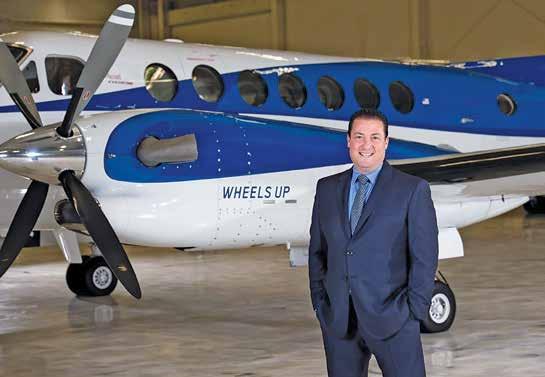
ibility through on-demand flights, membership programmes, corporate solutions, aircraft management, whole aircraft sales and commercial travel benefits, thanks to its strategic partnership with leading U.S. player Delta Air Lines. Wheels Up offers its customers and members access to over 1,500 safety-vetted and verified aircraft. Via the Wheels Up App, anyone can search, book and fly. Wheels Up Connect, Core and Business memberships provide enhancements like flight sharing, empty-leg Hot Flights, Shuttle Flights, Shared Flights, signature Wheels Down events and exclusive member benefits from preeminent lifestyle brands. The company’s ongoing Wheels Up Cares programme aligns with philanthropic organisations and initiatives that are relevant to the company and its customers, members, stakeholders, families and friends. The Wheels Up Cares fleet comprises five custom painted Beechcraft King Air 350i aircraft – with each plane serving as a flying symbol for a specific cause.
Speaking about this unique programme, Kenny explains: “Wheels Up has always had a culture that cares and wants to give back. It’s in our DNA and we created the official Wheels Up Cares programme with that same vision and mantra – we want to use our platform to
41 February
You need to be gritty to be a successful entrepreneur. You have to be willing to just keep moving forward, willing to take advice and, most importantly, you need to be a flexible thinker
do good in the world and make an impact. We identify causes to rally around and lend our support in creative ways that make sense for our brand to serve the communities we fly in and out of every day.
“Since our founding, we have painted the livery of five Beechcraft King Air 350i planes, which became permanent members of our fleet as flying symbols of awareness for each of the causes that we represent. The presence of the Wheels Up Cares fleet serves as a constant reminder of our pledge and creates a tremendous sense of pride for everyone in our company. Our social media channels also change from our brand blue to match the colour of each Wheels Up Cares aircraft throughout the year, during the months when they are recognised, and a few of the planes have even featured in television commercials. They also provide special experiences for our members and customers, who are surprised and delighted when they discover that they will be flying in one of the Wheels Up Cares planes.

“Our most recent launch was the Orange Plane, which we painted with our partners at
Textron and unveiled in September 2020, in honour of Feeding America’s Hunger Action Month and in conjunction with our Meals Up initiative, to help support the growing levels of food insecurity during the pandemic. As part of that effort, we also illuminated pylons at airports across the country, such as LAX and LGA, to raise further awareness of the mission of Feeding America.
“The Wheels Up Cares fleet includes the Camouflage Plane for the Tragedy Assistance Programme for Survivors (TAPS), the Red Plane for the American Heart Association and Simon’s Heart, the Teal Plane for Ovar-
ian Cancer Awareness, and the Pink Plane for Breast Cancer Awareness and the Dubin Breast Center of the Tisch Cancer Institute at Mount Sinai Hospital.”
Kenny says that the company will continue developing its philanthropic initiatives. “In the future, we will continue to add to the fleet as we identify and align with philanthropic organisations and initiatives that affect and matter to our Wheels Up members, customers, families and friends.”
Entrepreneurs who strive to establish and develop new businesses need to both attract and retain top talent, and Kenny is of the opinion that doing so requires being a good corporate citizen, engaged in the communities they serve.
“Our team is made up of some of the most inspired corporate citizens I’ve ever met. We push each other every day to find new ways to use our platform and relationships to promote causes that will impact change, and that is a very important part of our culture. I believe every organisation needs to identify their own philanthropic values and make sure it’s an organic part of the work they do every day.”
42 February
I believe every organisation needs to identify their own philanthropic values and make sure it’s an organic part of the work they do every day
Entrepreneur
JELENA MEDAKOVIĆ, DIRECTOR OF THE BELGRADE CITY MUSEUM

Since my earliest childhood and my first interests, it was clear that my path would be in art and creativity. Exceptional professors and my mentors had a great professional influence on me and, in a way, developed within me the desire and obligation to work with younger people and devote a good part of my time to young creators.
The Faculty of Technical Sciences brought me new knowledge, new people and a sense of certainty that I could follow through on my projects from idea to implementation, with confidence in my creative potential, but also my technical skills. Professional exams passed and licenses of conservators-restorers provide knowledge essential to the work I do now.
I started to receive my first engagements on larger projects of spatial design, with conservation works in Kosovo, in Arilje, and later throughout our region. Longer stays in Canada and Greece, as well as multi-year engagements in France, helped me build my professional pathway. Permanent jobs in
Prioritising Community Wellbeing
The wellbeing of the community must be a priority and goal for all of us, especially in the public sector. It is with this in mind that I always look to the wider interests and can subordinate the personal to the collective
Slovenia on the designing of large fair events and exhibition activities, as well as working with companies that were then just arriving on our market, provided me with an opportunity to shift away from a purely academic environment, and that’s something I now consider as having been my best decision. A practical working environment and constant competition on the market develops discipline and working condition, and it’s in that way that I also developed myself. I learned through practice and don’t recall a single period without engagement, and I’m able to feel a real sense satisfaction after achieving results. Various business engagements taught me to function in a team. I’m always aware of the value of making the right choice when it comes to associates, with the honest and diligent people who are around me.
The work process is important for every good result, and I only consider that process as being the correct one if it yielded a successful result. The human characteristic that I don’t understand is laziness and a narrow focus on self-interest. I always think of my grandfather, who says “Laziness is the worst disease”, and I believe that to be true.
The Belgrade City Museum, as a large and complex system, is a challenge for me. The current state of affairs, the situation with the absence of a central building, the absence of a permanent exhibition, facilities in the composition at a huge number of addresses, some of which have been closed to the public for decades, represent a special problem the solving of which is more than encouraging. I’m grateful for the opportunity to work at an institution that’s celebrating a great anniversary this year, to contribute
to resolving a problem that dates back a century and to set new boundaries – for the Museum, and primarily for myself.
As we’re approaching the start of major reconstruction works on our central building 120 years after the Museum’s establishment, I’m increasingly researching and working on the organisation of the future large museum. Interpreting heritage, with a logical, precise and innovative setting, these are large and demanding projects that haven’t been done in these lands in more recent times.
A museum that’s dynamic, lively, packed with visitors; a museum with all the accompanying contents, and primarily a museum where people want to spend time; where all those who visit Belgrade will come to learn about our rich heritage, but also about current trends in the work of Serbian authors. A museum where conservators-restorers will have the best working conditions; a museum where school pupils and university students from Serbia and around the world will come for clear-cut schooling… this is just a brief outline of what the completion of the building must achieve. I look forward to the near future in which we will bear witness to the spectacular fact that Belgrade, like the world’s greatest metropolises, has a space where we can see, in one place, everything that unfolded from prehistoric times to the present day. All the testimonies of the importance of these lands, top creative ranges, the most important individuals and families, the most beautiful examples and most important artefacts from our history, will all be in one place, arranged chronologically and thematically, representing the pride of our people.
43 February
PROFILE
Great Women Sculptors

44 February Art
10
You Should Know
YAYOI KUSAMA, PUMPKIN
LUISA ROLDÁN
Luisa Roldán was born in 1652, in Seville, Spain. She is the first documented female sculptor in Spain. Unfortunately, she is one of the lesserknown great women sculptors. In 1688, she moved to Madrid and a few years later she became the Court Sculptor to Habsburg King Charles II. Despite her position in the palace, Roldán faced serious financial problems and died in poverty. She created religious sculptures for churches in the Baroque style. She also made small terracotta works that were popular in the lower social and working classes of Spain.

EDMONIA LEWIS



Edmonia Lewis was born in 1844 to an African American father and a Native American mother. Sadly both of them passed away while she was still very young. In the 1860s, Lewis managed to attend Oberlin College for a few years. She was awfully mistreated there though. She was accused of theft and poisoning her classmates. Using this accusation as an excuse, a mob attacked her and beat her savagely. Lewis was brought to trial where she proved her innocence.
A while later, she went to Boston to pursue sculpture. Her first celebrated work was a medallion bearing the head of abolitionist John Brown. However, she flourished and became popular when she went to Rome. Lewis found the inspiration for her sculptures in the Emancipation Proclamation, Native American culture, and biblical stories.
45 February
Sculpture is a very impressive form of art, dating back to ancient times. Just like traditionally in painting, art history has acknowledged mainly male sculptors. However, that doesn’t mean that women haven’t made powerful statements through sculpture. As we embrace change and move forwards, more women artists are being drawn from obscurity. In this case, we talk about 10 great women sculptors. Some are already famous, especially the contemporary ones. Others not so much, yet!
LUISA ROLDÁN, THE ENTOMBMENT OF CHRIST
LUISA ROLDÁN, SAINT GINÉS DE LA JARA
EDMONIA LEWIS, HIAWATHA
EDMONIA LEWIS, THE DEATH OF CLEOPATRA
GERTRUDE VANDERBILT WHITNEY

Born in 1875, Whitney was an American sculptor, art patron, collector, and founder of the Whitney Museum of American Art in New York in 1931. In the early 1900s, she visited Europe where she was fascinated by the burgeoning art scene. Specifically, the artistic feast of Montmarte and Montparnasse encouraged her to become a sculptor.
Although she created small sculptures too, she became known for her monumental ones. By 1910, Whitney was exhibiting her works publicly under her own name and won several prizes. Also, World War I had a huge impact on her art, as she served as a nurse in France. Despite the fact that she was one of the great women sculptors of her time, her work was sometimes overshadowed by her role as an art patron.
AUGUSTA SAVAGE
Augusta Savage was born in 1892. She was first married at the age of 15 and one year later she had her first child. However, that didn’t stop her from becoming a sculptor. She managed to get into the Cooper Union in New York, where she
impressed her teachers and graduated one year earlier than usual. Her hard-earned fellowships brought her to Paris.
She gained her reputation through her extraordinary skills and perseverance. During the 1930s, Savage opened her own art school back in
Harlem. Moreover, she became the first director of the Harlem Community Art Center. She also became the first African American elected to the National Association of Women Painters and Sculptors. Augusta Savage’s best-known sculpture is Gamin, a bust of a young African American boy wearing a rumpled shirt and a cap.



46 February
GERTRUDE VANDERBILT WHITNEY
AUGUSTA SAVAGE
AUGUSTA SAVAGE, GAMIN
GERTRUDE VANDERBILT WHITNEY, WASHINGTON HEIGHTS WAR MEMORIAL
Art
LOUISE BOURGEOIS


Louise Bourgeois was a French-American artist, born in 1911. She was best known for her large-scale sculptures and installation art. Her most common themes were domesticity, sexuality, mortality, and the unconscious. They were all connected to her childhood.
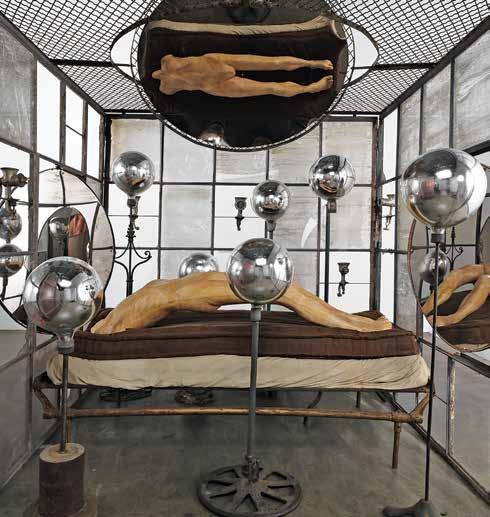
In 1930, Bourgeois was in Sorbonne studying mathematics. Two years later her mother passed away. Unable to cope with her loss, Bourgeois left math and began studying art as a therapeutic
outlet. Over the years she exhibited with the Abstract Expressionists and her art had much in common with Surrealism and Feminist Art. However, she was never formally associated with any artistic movement.
YAYOI KUSAMA
Not much is left to be said about this phenomenal artist. Born in Japan in 1922, she soon became one of the world’s great artists. Yayoi Kusama works primarily in sculpture and installation art. Her work is based on conceptual art but has strong elements of feminism, Minimalism, Art Brut, Pop Art, and Abstract Expressionism.
Kusama usually infuses her artworks with autobiographical, psychological, and sexual content. Her original training was in nihonga, a Japanese traditional painting style. However, her major inspiration was Abstract Expressionism. She actually moved to New York, where she rapidly became one of the most prominent artists of the avant-garde and remains so today.
47 February By author
LOUISE BOURGEOIS, SPIDER
YAYOI KUSAMA, ABODE OF HEART
LOUISE BOURGEOIS, IN AND OUT
NIKI DE SAINT PHALLE

Another great woman sculptor that needs no introduction. Briefly, she was born in 1930 to a traditional family in a town outside of Paris. She started creating art in order to express her discontent with the conservative life she had fallen into. At the age of 18, she married her first husband, Harry Matthews. However, she couldn’t cope with the expectations and obligations of the conservative domestic life. That subsequently lead her to have a nervous mental breakdown. Niki de Saint Phalle turned to paint for therapy. She spent a decade experimenting and developing the Shooting Paintings. In the 1960s, she explored the archetypal role of women, creating a series of sculptures named Nanas. They were papier-mâché, yarn, wool, and wire and constituted the women of the new age. In 1979, she
created her largest project, the Tarot Garden, in Tuscany: multiple female sculptures represented the figures of the tarot cards.
CHRYSSA
Chryssa is a famous Greek sculptor. She was born in 1933 in Athens and she studied art at the Académie de la Grande Chaumière in Paris and at the California School of Fine Arts in San Fransisco. In 1955, she moved to New York. She was deeply inspired by the signs and symbols of the mass communications of modern life.
In the 1960s, she developed her most wellknown trademark, the use of illuminated neon tubes in different shapes and colors. They were a reference to the radiance of the billboards. Through a variety of mediums and techniques, she created compositions with “emblematic ideograms and allusions to ancient Greece, Byzantium, the female personality”.


48 February
NIKI DE SAINT PHALLE, NANA VASE,
CHRYSSA, FIVE VARIATIONS ON THE AMPERSAND
Art
CHRYSSA, SMALL STUDY FOR DOCUMENTA PROJECT SCULPTURE
DORIS SALCEDO
Another contemporary female sculptor worth mentioning, Doris Salcedo was born in 1958 in Bogota, Colombia. Her sculptures “embody the silenced lives of the marginalized, from individual victims of violence to the disempowered of the Third World”. Although her works are mournful, they are not memorials. Salcedo materializes the absence, the oppression, and the gap between the weak and the powerful.
Her sculptures are abstract and open to interpretation since they are testimonies of victims and perpetrators. However, she does not work alone. She works in a collective along with architects, engineers, assistants, and even victims of brutal acts. Salcedo tells her personal story through her art. Members of her own family were among those who disappeared in the politically troubled Colombia.
JANINE ANTONI


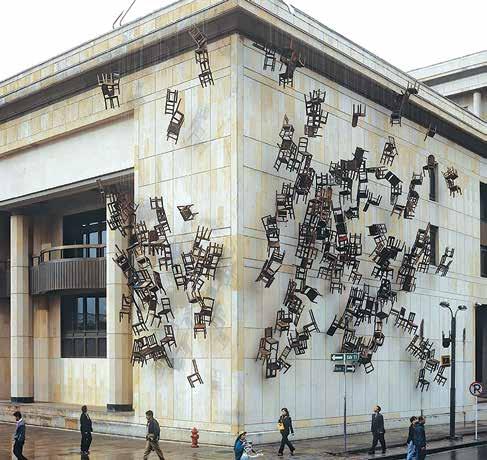
Janine Antoni was born in 1964 in the Bahamas. Her work “blurs the distinction between performance art and sculpture”. This is because her primary tool is her own body. She uses her
By author
mouth, hair, eyelashes, and even her brain through technological scanning. Antoni concentrates on showing the process between the making and the finished work. Also, she is another woman sculptor who often addresses feminist ideas.
49 February
DORIS SALCEDO, NOVIEMBRE 6 Y 7, 2002, MUSEUM OF CONTEMPORARY ART CHICAGO JANINE ANTONI, CROWNED
dailyartmagazine.com
JANINE ANTONI, SADDLE Source:
Iva Draškić
Vićanović,
Faculty of Philology
Dean of the University of Belgrade
BEING AND REMAINING WORTHY
When a first-round secret ballet vote resulted in her being elected dean of the Faculty of Philology in Belgrade two years ago, students, academics and the general public all responded with delight. Who is this competent and capable woman who became a philosophy graduate at the age of just 22? How has she succeeded in keeping her life in her own hands and raising three successful children with her playwright husband? What did she inherit from her celebrity parents; and how has she managed as both a parent and a university lecturer?
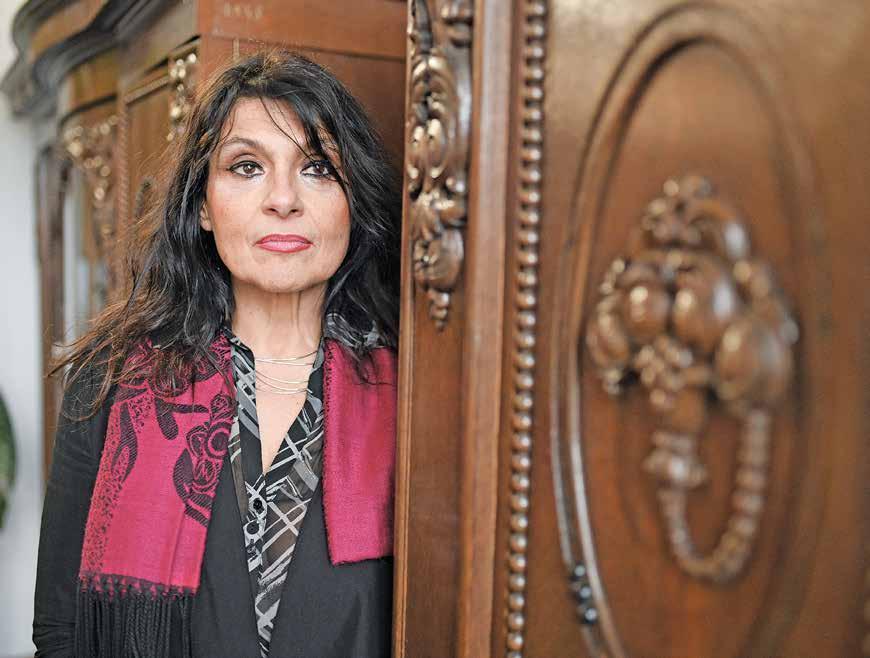
50 February
My life
She is a Ph.D., a professor of aesthetics at the University of Belgrade Faculty of Philology and one of the most highly rated and beloved lecturers among students. She is also the daughter of two artists: Ljubomir ’Muci’ Draškić, one of the most significant Yugoslav and Serbian film and theatre directors; and actress Maja Čučković, the alluring partner of Zoran Radmilović in the famous play King Ubu [Ubu Roi] and as Rumenka in the anthology Radovan III. Both plays were staged by her father at Belgrade’s Atelier 212 theatre and both form part of the glittering pages of this theatre’s rich history.
She is also the great-granddaughter of Panta Draškić, a brigadier general who served in the Army of the Kingdom of Yugoslavia, and the granddaughter of Sreten Draškić, a diplomat of the Kingdom of Yugoslavia, with whom she spent the salad days of her childhood.
She is the wife of Ljubiša Vićanović, a graduate of law and a playwright by vocation, who received the 2014 Sterija Award for his drama Nečiste Sile (Impure Forces). Their marriage resulted in the births of Sara (35), Pavle (34) and Aleksa (25). Sara graduated in Italian language and literature and today lives and works in the Italian city of Ravenna; Pavle is a lawyer; while Aleksa, like his brother, is a graduate of the Faculty of Law currently interning with the court.
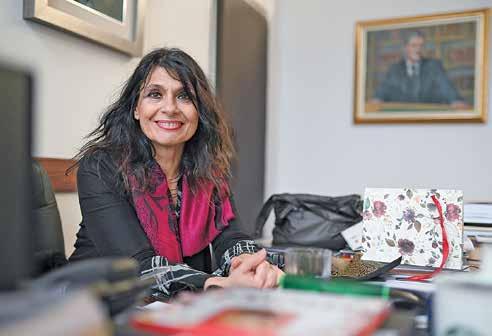
Despite the Vuk Karadžić School being the closest to their home, Iva’s mother Maja decided to enrol Iva, who started school a year early, in the Drinka Pavlović School. The reason for this was that “Drinka” provided the option of so-called extended stay, which meant that she remained in school from early morning until late into the afternoon.
“That was well organised. You do all your homework tasks, have various activities to which you can devote yourself – singing, dancing, fine art, rhythmic gymnastics etc. When I later analysed what impacts on the formation of personality in the education process, I concluded that that extended stay had been very important; it provided a kind of boarding school life. As children at school, we grew accustomed to living together, and we developed true friendships. When we talk about it today, those of us from ‘Drinka’ are like a special section of the population that was raised in the spirit of togetherness. There was no chance of eating your packed lunch unless you shared it
with someone else. Our teachers also directed us to not only be good students, but also good people. That was a good, healthy atmosphere in a good school. I think my mother made a good choice.”
She was such a good pupil at secondary school – initially at the First Belgrade Gymnasium and subsequently at the Fifth Belgrade Gymnasium – that her father considered he “too good”. She excelled at everything, found her studies easy, wasn’t a swot and struggled to decide what she would go on to study.
“I considered studying psychology, acting, directing and opera singing, only to focus on medicine during my third year of high school, on the social studies course. I thus began preparing for the entrance examination for medical studies. Medicine continues to interest to this day, when
By Radmila Stanković
it comes to immunology, for instance. The philosophical aspect of the question of why a person gets sick. However, we gained philosophy as a subject for the fourth year of high school and that was something I found to be fantastic, extremely interesting. Realising that gave me wings, and that was also influenced by the fact that I was the best of my generation in that subject - and that’s how I ended up enrolling to study philosophy.”
Iva Draškić Vićanović (57) grew up knowing that her house was unlike others; with actors and artists gathering there regularly, frequent gettogethers and interesting conversations. She loved that lifestyle and felt that what her parents did was valued in the company of friends and their parents. And her second home was the theatre. Her parents took her with them whenever they didn’t have anywhere to leave her, which was a regular occurrence. Iva felt good there and handled the environment well. She would sit beside the theatre prompter, buzz around, hang out in dressing room. The first play that she recalls clearly, and that her mother performed in and her father directed, was My Family’s Role in the World Revolution.
“The second one, which was very dear to me and which I watched many times, was my father’s play Molière [aka The Cabal of Hypocrites] by Bulgakov. Zoran Radmilović played Molière, my mother played Madeleine Béjart, Đuza Stojiljković
51 February
My father, Muci Draškić, was a bona fide artist. He was highly educated, in parallel with his directing studies, he also studied art history, just like my mother, who studied literature in parallel with acting
My life Iva Draškić Vićanović, Dean of the University of Belgrade
Faculty of Philology
played Louis XIV, and I think Milutin Butković, our family friend, played the role of his life. He portrayed Bouton, Molière’s servant. That was a powerful play that didn’t prove as popular as it deserved to be, because the people prefer comedies.”
Studying philosophy in the 1980s was difficult and very demanding. She fondly recalls Professor Zdravko Kučinar, who lectured on classical German philosophy and with whom she maintains contact to this day. He introduced her to the philosophy of Immanuel Kant, which is a serious and difficult undertaking for any professor.
“I must mention an event here that happened during an exam with Professor Kučinar in June 1986. He was a very demanding but fair professor who lectured on classical German philosophy, which is one of the most difficult subjects during those studies and required months of preparation, even years. I remember that there were about 15 of us in the classroom for the exam - all boys and me as the only girl. Three of us extracted questions and started writing the concept. The exam for classical German philosophy always had a tense atmosphere, with the students feeling scared and anxious. In an attempt to relax us a little, and given that the football world cup was being played at the time, the professor asked: “Boys, does anyone remember which players scored goals in the final of the 1974 world cup?” He wasn’t addressing me, as he expected an answer from the male team. I answered that question matter-of-factly, blurting out without thinking or raising my head from the concept: “Breitner, Müller and Neeskens”. The room fell silent. After a few moments, Professor Kučinar asked, somewhat cautiously and through disbelief: “Excuse me, colleague, but how old were you when that world cup was held?”. “Nine”, I again blurted out while writing my concept. That caused everyone to burst out laughing, led by the professor. We continued working, but in a completely changed atmosphere. To this day, Professor Kučinar and I still joyfully recall that scene from the exam and discuss football. The puzzle of my knowledge actually has a simple solution: my dad loved to watch football and loved me to watch with him. That’s how I spent my days with him watching and commenting on every football match, and of course world cups had a special status, which is how I also remembered that famous 1974 final.”
Another professor that Iva hasn’t forgotten is Mirko Zurovac, her mentor, who taught her
aesthetics and under whom she received her doctorate. Jovan Babić taught her ethics, while she attended lectures on logic by Aleksandar Kron (1937–2000), who she describes as being a very interesting person. She also remembers the excellent professor Branko Pavlović (1928–1986), who was her lecturer on ancient philosophy.

“I was the fastest student, if I may say so myself. I graduated in four years, which wasn’t the norm with philosophy. I always met the first deadline, I liked to “clean up” the year in June. I didn’t chase ‘tens’ and never returned an ‘eight’. It happened in my first year of studies that I transferred psychology to the September and spent
the whole summer stalling with that psychology book. I carried it around the beaches, I took that book with me wherever I went. That ruined my summer holidays, which I otherwise love not as a holiday, but rather as a lifestyle. I grew up at my maternal grandparents’ place in Dubrovnik, and when I matured a little, we would head regularly to Omišalj on Krk; we had a house there that my father inherited from his maternal grandfather.”
Iva got married prior to graduating and gave birth to a daughter, Sara. She met Ljubiša Vićanović, her future husband, when she was just 18. He is a lawyer by training, but he never practiced law. Her early choice was a freelance artist and playwright, but they “recognised” each other and already knew during the years that they dated that their love was something that would endure. They spent one period of their student life and after Iva’s graduation living at Ljubisa’s parents’ summer house near Bijeljina. Iva was engaged in post-graduate studies when she gave birth to a son, Pavle, less than two years after Sara’s arrival. And they then moved to Belgrade, and subsequently to Petrovac on the Montenegrin coast.
“We left Bosnia when war broke out. That
52 February
I’m not among those who think that we were better than today’s generations. I think every generation has its own ways of expressing its own shortcomings
SCENE FROM THE PLAY MY FAMILY’S ROLE IN THE WORLD REVOLUTION, ZORAN RADMILOVIĆ AND MAJA ČUČKOVIĆ
was a terribly tormenting experience. We came to Belgrade and spent the next two years there. I taught philosophy at the Fifth Belgrade Gymnasium, Ljubiša worked for the famous Radio Belgrade programme “Zabavnik” [Entertainer]. It was tough; we didn’t feel good during those years and we deliberated over whether to emigrate or stay here. There were good reasons to do both. Many of our friends and relatives, members of my husband’s family, who is a Sarajevo native, emigrated en masse during those 1990s. An opportunity emerged for us to rent a house for a year in Petrovac on Sea, to take a little break and see what we would do next. Sara was already attending school, it was still one country, so the same school curriculum applied. We wanted to collect ourselves a little, to spend a year down there, and we ended up staying for seven years. It was during this time that I received my doctorate.”
Iva started her professorial activities at the Faculty of Dramatic Arts, after which is lectured on the Philosophy of Art at the Faculty of Fine Arts, as well as the Aesthetics and Hermeneutics of Fine Arts at the Academy of Arts. She then received an invitation from Faculty of Philology

to teach An Introduction to Philosophy at the Seminar for Social Sciences and Aesthetics in the Department of General Literature.
Iva explains what it was like to raise three children while permanently working fulltime.
“Those were specific times, specific circumstances. We moved often and were alone, without any kind of help from our parents. It was hard, but it’s somehow easy to handle because you’re young, because you believe in yourself and your lucky star. What’s most important is that the children were healthy, so complications of daily life weren’t so terrible. And they were good kids. Puberty brought turmoil; we had a proper little war in the house against erroneous values, which had a tendency to sneak into the house.”
When she was appointed dean of the University of Belgrade Faculty of Philology two years ago, Iva won over the affections of not only the academic public, because she beat her opponent in a secret ballot conducted among the Teaching and Research Council with a large majority, and did so in the first round. That hadn’t been her ambition, but she wanted to do something for her College.
“My ambition was to be a good professor, to be good in my profession and to leave a good mark; to teach students what I know best. And I became dean under very specific circumstances. The Faculty of Philology began collapsing dramatically long before my election. Several previous administrations had proven susceptible to both financial and legal wrongdoing, as well as nepotism, which depleted the institution. The last regularly elected dean resorted to a bizarre fraud – he cancelled the electing of the dean by way of a secret ballot among members of the Teaching and Research Council. The two previous lady deans were never elected through a secret ballot of the Teaching and Research Council. It was clear to me that this was a front for something hidden, because it’s impossible for everything to be in order if there is an avoiding of the electing of the dean in accordance with the law, via secret ballot. A lot of bad things accumulated at the Faculty, and this led to the coming together of a team of people with full integrity who were dissatisfied with the state that we’d languished in for a long time. We simply spoke up loudly against all of that, because we’d witnessed the demolishing of a serious institution that we really care about strongly. After more than a year of that struggle to introduce some kind of legal framework in which this Faculty would function without the possibility of the administration appropriating money that belongs to all of us, I was recognised on the part of the collective as a person with the necessary strength and ability to restore the reputation that the Faculty has lost. I didn’t feel that it would be right to refuse the request of the large number of people who wanted me in the position of dean and so I accepted the candidacy; the result of this choice was that I had to set aside my personal

53 February
It’s important to have patience when raising your children, and not to directly forbid anything. The best way to raise children is through the example of their parents
IVA AS A GIRL
IVA’S GRANDPARENTS, NADA AND SRETEN DRAŠKIĆ
My life Iva Draškić Vićanović, Dean of the University of Belgrade Faculty of Philology
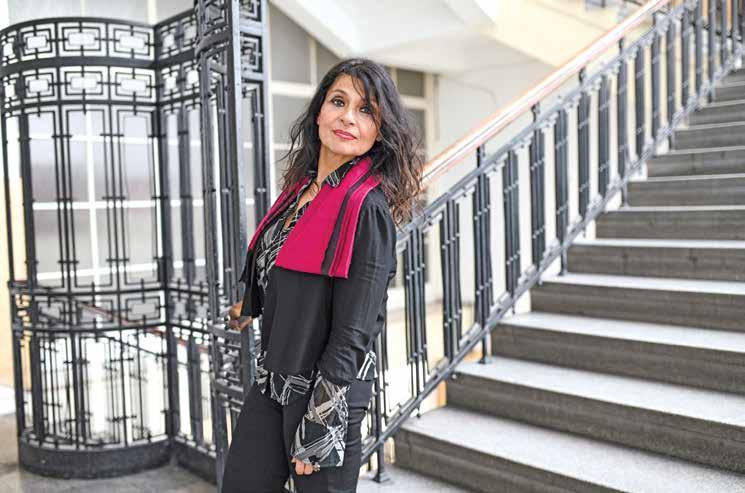
life and completely step out of my comfort zone. That is demanded by the function of dean at this Faculty and under these conditions.”
She has done, and continues to do, everything she can to bring order to this institution. She says that there’s lots of work to be done in a house that has around eight thousand students and nearly 500 employees. She’s mastered and improved upon the complicated and outdated administration, and is satisfied with the way she’s overcome the financial problems she encountered and established financial control. She works with her associates to establish legal procedures that haven’t existed for years. Everything started with the Statute of the Faculty, via various other acts that didn’t exist and were essential to even imagine the work of the faculty.
The students asked Iva to continue holding classes for them even after being elected dean.
“I realised why it isn’t easy for a dean to hold classes. Your mind is torn when you’re primarily dealing with finances and accounting
positions, pipes and electricity, and then you run to the classroom to talk about Kant’s Critique of Judgement. That’s gruelling; it splits one’s mind down the middle. However, I’m the only philosopher in my department and there’s no one to lead Aesthetics instead of me; there’s no one to replace me. On the other hand, that wouldn’t
be fair towards the students, because I would leave them without a lecturer for a subject that’s compulsory and one of the most complicated subjects that they have. They asked me to stay. I promised that I would, with the request that they wait for me in the classroom until I arrive, because I will certainly be running late. And so, they wait for me, I arrive late, but I arrive. I hold classes in basic undergraduate studies, but I’ve given up on doctoral studies. I’ve frozen them until further notice, because I can’t manage it.”
When you hail from a famous family like the Draškićs, you personally carry part of that burden. Iva read a lot as a girl, and when she read The Forsyte Saga, her own Draškićs reminded her of the Forsytes a lot.
“One of the key figures in my life was my wonderful grandfather, Sreten Draškić, who was the kind of grandfather one could only wish to have. I was his only granddaughter and he so adored and devoted himself to me that it’s tough to even imagine. He came to collect me every
54 February
Students, just like children, soak up the qualities of a person who enters their classroom. They feel them very well, and what’s fascinating is that they’re very well aware of whether or not you really know the subject you’re teaching
Friday in his car, a beat-up Citroen ‘frog’, picking me up after school. He would take me home and I would spend time with him until Sunday evening, when my dad would pick me up to take me home. Granddad would devise a programme every time, in order for the two of us to be able to hang out and have as much quality fun as possible. He taught me to play chess, cards, and it was from him that I acquired my first knowledge on Greek mythology and foreign languages. We always knew what we would be doing. We walked, went to the Olimp sports centre, and had Sunday lunch at Aca Devetka. That was a well-planned two-and-a-halfday programme. I travelled around the world with my grandfather a lot. At least two or three times a year, we would tour some important cultural monuments in Europe: Rome, Paris, Vienna, Madrid, London... Granddad Sreten invested a lot of love and energy in my upbringing, which is why his image is among the central pillars of my childhood and youth.”
All the Draškićs achieved something with their lives. Iva’s great-grandfather was the famous general Panta Draškić, her grandfather Sreten was a pre-war diplomat who completed law studies in Belgrade and political science studies in Paris, Sreten’s brother Mladen Draškić was a professor at the Faculty of Economics, his sister Ljubinka was university-educated and worked as the director of the University Library, uncle Dragiša Draškić was a professor at the Faculty of Mining. The entire family lived up to its reputation in society and maintained a very strong family ethic – achieving reputation and status comes by way of one’s personal efforts and personal value.
“The Draškićs looked up to their ancestors, but each of them fought independently to express themselves in the best possible way and provide their own contribution to society. My father was also well aware of who his ancestors were, and he appreciated that, but he wasn’t one of those who base their identity on their origins, rather his identity was primarily based on his own work and his personal values. Muci Draškić was a bona fide artist. He was highly educated, in parallel with his directing studies, he also studied art history, just like my mother, who studied literature in parallel with acting.”
Iva is clear about what she believes are the best things she inherited from her parents.
“It seems to me that I have mental stability from the Čučkovićs, from my mother. I handle

stress and challenges well. I have that healthy Dubrovnik-Herzegovinian awareness of who I am. It’s somehow clear to me what and how much I’m worth, but I can’t ‘get water in my ears’. I’m not vain and am grateful to God, or to nature, that this is the case.
“From the Draškićs, or more precisely from my grandfather and father, I think I inherited a sense of ease, or the skill of communication. I’m not prone to pretentiousness, and nor were my grandfather and father. Nothing can make me lose my tact and cause me to go ‘crazy’ and say or do something I would later regret. My mum really wasn’t adept on that front, with her it was often the case that ‘what’s on the mind is on the tongue’. That can be entertaining, but it’s not very convenient when you need to communicate with large numbers of people.”
When someone lectures on aesthetics, it’s somehow desirable for them to conduct themselves
in a way that says they inherited their behaviour from Draškić. What’s for certain – as confirmed by her students – is that the value system she teaches them succeeds in being ‘adopted’, just as she and her husband succeeded in doing with their own children.
“I’m not among those who think that we were better than today’s generations. I think every generation has its own ways of expressing its own shortcomings. It’s important to have patience when raising your children, and not to directly forbid anything. The best way to raise children is through the example of their parents. And it’s also similar with students. Students, just like children, soak up the qualities of a person who enters their classroom. They feel them very well, and what’s fascinating is that they’re very well aware of whether or not you really know the subject you’re teaching. I don’t know what tentacles they use to reach that conclusion, but they can clearly see if you have sovereignty and can very easily – particularly in our fields of the humanities – reach the essence of a professor’s personality.
“It’s very important to preserve the possibility of entering the classroom with your head held high and to be able to be calm, collected and true to yourself in front of your students. A professor must, as a person, be and remain worthy of the quality of the content they’re conveying to younger generations.”
55 February
A professor must, as a person, be and remain worthy of the quality of the content they’re conveying to younger generations
IVA WITH HER PARENTS
CHILL OUT
NASA Satellite Discovers Second Earth-sized Planet In The Habitable Zone
Scientists from NASA announced that they discovered an Earth-size planet orbiting its star’s habitable zone. Called TOI 700 e, the planet is part of the TOI 700 system and is 95% the Earth’s size and likely rocky, according to NASA, which used data from its Transiting Exoplanet Survey Satellite (TESS). NASA previously discovered three planets in the same system, called TOI 700 b, c and d. Planet d is also in the habitable zone of the star, NASA said.

Ronaldo Signs With Al Nassr For Record-breaking Salary

Football superstar Cristiano Ronaldo is joining Saudi Arabian club team Al Nassr in a deal that will see him play until June 2025. “History in the making,” Al Nassr FC wrote in a Twitter post on its official English-language account. “This is a signing that will not only inspire our club to achieve even greater success but inspire our league, our nation, and future generations, boys and girls to be the best version of themselves. Welcome Cristiano to your new home AlNassrFC.” The Saudi club quoted Ronaldo as saying he is “eager to experience a new football league in a different country.”
Potential Ban on Gas Stoves In The U.S.
US federal agency is considering a ban on gas stoves amid rising concern about the health risks associated with indoor air pollution from the appliances, particularly among children. The U.S. Consumer Product Safety Commission, which can issue mandatory standards or ban consumer products if no feasible standard would adequately protect the public, plans to take action to address the gas pollution that has long been linked to health and respiratory problems. New regulatory action could require all new homes be built with electric stoves or high efficiency exhaust vents.

56 February
Microsoft’s AI Can Clone Voice After 3-second Audio Clip

Microsoft has developed artificial intelligence that clones a person’s voice perfectly after analyzing just three seconds of an audio clip of them speaking - but some fear it provides a tool for scammers to steal your voice. Called VALL-E, the system could be used by a telephone scammer to capture just three seconds of your voice and replicate it, which would also include your emotional range and acoustic environment. This would allow bad actors to bypass systems that use your voice as a password.
Miss Universe Plans To Become Reality Show

Miss Universe, which has suffered a dramatic rating decline in the last five years—and some big reputational hits more recently—has a new owner, Anne Jakapong, who will become the first non-American owner and first transgender woman to put her imprint on the beauty pageant. The billionaire CEO of Thai media company JKN Global plans to build a reality show from the competition, creating a series that she hopes will be a mashup of Project Runway and American Idol.
Dress Worn By Princess Diana Up For Auction
An iconic Victor Edelstein dress worn by the late Princess Diana in a 1991 royal portrait will be going on auction in New York. The stunning deep purple gown, featuring strapless detail and opulent silk velvet material - as well as a tulip-shaped stiffened skirt- carries an estimate of $80,000 to $120,000 Sotheby’s will be offering the regal ensemble, which more than once adorned the People’s Princess. A 1991 painting by Douglas Hardinge Anderson saw Diana in the dress. The piece now proudly hangs at the Royal Marsden Hospital, which she visited, supported through philanthropy, and served as President for.

57 February
Remembering

Vivienne Westwood
I take something from the past that has a sort of vitality that has never been exploited – like crinoline – and get very intense. In the end, you do something original because you overlay your own ideas.
 ~
Vivienne Westwood
~
Vivienne Westwood



58 February
RED CROC EMBOSSED CHANCERY HEART HANDBAG
RED AND BLACK EQUESTRIANSTYLE PANTSUIT
RED TARTAN WOOL PLEATED SKIRT WITH BUSTLE
ANGLOMANIA PEEP TOE SHOES
POLKA DOT BELT FROM RED LABEL




CREAM PLAID



VIRGIN WOOL BONDAGE STRAP PENCIL SKIRT

SUPER ELEVATED COURT SHOE

59 February
RED LABEL TWISTED LEG TARTAN TROUSERS
RED DRESS
VINTAGE RED LABEL BLACK SATIN DRAPE FRONT CORSET TOP
TAN & BLACK MESH TEXTURED WOOL BLEND JACKET
RED LABEL TARTAN HEART BELT
Filippo Spreafico - Italian Stand-up Comedy in English

1 February – 20.30 – Black George
Globetrotting Italian comedian Filippo Spreafico is coming to Belgrade with his irreverent and surreal stand-up comedy show. Filippo Spreafico has been Italian for many years, and he is completely unapologetic about it. He even has a passport that proves it. His show is about identity, where to purchase it, and how to cook it properly to impress your friends. OK, that’s the Italian part. But what
Concerts in the Gallery
27 February – 20.00 - KCB
Concerts from the series Concerts in the Gallery, organized by the Cultural Center of Belgrade (KCB), an important cultural institution of the capital, are again this year a guest

about Rhapsody? According to the dictionary, a rhapsody can be: an effusively rapturous or extravagant discourse; a composition of irregular form having an improvisatory character; or, an unusually intense, emotional literary work. That sounds about right! Expect all of the above packed into a comedy show.
My Pompeii - Two Thousand Years Later Exhibition
Until 28 February - Italian Institite for Culture
The Italian Institute for Culture in Belgrade presents the exhibition
“My Pompeii - Two Thousand Years Later” by Boško Jovanović, which will be held from 25 January 25 to 28 February. The exhibition includes a selection of paintings and watercolors by this Serbian painter inspired by ancient Pompeii, one of the most visited archaeological sites in the world, a world heritage under
at the Italian Institute of Culture in Belgrade. With this cooperation, the Institute confirms itself as a center for launching cultural cooperation initiatives and activities, open to the city and the Belgrade audience, and becomes a stage for young gifted musicians, prize winners at national and international competitions, as well as established musicians.
Ludwig van Beethoven’s Ninth Symphony
4 February – 20.00 – Kolarac Hall
A spectacular concert by the RTS Choir and Symphony Orchestra will mark the day of the Great Hall of the Kolarc Endowment, 4th February. On this occasion, one of the most monumental works of musical history will be performed - Ludwig van Beethoven’s Ninth

the protection of UNESCO. In 1998, thanks to the Italian Institute of Culture in Belgrade, this painter had the opportunity to access the site and witness the work of archaeologists at the excavations, where he made sketches of newly excavated artifacts.
Symphony. Soprano Sonja Šarić, alto Jelena Končar, tenor Stevan Karanac, and bass Goran Krneta will perform as soloists at the concert, while Srba Dinić will conduct. The concert starts at 8 p.m., and tickets are on sale at the box office of the Kolarac endowment.

February 60 SEE MORE: WWW.CORDMAGAZINE.COM calendar Culture
Alex Ferguson My Autobiography

Alex Ferguson
1903 rsd
Sir Alex Ferguson’s compelling story is always honest and revealing he reflects on his managerial career that embraced unprecedented European success for Aberdeen and 26 triumphant seasons with Manchester United. Sir Alex Ferguson’s best-selling autobiography has now been updated to offer reflections on events at Manchester United since his retirement as well as his teachings at the Harvard Business School, a night at the Oscars, and a boat tour around the Hebrides, where he passed unrecognized. The extra material adds fresh insights and detail on his final years as United’s manager.
What Investors Really Want
Meir Statman
1295 rsd
Combining the new field of behavioral finance with the real world of investing, this engaging new book explores the mindsets and motivations behind the major money decisions--and the most common mistakes that investors make every day. With insider’s insight and a storyteller’s voice, behavioral finance expert Meir Statman reveals What Investors Really Want. Investors want bigger profits with lower risks. How our desire for free investment lunches can leave us with no lunches. Investors want to play and win. How our desire to win the investment game can turn us into losers.

Daughter of the Moon Goddess

Sue Lynn Tan
1336 rsd
The bestselling debut fantasy is inspired by the legend of the Chinese moon goddess. A young woman’s quest to free her mother pits her against the most powerful immortal in the realm, setting her on a dangerous path where those she loves are not the only ones at risk... There are many legends about my mother...Raised far away on the moon, Xingyin was unaware she was being hidden from the Celestial Emperor - who exiled her mother for stealing the elixir of immortality. But when her magic flares and reveals her, Xingyin is forced to flee her home, leaving her mother behind. Inspired by the legend of Chang’e the Moon Goddess, this captivating debut weaves Chinese mythology into a sweeping adventure of love and family, immortals, and magic.
The Atlas of Atlases

Philip Parker 4852 rsd
This beautiful book is a lavishly illustrated look at the most important atlases in history and the cartographers who made them. Atlases are books that changed the course of history. Pored over by rulers, explorers, and adventures these books were used to build empires, wage wars, encourage diplomacy, and nurture trade. Written by Philip Parker, an authority on the history of maps, this book brings these fascinating artifacts to life, offering a unique, lavishly illustrated guide to the history of these incredible books and the cartographers behind them.
Framers: Make Better Decisions In The Age of Big Data
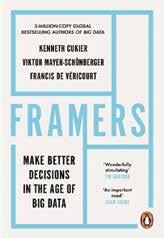

Kenneth Cukier 1619 rsd
A Financial Times and Economist Book of the Year. The power of mental models to make better decisions. We’re often told that humans make bad decisions and that more data is better. But this is backward: people are good at decisions precisely because we use mental models and can envision new realities outside of data. Great outcomes don’t depend so much on the final moment of choice but on generating better alternatives to choose between. That’s framing. It’s a cognitive muscle we can strengthen to improve our lives, work, and future - to meet this historical moment. Framers shows how.
Friends, Lovers and the Big Terrible Thing
Matthew Perry 2510 rsd
So begins the riveting story of acclaimed actor Matthew Perry, taking us along on his journey from childhood ambition to fame to addiction and recovery in the aftermath of a life-threatening health scare. Before the frequent hospital visits and stints in rehab, there was five-year-old Matthew, who traveled from Montreal to Los Angeles, shuffling between his separated parents; fourteen-yearold Matthew, who was a nationally ranked tennis star in Canada; twenty-four-year-old Matthew, who nabbed a coveted role as a lead cast member on the talked-about pilot then called Friends Like Us. . . and so much more.

61 February RECOMMENDS
SEE MORE: WWW.CORDMAGAZINE.COM
FACES PLACES&
13/1/2023
Ministry of Foreign Affairs Host Traditional New Year’s Reception

“Serbia’s diplomatic activities in the coming period should be directed towards foreign policy priorities, namely the preservation of sovereignty and territorial integrity and full membership in the European Union,” said the Minister of Foreign Affairs Ivica Dačić, at traditional reception for members of the Government of Serbia and the diplomatic corps on the occasion of marking the New year according to the Julian calendar. Among others, the New Year’s reception at the Ministry of Foreign Affairs was attended by US ambassador Christopher Hill, ambassador of Russia Alexander Botsan-Kharchenko, head of the EU delegation Emanuele Giaufret, ministers Tanja Miščević, Tomislav Žigmanov, Đorđe Milićević, Novica Tončev and Tomislav Momirović.
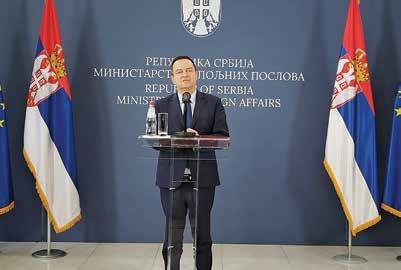
14/1/2023
EU Ambassador Opens Photo Exhibition “To be young in Serbia”

The exhibition of the 20 best photos created as part of the “To be young in Serbia” contest was opened in Silosi in Belgrade. The photos show how young people live in Serbia, what they hope for and see in the world around them, says the EU Ambassador to Serbia, Emanuele Giaufret, who points out numerous challenges in 2022 are also shown through the lens. “This is my first year in Serbia, and those 365 days seem like 600 to me. This year started with ideas and goals; Novi Sad took the title of the first European capital of culture outside the EU, we had plans when it comes to the fight against climate change, but somehow everything had to be reorganised”, emphasised Ambassador Giaufret. Miloš Krstić, with the photo “Festival Euphoria”, won the first prize, and his work was featured in the Serbian edition of the National Geographic magazine and Politika Zabavnik.
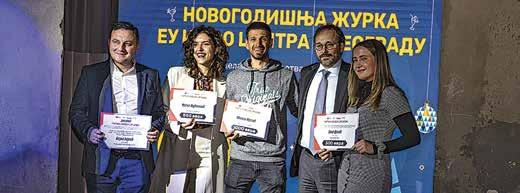
62 February
16/1/2023
Minister Of Foreign Affairs Of Tongo Visits Serbia
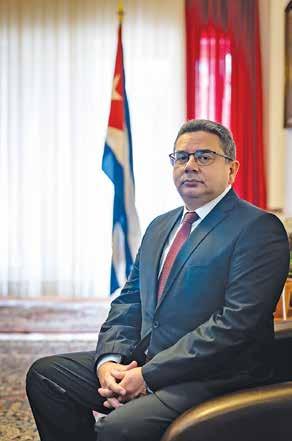
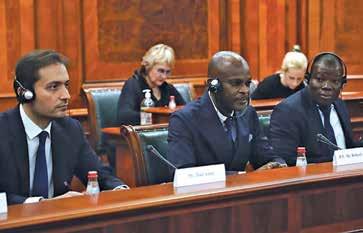
Prime Minister Ana Brnabic met with Robert Dussey, Minister for Foreign Affairs, Regional Integration and Togolese Abroad of the Togolese Republic, about the development of bilateral relations, the possibilities of improving overall cooperation, and especially cooperation in the field of digitalisation, science and advanced technology. The Minister of Foreign Affairs of Togo assessed that there is significant room for improvement in economic cooperation and said that his country is a reliable, both economic and political partner of Serbia on the African continent, inviting investors from our country to invest in Togo.
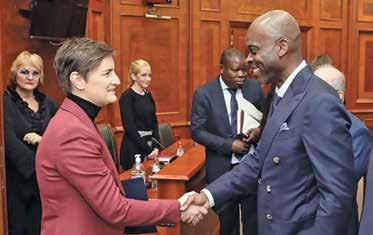
18/1/2023
Ana Brnabić Receives The Ambassador Of Cuba On A Farewell Visit
The Prime Minister of Serbia, Ana Brnabić, received the ambassador of the Republic of Cuba H.E. Gustavo Trist del Todo, on a farewell visit and on that occasion, expressed her gratitude for the friendship and improvement of the overall relations between the two countries on all areas of common interest during his mandate. Brnabić wished the outgoing ambassador success in his further engagement and told him that Serbia remains his home and that he has a personal friend in it, the Government announced. According to her, Belgrade highly appreciates Cuba’s consistent support for sovereignty, territorial integrity, and support for Serbia’s positions.
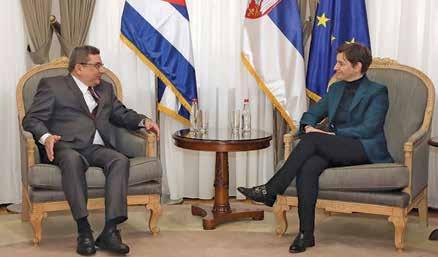
63 February
SEE MORE: WWW.CORDMAGAZINE.COM
FACES PLACES&
20/1/2023
Western Envoys Visit Serbia
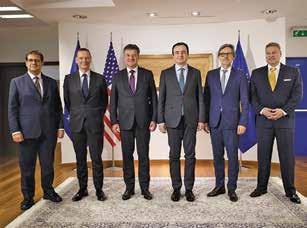
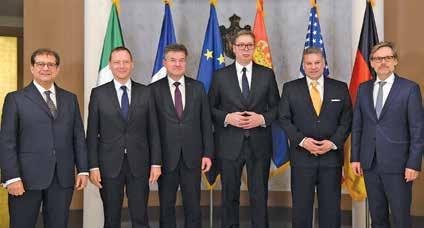
The European Union special representative for the Serbia-Kosovo dialogue, Miroslav Lajcak, told media in Belgrade that he and his EU and US colleagues are encouraged after meeting Serbian President Aleksandar Vucic. Lajcak met Vucic after previously meeting Kosovo Prime Minister Albin Kurti in Pristina together with the US Special Envoy for the Western Balkans, Gabriel Escobar, advisors to the President of France and Chancellor of Germany Emmanuel Bonne and Jens Plottner, and adviser to the Prime Minister of Italy Francesco Talo.
21/1/2023
Serbia Celebrates Chinese New Year
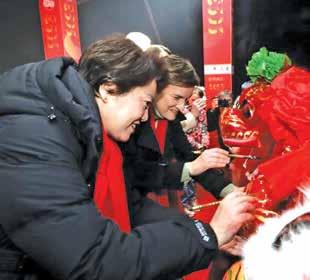
With the warm wishes of Chinese Ambassador H.E. Chen Bo and Prime Minister of Serbia Ana Brnabić to strengthen the steely friendship and prosperity of the two peoples, and with fireworks on Kalemegdan, the celebration of the Chinese New Year in Serbia began. On that occasion, Chen Bo said that the celebration of that traditional cultural manifestation is the embodiment of steel friendship between the two peoples. “The two nations, although geographically far, are getting closer and closer, which is an invaluable asset,” said the Chinese ambassador. Brnabić emphasized that China and the Chinese people always had respect for Serbia and thanked them for being with our country even in difficult times, for supporting its territorial integrity and sovereignty and for always having great respect for what is Serbian national interest.
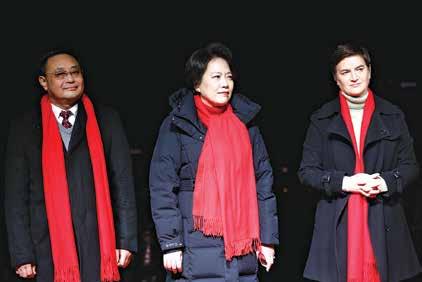
64 February
H.E. Christopher Hill, US Ambassador to Serbia, visited the Nikola Tesla Museum on the occasion of the signing of the Memorandum of Understanding between this Ministry and the US Agency for International Development. The document was signed by Minister of Mining and Energy Dubravka Djedovic and Director of the USAID Mission in Serbia Brooke Asham. The joint educational campaign was designed to help households reduce energy consumption and save money through practical advice on ways to save, and the character of Nikola Tesla was used as inspiration for the programme.
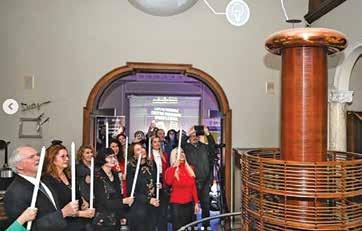
President Of Serbia Receives The Ambassador Of Palestine On A Farewell Visit
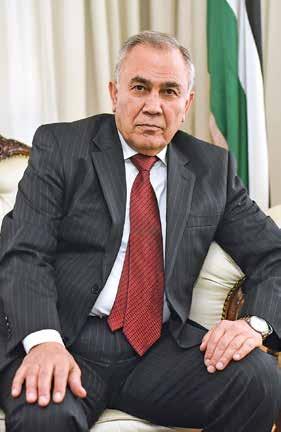
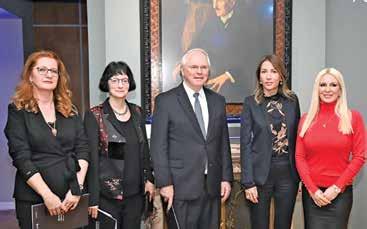
The President of the Republic of Serbia, Aleksandar Vučić, received the Palestinian Ambassador H.E. Muhamed Nabhan on a farewell visit and thanked him for his outstanding contribution to the close relations between Serbia and Palestine and its people during the Ambassador’s long-term mandate. President Vučić said that Ambassador Nabhan left a deep mark on Serbia with his personality and hard work.
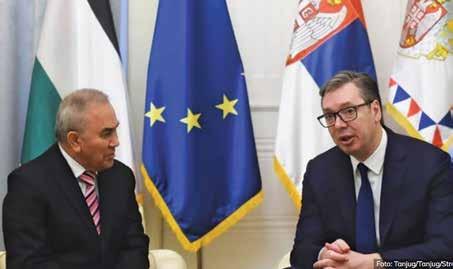
65 February SEE MORE: WWW.CORDMAGAZINE.COM
24/1/2023
U.S. Ambassador Visits Nikola Tesla Museum
26/1/2023
FACES PLACES&
26/1/2023
Japan Important Partner In Energy Transition
The Minister of Mining and Energy, Dubravka Đedović, met with the Ambassador of Japan to Serbia H.E. Takahito Katsumata, to discuss bilateral relations and the improvement of cooperation in the field of energy. The Ambassador of Japan reminded that last year the two countries celebrated 140 years since the establishment of diplomatic relations and that Japan is a strong partner of Serbia in the energy transition process. “Serbia and Japan have a long tradition of relations that were intensified after the historic visit of former Prime Minister Shinzo Abe to Belgrade in 2018. Serbia is a key country for peace and stability in the Western Balkans, and Japan will continue to provide strong support for the implementation of reforms on the European path. In the field of energy transition, we work together on desulfurization projects in TENT A and B,” said Ambassador Katsumata.
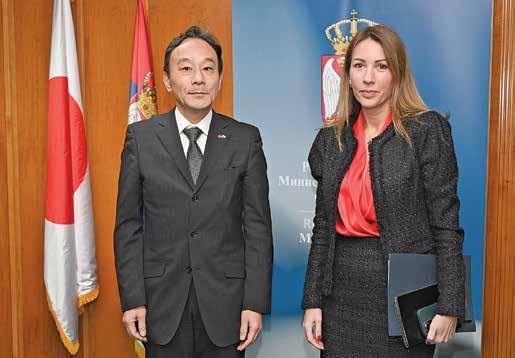
26/1/2023
Celebration Of Republic Day Of India
The Embassy of India India in Belgrade celebrated the 74th Republic Day of India on 26 January 2023 to commemorate the coming into force of the Constitution of India on 26 January 1950. On occasion, Ambassador of India H.E. Sanjiv Kohli hoisted the national flag of India at an event held on the morning of 26 January 2023 at the Embassy premises and read out the address of the Hon’ble President of India. Members of the Indian community and many Serbian friends of India joined the celebration. India chose 26 January as the official enactment date of the constitution’s promulgation in recognition of the Purna Swaraj (complete self-rule) declaration of independence from British rule. With the enactment of the constitution, India was officially known as the Republic of India, a “sovereign socialist, secular democratic republic” that “secures to all its citizens’ justice, liberty, equality, and fraternity,” according to its Preamble.
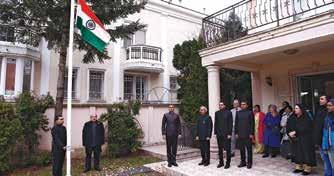
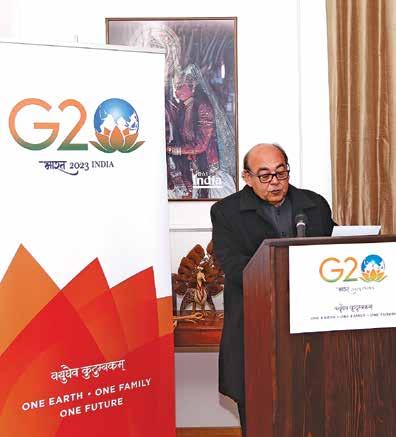
66 February
SEE MORE: WWW.CORDMAGAZINE.COM

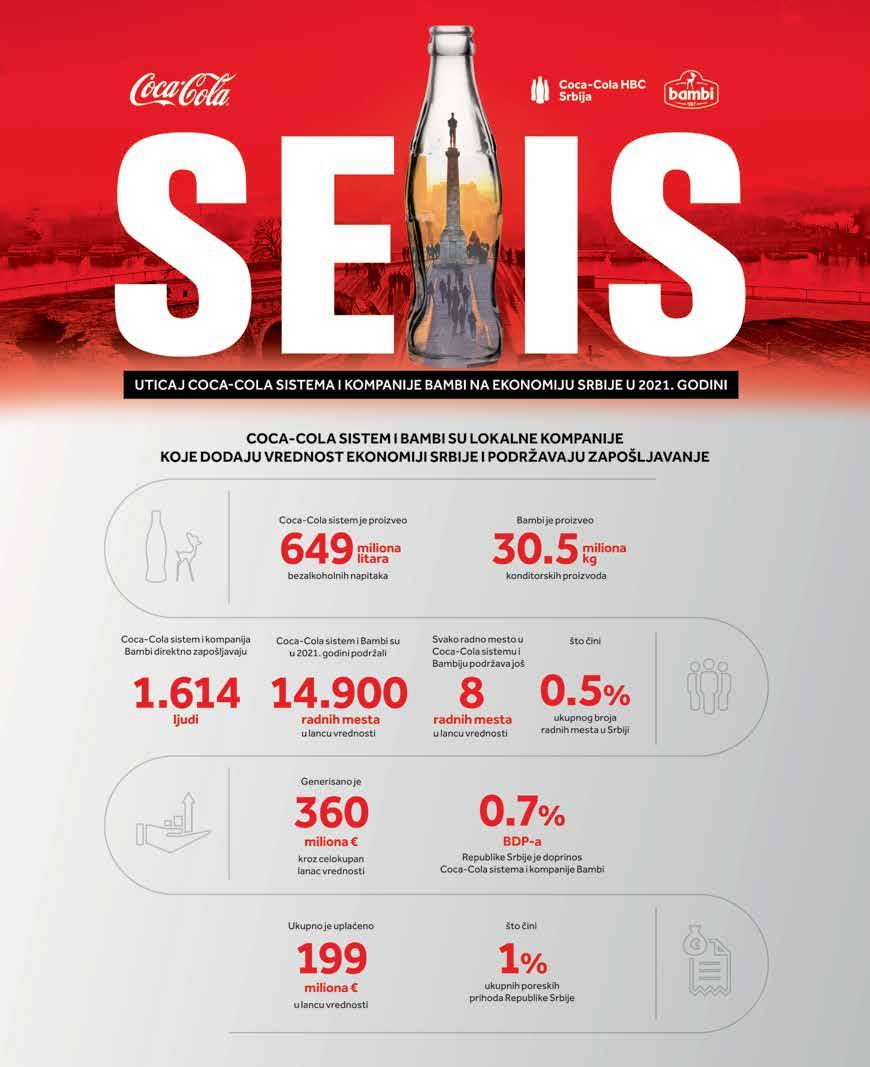
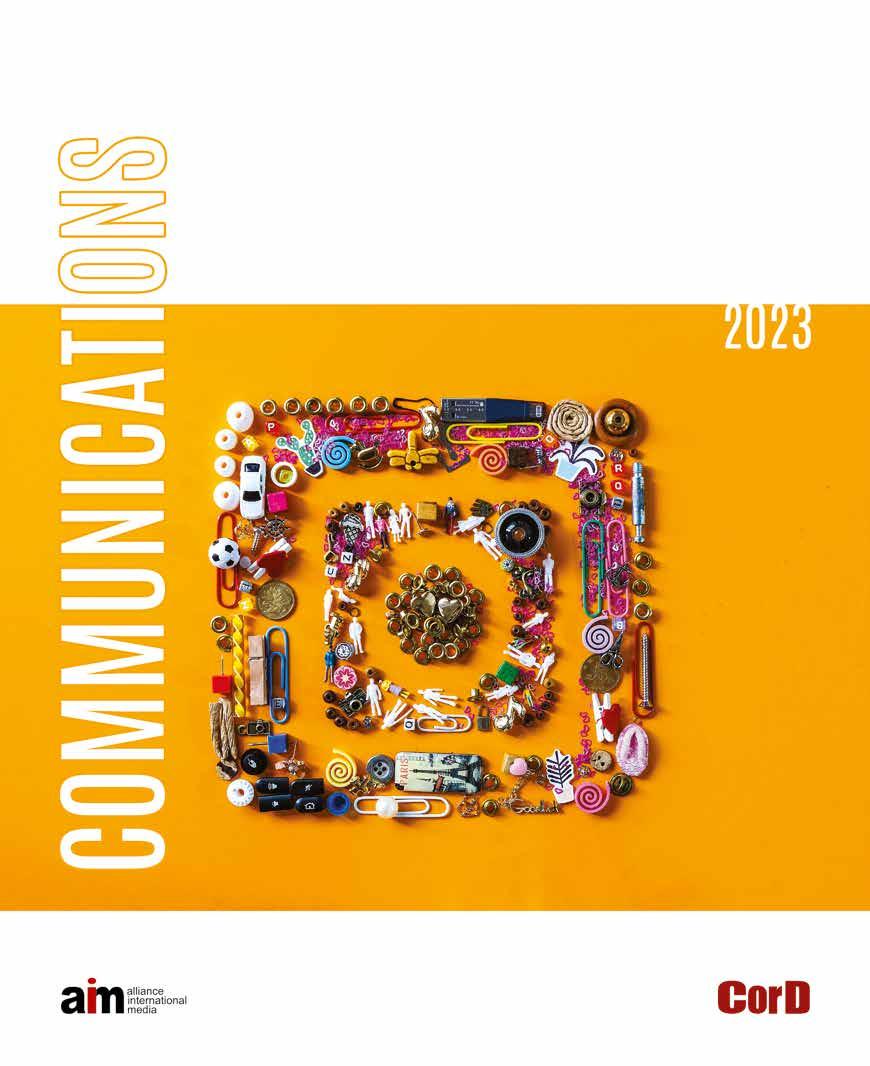
06
Tamara Daltroff, CEO of the European Association of Communications Agencies (EACA) PROMOTING THE POWER OF SELF-REGULATION
12 Tamara Bekčić, Co-Founder and Managing Director, and Milena Avramović Bjelica, Co-Founder and Executive Director, Chapter 4 Srbija+ ORIENTED TOWARDS PEOPLE, RESPECT AND ETHICS


10 Filip Đorović, Marketing Director, Shoppster Serbia & Slovenia CUSTOMERS ACTIVELY FORM THE OFFER

11 Aleksandra Kožul, Communication Director External, Internal and Digital, Novaston THE EMPHASIS IS ON BALANCE





14 Maja Subotić, Managing Director Ivana Petković, Creative Director Milena Simović, Client Service Director Marija Joksimović, Media Director SEEKING SMART SOLUTIONS

Communications 2023 2 Contents Communications
16
Aleksandra Sekulić, Account Director, Direct Media BEING AUTHENTIC IS IMPORTANT
18 Miloš Duduković, COO, Right THE ESSENCE OF PR REMAINS CONSTANT, EVEN WITH RAPID TECHNOLOGICAL ADVANCEMENTS

17 Nevena Kurtović, Managing Director, Fusion Communications DIGITAL IS THE STANDARD WAY OF LIFE


19 Marina Grihović, Founder and Director of PR and Media Consulting Agency Headline and Digital Communications Agency DKIT PROUD OF A SMALL JUBILEE


20 Andrea Ivančević, Rocket Flow Founder & CEO UNDERSTANDING THE CLIENT IS VITAL


21
Milivoj Đorđić, GM, Smartpoint Adria THE FUTURE IS IN DIGITAL COMMUNICATIONS
Communications 2023 3
28
A PARTNER WITH THE HIGH-QUALITY FACTOR 29 World Federation of Advertisers FIVE PREDICTIONS FOR 2023






Communications 2023 4 Contents
22
Jana Savić Rastovac, Executive Creative Director, McCann LOVE
IS THE KEY TO ENDURING
24
Tanja Bogdanov, Managing Partner and Founder, Vekol DHC
THE POWER OF VARIETY
26 Bojana Stanković, Head of communications, Smart Vision DIGITAL IS STILL ON THE THRONE
Dragana Tomić, CEO, Nova Concept doo

“Good communication is just as stimulating as black coffee, and just as hard to sleep after.”
- Anne Morrow Lindbergh
Promoting The Power OfSelf-Regulation

The advertising industry is aware of its capacity to reach consumers and thus its ability to influence perceptions and practices. With this important ability comes also the responsibility to be part of the solution and to thrive for more sustainable market practices. This is exactly the case with the Ad Net Zero programme, which was launched in the UK in November 2020 by the Advertising Association, ISBA and the IPA, and which includes in its membership over 100 advertisers, agencies, commercial media owners and production companies. The year 2022 will be remembered as the year in which the Ad Net Zero programme’s target to reduce the emissions of advertising operations to net zero by 2030 was rolled out globally.
“The objective is to have a global ambition regarding the programme and to implement the Ad Net Zero Action plan as broadly as possible, and this is where we are currently working to develop the programme with local chapters within EU Member States and beyond,” explains EACA CEO Tamara Daltroff.
The Ad Net Zero 5-point Action Plan pledges to reduce carbon emissions from advertising operations to net zero by 2030, with businesses committing to robust, verified plans to reduce their emissions. The action plan thus lays out solutions to reduce advertising businesses’ own operations, production, media choice and
Communications 2023 6
Tamara Daltroff, CEO of the European Association of Communications Agencies (EACA)
Climate change is the most pressing issue of our times and the advertising sector has an important role to play when it comes to reducing carbon emissions through the impact of its activities on consumers, the market and, ultimately, the environment
Interview
INFLUENCE DISINFORMATION TURNAROUND
The advertising industry can be a driver of the major societal changes that are taking place within society and has a role to play in contributing to the progression to a more sustainable economy
awards, as well as leveraging the positive influence advertising can have on changing consumer habits.
In this context, the Ad Net Zero programme also pledges to use the power of advertising to accelerate the transition to more sustainable products and services for consumers.
“The programme provides a roadmap for development in other markets, with the flexibility to adapt and develop market specific solutions. It offers tools that are readily available internationally, like the AdGreen carbon calculator to help to measure and reduce emissions from advertising production,” explains our interlocutor.
And yet, at the same time, the marketing industry has often been seen as creating media strategies in defence of the largest polluters and promoters of overconsumption. Under such circumstances, how can advertising drive an unambiguous positive social impact?
Advertising is to a large extent a reflection of economic activity taking place within a market and is designed to appeal to consumer expectations. When the expectations of consumers change, advertising will ultimately need to change too. However, as an industry, and more specifically talking on behalf of the EACA, we do not see ourselves as passively contemplating the change, but rather we want to be leaders of this change, as we are convinced that the advertising industry has a vital role to play in shifting market practices to align with consumer expectations. We aspire to be part of the solution, not the problem. And those actors that have been identified as being part of the problem today will possibly (and hopefully) be part of the solution tomorrow too. Take for instance the energy sector, which, while being a major polluter, is highly likely part of the solution to producing more sustainable energy tomorrow.
To help agencies navigate Brand Safety issues in times of crisis, EACA has issued specific industry guidelines with best practices to adopt that ensure the demonetisation of disinformation content
From an advertising point of view, we are fully supportive of the objectives of the Green Deal of the European Commission, which are directly of concern to us. For instance, there is currently a proposal on the table on the substantiation of Green Claims to avoid Greenwashing. We had very productive exchanges with the European Commission over the course of 2022 and are fully committed to contributing to setting high standards in terms of Green Claims that advertisers and agencies can comply with, since we believe that this is an issue
We are currently facing a recession-like period. However, there seems to be light at the end of the tunnel, with economic activity predicted to slowly pick up again during this year
though 40% of students have completed an internship at creative, media or digital agencies, there are almost 70% that have considered alternative career paths. These students often consider that the advertising industry will not allow them to be an actor of positive change, which they nonetheless aspire to be.
One of the major challenges we are thus facing is to promote jobs in the advertising industry by demonstrating the undeniable societal impact that advertising has, as well as the ability to be an actor of positive change within our sector. That is something that we can, want and will improve in the years to come.
The 30th Anniversary Declaration of the EASA promotes strong self-regulation, which ensures a high-level of consumer protection and justifies trust in advertising. How truly committed is industry to adhering to this document?
of major societal importance to which we want to contribute positively.
However, it is true that the advertising sector is often perceived by the public as promoting interests that have negative impacts on the environment. It is definitely an important factor in reducing the attractiveness of the communications sector when it comes recruiting talent. Many agencies struggle to attract young communications professionals and this trend has been increasing over the past several years.
To address the talent crisis in the industry, EACA recently launched - in collaboration with the European Institute for Commercial Communications Education (edcom) – two surveys in Europe aimed at final-year advertising students and agency recruiters in our sector. The main objective was to identify the mismatch between the talent and the industry. The results show that, even
EACA is a founding member of EASA and we truly believe in the power of self-regulation, which serves two main purposes. The first one is that self-regulation allows the advertising industry to apply responsible advertising standards before the legislator can do so. As an industry, we know the market practices and tendencies in advertising and can adapt to them swiftly. Since regulation is a complex process in which many different stakeholders intervene, it often lags behind ever-changing market practices. This is where self-regulation is so powerful, as it allows the industry to act quickly and efficiently to promote responsible advertising practices. This is not a perfect system, but the achievements of self-regulatory bodies across Europe show that it is an important system, both for the industry and for society. Take for instance topics like influencer marketing; self-regulatory bodies have the possibility to quickly set specific standards that they require influencers to comply with if they
Communications 2023 7 Interview
We want to persuade the entire advertising ecosystem, and not only the major players, to adopt high sustainability standards and thus shift practices before that is embraced from a regulatory perspective
want to work with certain clients. Legislation is often much slower to react.
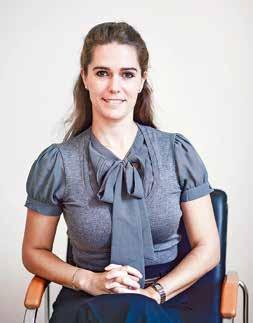
However, we should not oppose both (regulation and self-regulation) and this is the second reason that we truly believe in the power of self-regulation. At the European level, and through our membership in EASA, we see that regulators often seek and rely on expertise from self-regulatory bodies whenever they are drafting a regulatory proposal. This is another topic where we are also striving to be part of the solution in helping the legislators where we can in order to contribute to creating a responsible advertising ecosystem. And this is exactly the aim of EASA’s 30th Anniversary Declaration.
Turning to more practical issues, how would you assess the impact of the global economic crises of 2022 on the global advertising industry?
The year 2022 was a highly eventful one, with many challenges to overcome. Firstly, the Russian invasion of Ukraine led regulators, but also advertisers and agencies, to closely scrutinise monetary sources of disinformation and implement additional safeguards to ensure the viable monetisation of legitimate advertising content. EACA is a signatory of the European Commission’s Revised Code of Practice on Disinformation and thus commits, alongside more than 30 other signatories in the advertising industry, to act and report on progress to demonetise the dissemination of disinformation. In this context, and in order to help agencies navigate Brand Safety issues in times of crisis, EACA has issued specific industry guidelines with best practices to adopt to ensure the demonetisation of disinformation content.
Likewise, inflation has posed serious challenges to agencies in the context of crisis. Many companies tend to cut marketing spending as one of the first cuts, and in appearance rather simple measures taken to tackle budgetary issues. However, this not only has negative consequences on the activities of agencies, but also on clients, as brand building efforts within a given market can only be viable by engaging in long-term marketing strategies. Several stakeholders within the advertising industry have published extensive evidence on the negative longterm consequences of cutting advertising
spending and more generally on how to seize the opportunities that periods of crisis can generate, rather than only looking at it from a problem side.
to the supply shortages that ultimately led to the recession-like period we are currently facing. However, there seems to be light at the end of the tunnel, as economic activity is predicted to slowly pick up again this year and high inflation should progressively fall in the coming months.
From a more industry-specific point of view, enforcing transparency in digital advertising will play a major role in 2023.
With the adoption of the Digital Services Act, online platforms will have to disclose who is behind an ad, who finances and ad, on which parameters a user is targeted, and to ultimately provide the means to change those parameters. Likewise, bans on targeting minors and users based on special categories of data, as encompassed by article 9 of the GDPR (sensitive data), have been adopted and will hopefully enhance consumer trust in digital advertising.
Additionally, the EU legislator is preparing a second piece of legislation regarding transparency more specifically tailored to political advertising, which pursues the same objective of engaging in consumer trust and guaranteeing the integrity of electoral processes within the EU.
How will the rest of 2023 look?
Hopefully, 2023 will allow for more predictability than 2022 in terms of events that have a global impact on the economy and, more specifically, on the advertising industry. In these fast-paced times in which we live, this still seems more like wishful thinking than anything else.
From a macroeconomic point of view, it seems that we are only slowly recovering from the cuts in international value chains caused by the pandemic and concentrated on energy and other strategic raw materials. The consequences of the pandemic, in terms of declining economic activity, as well as the war in Ukraine, resulting in exploding energy costs, have caused a crisis of demand, adding
EACA welcomes the increase in the transparency of advertising. From the operational side of things, it will be paramount for agencies to assess, as quickly as possible, what consequences these changes have on daily business activities and to adapt and comply efficiently in cooperation with clients. Finally, sustainability reporting plays a major role too, with the entry into force of the Corporate Sustainability Reporting Directive (CSRD) and compliance obligations starting in 2024. The European Commission will disclose the related cross-cutting standards and standards for all sustainability topics by 30th June 2023 and EACA will accompany agencies as much as we can in their efforts to comply with the upcoming obligations, alongside helping smaller agencies that do not fall under the CSRD to follow the sustainability reporting scheme of the Ad Net Zero programme.
We will try throughout the year to show as much support to our members as we can.
Let’s then see in 2024 to what extent we have managed to live up to the challenges brought to us by this current year. ■
Communications 2023 8 Interview
Tamara Daltroff, CEO of the European Association of Communications Agencies (EACA)
One of the major challenges we face is to promote jobs in the advertising industry by demonstrating the undeniable societal impact that advertising has, as well as the ability to be an actor of positive change within our sector

“When people talk, listen completely. Most people never listen.”
- Ernest Hemingway
CustomersActively Form The Offer
Shoppster has been setting the standards of our country’s modern eCommerce market since its very first day, only to have today reached a total of 180,000 products and 3,500 brands on the Shoppster online store and TV shopping channel. The company quickly managed to cover practically everything that consumers could need


Serbia’s first and leading “one-stop shop” strives in its operations to provide every customer with the most precisely tailored possible personalised online shopping experience, which also includes introducing the option of paying the courier by card upon delivery.
You’ve achieved excellent results in a short period. Are you continuing to raise the bar? Recording good results is, first and foremost, our responsibility as the leading player in the transformation of the eCommerce industry. On the other hand, it is certainly also our reality, because this relates to one of the most dynamic industries, where trends “undulate” and change on a daily basis. We must follow and apply those trends as carefully as possible by regularly offering our customers a new, modern and attractive range of services and benefits. It is thanks to such an approach that we quickly reached 180,000 products and 3,500 brands on our web store and TV shopping channel.
You regularly come up with various benefits, special deals, surprises, loyalty rewards etc. You always prioritise the customer? Rounding off the positive online shopping experience of every customer represents the central pillar of our operations. Shoppster has indeed become a “one-stop shop”, but all those products and brands don’t mean much if you don’t have the trust of customers achieved through understanding their individual needs. Effective communication has proven ease, speed and security in all elements of online shopping. Next come the ways you reward that trust, and we work on that with great pleasure every day.
Shoppster has indeed become a “one-stop shop”, but all those products and brands don’t mean much if you don’t have the trust of customers
According to research conducted by MasterIndex Serbia for 2022, 29 per cent of those surveyed want to pay the courier by card for goods upon delivery. That’s why you introduced the possibility of using payment cards to pay for delivered shipments. What do you expect from the introduction of this service?
We primarily expect it to be a great relief for both our customers and for couriers. We have left behind the holiday period having smashed all records on the number of deliveries and, thanks to the option of paying by card on the spot, we have sped up the handover of packages, to the satisfaction of everyone. This form of payment also means a lot to every customer who doesn’t want to leave their payment card information anywhere on the internet. It also serves to prove that customers participate actively in the moves that we make, and that their wishes and suggestions represent a daily parameter of our operations.
How valuable was the experience you gained in digital marketing when you received a team of 20 people and the task of setting and working to achieve Shoppster’s creative and strategic goals? Regardless of how much it might not feel like it, digital marketing can really be described as a kind of science of people’s online behaviour – representing a set of skills that enable you to recognise the habits, routines, reactions and aspirations of different groups of people, which is extremely important for the modern eCommerce business. Shoppster strives in its work to provide each individual customer with the most precisely tailored personalised online shopping experience possible, and when you combine that with a dynamic industry, the most modern technologies, and a range of products for all purposes and all occasions in life, you receive circumstances in which you – as a digital marketer surrounded by a group of extremely creative people – can really just let your imagination run wild and enjoy your work.
Communications 2023 10 Business Filip Đorović, Marketing Director, Shoppster Serbia & Slovenia
TheEmphasis Is On Balance
Novaston is a unique real estate, asset, facility and marketing and property platform that offers clients a complete service, from support in the development of projects and services, through property management, valuation, mediation in the sale and letting of real estate, to marketing

As it is important for them to continue to be the first choice for potential clients and a long-term partner for existing ones, Novaston’s expert team constantly devises new channels and tools so as to present their business as simply as possible and bring it closer to the end user in an interesting and educational way.
The whole world is changing irresistibly, but the goal of companies and brands remains the same - to build long-term relationships with clients and customers. Are you meeting that goal more than successfully?
That was the guiding idea from the moment of creation and transformation of Novaston into a unique real estate, asset and property platform. The main goal was and remains – a satisfied client. That’s why we are constantly working to harmonize the internal needs of four different companies (Novaston Asset Management, Novaston Project and Facility Management, Novaston Marketing Consultancy) on our platform, and our team of experts is constantly improving in order to provide the best quality externally. You have to approach each client in a carefully chosen way, respecting their wishes and needs, and aligning them with market expectations.
What is valued more in your business... business results expressed in numbers, campaigns/messages that left a deep mark, emotions you caused in consumers/ the public...?
I would emphasise the advantage of emotions. It’s no secret that marketing is pretty much based on psychological tools, but the
importance of authenticity and honesty is often forgotten. Manipulation is the fastest way to ruin. The positive feelings that prevail today are associated with good old times. So, nostalgia is present everywhere - from fashion to sports, the

food industry, toys...
On the other hand, all these crises have brought many new trends in marketing and public relations, which are closely related to the development of technology, especially artificial intelligence. This does not mean that traditional ways are being consigned to history, but that the emphasis is more than ever on balance, as well as rapid adaptation to innovations and the demands of the public/clients.
Research shows that around 70% of people want to interact with the brand, that other consumers are most trusted, that the popularity of short video content is growing... Will that be prominent in 2023? Yes, these are the trends that will most likely dominate this year as well. On the other hand, brands and companies like ours, which have a specific business sector, have to use more and more innovative ways to interact. That is why, in cooperation with the law office Gecić Law, we are preparing a guide for future investors, to present to them the procedure for setting up a project in the real estate sector. Also, we are considering how to complement the communication with interesting video formats that will not be just promotion, because they will also offer quality content.
Podcast, as the fastest growing medium, can be listened to and watched on various devices at any time, which is why it is becoming more and more attractive for companies that offer services for a special niche in addition to marketing. They are especially useful for “thought leader” and “employer branding” campaigns, because they successfully reach an audience that is not present on traditional media.
Communications 2023 11
Business
Aleksandra Kožul, Communication Director External, Internal and Digital, Novaston
You have to approach each client in a carefully chosen way, respecting their wishes and needs, and aligning them with market expectations
Tamara Bekčić, Co-Founder and Managing Director, and Milena Avramović Bjelica, Co-Founder and Executive Director, Chapter 4 Srbija+

OrientedTowardsPeople, RespectandEthics
Thanks to its partnership with BCW, Chapter 4 Srbija – as part of the network of the same name – contributes continuously to the quality of communications on our market and core professional principles, because this agency is focused on strategic thinking, analytics, creativity, results and contributing in a broader social context
we learn through experience exchange. Representing a worldwide network is both an honour and an obligation for us. We try not only to fulfill that obligation, but also to provide our colleagues from other countries and regions with examples of the highest quality practice.
There are many ways to measure quality. Longevity of cooperation is one of
We live in a digital world, which is why it is essential for us to develop an integrated approach as the basis of every B2B and B2C communication strategy
According to the co-owners of one of the country’s leading local agencies, the most important aspect for their profession during this challenging year is to maintain responsibility and ethics, while also exerting even greater efforts to ensure the quality and efficacy of communication, maintaining a high level despite the aggravated circumstances and potentially reduced budgets.
What does your partnership with BCW, as one of the world’s leading networks, say about the quality of services you provide? How is that rated among clients when it comes to the local knowledge and experience that you offer?
TB: The partnership with BCW, but also the Chapter 4 CEE network, is hugely important to us because it contributes continuously to improving the quality of what we do and
them, and we are proud of our successful partnerships with clients and colleagues who’ve been members of our team for many years. And even when they cease to be members of our team, we continue to mutually provide friendly and professional support. Quality proofs also are professional awards, which serve to confirm the value of campaigns and essential cooperation with clients.
You nurture a clear strategic and ethical approach in everything you do. What actually defines the Chapter 4 approach?
TB: The entire team is aware of our priorities and we believe this is recognised by the market, clients and colleagues. Chapter
Communications 2023 12 Business
4’s approach is primarily oriented towards people, respect and ethics in communication. In our work we are focused on strategic thinking, analytics, results, creativity and contribution in a broader social context.
How do you enter into the preparation of strategies and campaigns for your clients, given that they differ and each of them has their own goals, business vision, purpose and plans?
TB: Core professional principles exist, and in our case there’s also the aforementioned Chapter 4 approach, but every campaign or strategic plan differs depending on the needs of the client company – in terms of corporate context and business goals, target groups and business context. The aim of high-quality communication is to build relationships that contribute to the reputation of the company and its people, products and services, and in that way support to operations and achieving business goals is provided.
Why do you believe that only an integrated, holistic approach to communication ensures that key messages today reach the target audience on time?
MAB: Because there’s no singular platform, channel or timeframe through which we can adapt communications. In order for the message to reach different target groups, it is essential for us to use an entire spectrum of tools and channels. It is important for us to be as efficient as possible in this transferring of messages. We live in a digital world, which is why it is essential for us to develop an integrated approach as the basis of every B2B and B2C communication strategy. Through an integrated approach, we enable the consistency of content across all communication channels, and the aim is to ensure that clients receive the same experience with the company, regardless of the channel of information or communication they use.
Apart from new channels of communication and new tools, what have we been brought by digital transformation? How has it impacted on creativity and the development of new business opportunities?
MAB: Digital transformation has helped us to be more innovative, to recognise and
encourage talent in teams more easily, to be faster, more efficient, more transparent and, in the end, more competitive. Artificial intelligence and machine learning have greatly eased certain segments of business and life generally, the latest example of which is ChatGPT. But when it comes to communications, I don’t think it will ever be possible to replace humans
and our ability to adapt, as we’ve seen in all the global challenges of the previous few years.
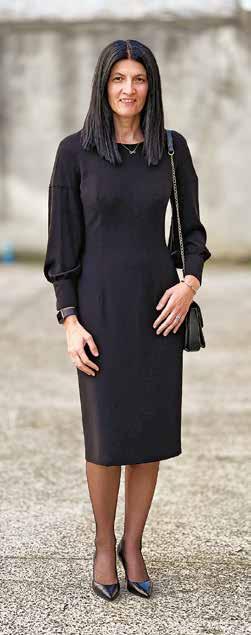
How have communications been impacted by the new economic crisis, inflation and war?
MAB: In these turbulent global challenges, the challenge is enormous for all employees in the communications sectors, regardless of the company or agency. Communicators must be the first to understand the expectations of stakeholders and create their own story in such a way that they preserve the reputation of their brand or company, while this will simultaneously enable them to advance in these dynamic times.
Leaders of PR agencies expect increased profitability in the year ahead, despite economic and geopolitical conditions and the crisis of talent. What do you expect of the year ahead?
TB: This year will be challenging, but it’s “not our first rodeo”, as they say. Economic experts consider recession unavoidable, and we know that the world is constantly taking hits in a geopolitical, energy and economic sense. I think we have to be cautious and realistic in our optimism. Partnerships are key: understanding, listening and mature decision-making. The most important aspect for the profession is to maintain responsibility and ethics, but also to exert even greater efforts to ensure the quality and efficacy of communication, such that they remain at a high level despite the aggravating circumstances and potentially reduced budgets. We thus add to the credibility of what we do and invest in relationships with clients that are enduring and sustainable.
MAB: I agree with Tamara and believe that, regardless of the size, all companies, including agencies, will focus a lot on internal communication, as they want to retain their employees and for them to be as satisfied as possible. I also believe companies will have to more clearly express their views on some issues that are generally important, including diversity, climate change and even political circumstances. That’s why they will continue to maximally inform their employees with regard to all topics that concern their company.
Communications 2023 13
When it comes to communications, I don’t think it will ever be possible to replace humans and our ability to adapt
Seeking Smart Solutions
Last autumn saw agency SVA establish a new organisational structure and new management roles, which reinvigorated the team and brought new driving energy and optimism, though they still believe that there are no small clients, difficult projects or impossible deadlines


All four of our interlocutors not only believe that their work will continue to be important in the years to come, but also that it will develop further, encompassing internal, external, corporate, promotional, CSR and all other communication needs through which companies want to share their purpose.
MAJA SUBOTIĆ, Managing Director TIME OF THE ECO-ECONOMY COMING
The times ahead certainly won’t be less complicated, on the contrary. But we nonetheless believe that human capital, creative thinking and innovation are inexhaustible, which is why we entered 2023 with optimism. The reputation of the marketing industry is often debated, with its performance undermined, detracting from the need for it, with “threats” from
new trends, gaming, artificial intelligence...
Given that communication and creativity are the elements used to weave the real marketing “craft”, I’m certain that the existence and success of professionals from our profession is beyond question, due to the very fact that even ancient civilisations recognised and highly valued writers and artists in their society.
Communications 2023 14 Business
Companies can no longer sell whatever brings them the most profit. Smart solutions are being sought
MAJA SUBOTIĆ
MARIJA JOKSIMOVIĆ
IVANA PETKOVIĆ
MILENA SIMOVIĆ
The communication system is a factor that sets humans apart from other creatures, and cognitive abilities, and the ability to adapt to the most diverse conditions, provided humans with an evolutionary advantage that today ensures humans rule the world. Although we cannot, as the human collective, boast of the thoughtfulness of our actions, especially over the last few years, what is nonetheless positive – even if it is only in marketing today and has been conditioned precisely by accelerated digitalisation and various restrictions imposed during the COVID-19 pandemic – is the abandoning of the classic approach of “selling fog by the kilo” to increase consumption and opening up to the ever-increasing eco-economy trend. Today’s consumers communicate with one another independently, create independent reviews and debate products/ services, launch their own content and increasingly come together around sustainable solutions, while Generation Z, with its progressive and uncompromising attitude to its own convictions, is growing up at an accelerated rate and is immune to traditional marketing. Companies can no longer sell whatever brings them the most profit. Smart solutions are being sought, while the focus of communication is on brands, i.e., on the system of values that companies share with a much wider audience than their own client group.
Our work continues to be important and is developing precisely in this context, encompassing internal, external, corporate, promotional, CSR and all other communication needs through which companies want to share their purpose with the world, and we need that more than ever today, from the individual to the collective.
IVANA PETKOVIĆ, Creative Director
WE’RE APPROACHING A REBOOT
Have you noticed how the most successful people are almost never the most educated, the prettiest, the most talented? They merely worked the hardest to realise their own dreams. I believe the creative director is not the most creative member of the team, but that they know their team very well, learn
from each member every day and know how to get the best from each of them. They know how to inspire the team and always have an idea that they can put on the table in order to work with the team and come up with an idea behind which the whole team can stand.
If an idea is good, there is no reason to reconcile anyone. Money will come as a consequence, but that mustn’t be the inspiration. The creative director is always at the service of creative workers, the accounting department and clients. And they must be
In terms of the joy of new challenges, experience is precious in our profession, but the real beauty of this job is that it makes us young every day. We create campaigns for everyone, from children to pensioners, and that compels us to familiarise ourselves with all their
the most creative in understanding everyone. When it comes to the inspiration, trends come and go, which is why I believe we will all experience a reboot. It is paradoxical that, no matter how much innovation we have in our heads, we have still concluded that everything has already been seen, and that is matched by how much the world, and therefore communication, has been accelerating in recent years. Our basic power lies in the fact that we are capable of finding inspiration in everything. However, before and after everything, we are still addressing people, their needs and desires, and that’s something we shouldn’t forget regardless of that which time, trends or new formats impose on us.
MILENA SIMOVIĆ, Client Service Director
EVERY PROJECT IS A NEW ADVENTURE
A unique approach primarily implies an openness in communication with the client, understanding all their needs and the challenges they face; putting yourself in their shoes. With such an approach, we work with equal enthusiasm on projects for large and small clients; with good organisation we render seemingly impossible deadlines possible, in our mutual interest, and we manage to develop love for those brands that are not the closest to our hearts.
aspirations and affinities. Circumstances are changing; the nature of our work and the pace at which projects are implemented is very different and more challenging, such that every new project is a new adventure. And despite many years of experience, I still learn something new every day.
MARIJA JOKSIMOVIĆ, Media Director
EVERY MEDIUM HAS ITS OWN AUDIENCE
Social media has been in focus for many years, and contributing further to that fact are influencers, who are increasingly engaging in monetised collaborations with brands. It is unquestionable that brands benefit from cooperation with influencers, but it is important for all such collaborations to be natural; for harmonisation to exist in terms of purpose, approach and communication method. If this is not the case, then the trust of the public is lost, which can harm both the brand and the influencer.
Traditional media and social media certainly aren’t mutually exclusive. The perception of users, and the way both forms of media are consumed, differ completely, and they satisfy different needs of users, but traditional media will be forced to find new ways of generating revenue.
Communications 2023 15
It is paradoxical that, no matter how much innovation we have in our heads, we have still concluded that everything has already been seen
We create campaigns for everyone, from children to pensioners, and that compels us to familiarise ourselves with all their aspirations and affinities
Traditional media and social media certainly aren’t mutually exclusive
Aleksandra Sekulić, Account Director, Direct Media
Being AuthenticIs Important
Decades of experience at the regional level, coupled with cooperation with clients from all industries, has provided agency Direct Media with a secure start. The transparency of the processes behind the methodology that forms the basis of the strategy this agency creates is the foundation upon which it establishes successful communication

Direct Media’s Aleksandra Sekulić reveals how the speed of change in the communications sphere dictates the speed of the agencies that deal with that change, emphasising that only well-prepared professionals will be able to recognise those changes before they become mainstream.
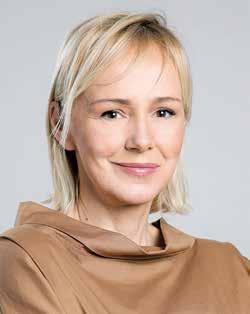
As excellent connoisseurs of the local market, but also global trends, Direct Media has spent the past two decades creating campaigns tailored to each individual client. Does the credit for that belong to your holistic, comprehensive approach to every project?
Observing the bigger picture, not only the media picture, but also the economic-political one, while following trends and harmonising with them, are all part of a holistic approach, which is indeed important, but not the only step. Starting after everything else is the “if” process, in which the potentials are tested, and the direction in which we develop the client’s strategic communication approach only becomes clearly defined when we reach the bigger picture and that “if” becomes “is”. The team of dedicated professionals, and the partnership we build with all our clients, definitely contribute to this.
Modern communications with a realistic understanding of the effectiveness of both offline and online advertising are Direct Media’s strategic direction. How difficult is it to strike a balance and find the right measure in that?
It is first and foremost necessary to precisely define offline and online media. Television is no longer merely a medium for the placement of various programmes, but rather also platforms.
It was more than ten years ago that we developed a series of in-house tools that enable us to monitor generational trends across various industries
Mobile phones have become devices through which TV content is fully available, for example via the EON platform. Radio has adapted to the digital environment, while outdoor advertising is being rapidly digitalised.
These changes primarily relate to ATL media. Not to disregard the fact that BTL activities have moved into the digital sphere over the last three years and that retail is a special medium, with ever more channels to present communication that supports not only sales, but also brand image. When we
establish things in this way, it becomes clear that modern communications are fluid and that we cannot place them in limited frames.
You are the first agency to have conducted research for Generation Z and Millennials. To what extent did that ease the creating of campaigns for clients and the designing of messages that more quickly and easily reach target groups?
It was more than ten years ago that we posed ourselves the question of whether we are ready for the coming generation. This prompted us to developed a series of in-house tools that enable us to monitor generational trends across various industries. It was shown that Generation Z expects a brand to have a purpose, for them to share similar values with the brand and to jointly make a difference when it comes to the value system. Transparency and authenticity are essential for a brand to gain their trust. Sharing opinions, comments and reviews are part of their personal engagement with a brand that they feel close to. The lack of attention, on the other hand, has led to a transformation in communication, to – cut the story short and be done with it.
And, finally, it is no longer demographics that define the target group, but rather the communities of interest to which they belong. There is a really thin line between likes/slaps (the real thing) and cringe.
We are currently preparing new research that will relate to the so-called “tribal” differences that exist within the scope of generational groups. Striving for authenticity dominates not only among Gen-Z, but also in the generation that comes after them (Gen Alpha). We’ll see where this research will take us.
Communications 2023 16 Business
Kurtović, Managing Director, Fusion Communications

DigitalIsTheStandardWayOfLife
At Fusion Communications they believe that agencies have to evolve, listen, learn and adapt to the needs of their clients. The main difference is that this is now on a high-speed train, as opposed to the slow track of just a decade ago

Traditional media companies have adapted to new digital technologies, so companies and brands will utilise all of these possibilities in order to optimise their communication and campaigns. This has brought us podcasting, influencers and so many different forms of social media, followed by different formats on each one...
In order to meet the needs of your clients, you deal with strategies, planning, trends, platforms, and the creation and disseminating of messages. Are those needs and expectations of clients changing and, if so, to what extent?
The market is ever-changing, creating a fast-paced environment in which every link in the chain has to be alert and ready to respond to new demands. The borders of communications services have become blurred and with new trends and market demands come new needs. The pandemic and all other situations around the world had a huge impact - not only on the way we communicate, but also on the way audiences receive our message. This requires agencies to evolve, listen, learn and adapt to the needs of clients, as we always have. The main difference is that this is now on a high-speed train, as opposed to the slow track of just a decade ago.
The previous three years, since the outbreak of the pandemic, have been marked by the intense growth of the digital sphere. Will that trend be maintained throughout 2023 or will brands and companies slowly begin returning to traditional media?
Brands and companies have never abandoned traditional media, and I truly believe that this won’t change in the foreseeable future either
Absolutely! I think we can stop referring to digital as something new, as it is now the standard way of life. And this applies not only in the aspect of communications, media and marketing, but also in business and utility for everyday life. However, brands and companies have never abandoned traditional media, and I truly believe
that this won’t change in the foreseeable future either. Along with all this, we have gained additional outlets to differentiate our message and even more precisely target our audience. We see media taking on different forms – so now we have podcasting as a media outlet, influencers, so many different forms of social media, followed by different formats on each one... Traditional media companies have adapted to new digital technologies, so companies and brands will utilise all of these possibilities in order to optimise their communication and campaigns.
Technology has, among other things, provided you with numerous tools, additional channels, two-way communication, and the faster and easier sending of messages that now precisely target the intended recipients... But what has it taken away from you? What has been made more difficult?
I suppose that, just as everything has its positive and negative sides, so does the surge in the use of technology. I could talk more about the positive side, including the vast possibilities we have received, new knowledge and so on. However, I would point out two difficulties that have come from this: a lack of empathy and a lack of face-to-face communication, on one side, and a short attention span on the other.
The overwhelming abundance of messages and content have made it challenging to get your message heard and make it stick. The fast pace is a difficulty to which we not only have to adapt the pace of our work, but also the way we communicate our messages.
Communications 2023 17
Nevena
Business
The Essence Of PR Remains Constant, EvenWithRapidTechnologicalAdvancements
The professionals at the Right agency gladly accept new communication tools and channels, but they do not forget the basic function of public relations, which involves establishing and nurturing positive relations between the communicator and the target audience

Trends in PR are changing faster than ever before. PR professionals are constantly embracing change, all with the aim of making the most of them to improve their communication strategies and achieve better results.
The Right Agency is known for many years of successful work with a large number of clients and cooperation with the media. What is the secret of your success?
As an agency with two decades of tradition, we have a responsibility to ourselves but also to our clients, the media and the public to always keep up with the news. We achieve this with the help of our expert teams, made up of PR professionals with rich experience from various spheres of our profession, who lead Right to new business victories. For successful business nowadays, we must possess one of the most important skills of the 21st century - adaptability. On the other hand, good and timely communication is necessary for success. For this very reason, maintaining and upgrading relations with the media and clients is the foundation of our agency’s business.
Digitalisation has brought you new tools, communication channels, new target audiences, speed, interactivity... How much more challenging, exciting, creative does all this make your job...?
New communication tools and channels give us a handful of new possibilities in terms of creative expression, diversity and
precision in communication with target audiences. Today, information is distributed through digital channels at an unfathomable speed, and in this regard, expectations from agencies are high and imply expediency and precision in response and reaction, but also enable more intensive adoption of trends necessary to realise various PR activities. In short, digitalisation has brought numerous new opportunities for PR and requires us to constantly evolve, which makes our already dynamic profession even more interesting.
The PR industry is changing at such a speed that it is difficult to predict in which direction it will develop. Are there, however, any trends that you would single out?
Trends in PR are changing faster than ever before. PR professionals are constantly accepting change, all with the aim of making the most of them to improve their communication strategies and achieve better results. As one of the trends, I would single out Artificial intelligence, which brings new challenges in public relations, but also opportunities in terms of automation of routine tasks. All this allows PR professionals to focus on creative and strategic activities.
I would also add that the basic function of public relations involves establishing and nurturing positive relations between the communicator and the target audience, so with all the changes that technology brings to us the essence of PR remains unchanged.
Communications 2023 18 Business
Miloš Duduković, COO, Right
Artificial Intelligence brings new challenges in the function of public relations, but also opportunities in terms of the automation of routine tasks
Proud Of A Small Jubilee
Headline&Dkit provide services in the field of communications, but what sets them apart are their advisory and practical approach to each client. They believe that their advisory services are much more important now because the channels and the way to approach target audiences have changed so much

New communication channels make our work more dynamic and, to put it colloquially, quick-thinking, but it’s still important how we think and analyse, and what we advise our clients - this is the message from Headline&Dkit.
Year after year, and here you are celebrating your 15th birthday, proud of more than 50 satisfied clients, 300+ press conferences, 1,000+ press releases... But Headline is much more than that... All of us at Headline are really proud of this small jubilee. Not only because we have survived and expanded in turbulent times, but above all because of our team of dedicated people and clients whom we support in communications throughout the years. I believe that the unification with the agency DKit, which specialises in digital communications, has contributed to this, so today we deal with communication with the media, the organisation of events, crisis communication, digital marketing, web site development, a whole set of digital communications services, up to relations with professionals and an influential public. And since, I have listed everything with which we can compete on the market, I want to single out what, in addition to the people in our team, is most important. We provide services in the field of communications, but what sets us apart is advisory and a practical approach to each client.
What has changed in communications, apart from the channels?
Now the approach is much more individual and each strategy must be adapted to
the specifics of the industry, the market, the current economic or epidemiological situation and the business goals of the client himself. People today react and

communicate faster, news is changed faster, as are posts on social media. In the flood of bad news and the general atmosphere of impending new disasters, it is really difficult to draw the public’s attention to ordinary stories about some corporation helping a vulnerable person, or to promote a new coffee, cheese or other brand, without it being an ordinary advertisement. Because even that paid advertisement or narrative must have content that stands out and attracts people.
If they want to be relevant, do companies and brands need to appear on all channels and formats where their customers are? Brands need to appear on channels that their target groups follow, but this does not mean that they should go to everything or everyone that is trending at that moment, but rather start from researching what their target group really follows. The trend is that the most important thing is the number of clicks, and not whether the text was actually read by a potential customer. On the other hand, in our market and the region, there are really great creative minds and ideas from which all kinds of things can be created that attract attention on Tik Tok, on FB, and on news sites.
Recently, I saw one smart solution from a known food brand that reproduces well known sound of consumption of the product. For me, it provoked a clear emotional association to that brand more than all their advertisements in recent years. So, we should not only think about the channels, but how we will produce a “feeling of hunger” among those we need to reach.
Communications 2023 19 Interview
Marina Grihović, Founder and Director of PR and Media Consulting Agency Headline and Digital Communications Agency DKIT
The strategy must be adapted to the specifics of the industry, the market, the current economic situation and the client's business goals
Andrea Ivančević, Rocket Flow Founder & CEO
Understanding The Client Is Vital
When working for a client that has a “thankless” product or engaged by a company with “catchy” services, Rocket Flow approaches the task with the same dedication, whether the company has been hired for design work, the development of websites and applications, digital marketing, or for photo and video production
If passion and love for the work didn’t exist, we wouldn’t be engaged in it, and hard work has built us into what we are now ~ says Rocket Flow Founder & CEO Andrea Ivančević, before revealing the tried and tested formula that helps her and her team come up with unique solutions.

Michael LeBoeuf said that every company’s greatest assets are its customers. Are your clients your greatest asset?
Clients are certainly precious, so I agree with Mr LeBoeuf to an extent, but I believe that employees are nonetheless a company’s greatest assets. The reason is simple: if we don’t take care of our employees, they won’t take care of our clients. The most important thing for me is that good communication exists within the team and that I enable each team member to develop personally and professionally, in order for us to be able to jointly achieve all the goals we are striving towards. And then, when we have lots of work, but also when lean times come, the most important thing is the kind of environment you have and with whom you work. When it is pleasant at work and you have excellent communication with colleagues, results cannot be lacking.
You believe that anything can be achieved provided you bring passion, love and diligence to the job?
Thanks to our attitude towards the work, our experience and good mutual relations, we easily dedicate ourselves to what we do. With developed working habits, collegiality, patience and good organisation, we really can do everything! There is no lack of creativity in such an atmosphere, and that ensures that we enter projects
interested and full of ideas, even when that seems impossible.
To what extent is your integrative approach responsible for you being able to turn every task and problem into a unique solution?
We have a proven formula for achieving such solutions: when we work for XY client, we familiarise ourselves with the organisation of the work of the firm/company, we “integrate” as though we are their internal
marketing team and try to understand as much as possible their entire operational method and process, their visions and goals, in order for us to use the acquired knowledge and feeling to reach simple solutions for specific requirements as easily as possible. That is a very important segment for each of our services, whether that’s designing and developing websites and applications, digital marketing, or photo and video production...
We will cite the example of domestic company Tehnoplast, which produces distribution boxes. That doesn’t sound very creative, right? In order for us to understand how best to perform the work for which we were hired, we went to their production facilities and familiarised ourselves with the way they work and the needs of their customers. Thanks to that, we were able to present their product in the light it deserves, such that it even attracts the attention of those who aren’t interested in such content, while at the same time piquing the interest of customers and precisely explaining the functionality to technical people.
When a product is “thankless”, in the sense that it doesn’t attract the attention of the general public, it is necessary to set about researching, and then to get to work. We also cooperate with clients that offer “catchy” services or products, which enables us to awaken our inner child and play around with colours and general design, which is the case with our work on the project for Aqua Park Raj in Vrnjačka Banja.
It is vital for us to understand as precisely as possible the needs of our clients, in order for us to be able to respond adequately and simply to their requests, while at the same time achieving a sense of personal satisfaction over a job well done.
Communications 2023 20 Business
When a product is “thankless”, in the sense that it doesn’t attract the attention of the general public, it is necessary to set about researching, and then to get to work
The Future Is In Digital Communications
In the year behind us, Smartpoint grew in all the services it offers, especially in the digital marketing sector. Many of their projects go far beyond the borders of the Balkans, which is why Sony, Nespresso, Epson, Pandora, Xiaomi, Nvidia and other big brands have been trusting them for years

Regional coverage, speed, knowhow, creativity and professionalism are just some of the values recognised by our partners with whom we have long-term cooperation ~ says Đorđić, before revealing which trend in digital marketing will be more or less imposed in the future.

What are the benefits that digital communications bring to companies?
Digital marketing offers extraordinary efficiency for companies. This is an area in which investment is completely transparent, but so are the results. Based on the results, changes in campaigns and communication can be made almost in real time, which is especially important for highly competitive industries struggling in a ocean of red ink. In addition, digital marketing perfectly combines creativity and measurability. Unlike other marketing or PR activities, with digital marketing we can measure many key parameters and can easily compare them with industry and local standards or results from previous months or years.
Finally, digital marketing is also agile marketing. If you see room for a good idea or if you want to react to a global or local trend, you can do it extremely quickly. It is only up to you to choose a high quality partner.
In your business, everything develops and changes quickly, especially trends in digital communications. What awaits us in that field in 2023? Does the future belong to digital communications?
The future has long been in digital communications. Whether we like it or not, the device with which we spend the most time - the mobile phone and/or computer is proof that we browse more digital content sources than any other. The Covid-19 crisis only further boosted this, so now we are
talking about which trend within digital marketing will be more or less imposed in the future.
We expect it to be video and e-commerce. As early as 2022, the accelerated transformation of static content into video began. Today, we expect video content to become dominant in 2023 and to almost completely replace static content in 2024. In the e-commerce business, companies that have partners by their side whose expertise is measured in millions of euros invested for their clients with great ROI, those companies have a bright future and perspective.
What markets do you cover?
Smartpoint is a regional agency that covers the markets of Southeast Europe. We are proud of the fact that we are the largest independent marketing agency in Romania, in the top five digital agencies in Serbia, that we are making great growth in business in Croatia, and so on.
As 2022 was an extremely successful year for Smartpoint, we decided that for all of your readers who send an email to milivoj.djordjic@smartpoint. rs by 28th February 2023, we will organise a free training session in the field of digital marketing. The topics are “Video as the future of digital marketing” and “Trends in e-commerce advertising that you must not miss”, and the training will be held on 17 th March 2023 from 10 am to 1 pm.
Communications 2023 21 Business Milivoj Đorđić, GM, Smartpoint Adria
We are the largest independent marketing agency in Romania, we are in the top five digital agencies in Serbia, and we are experiencing great growth in Croatia
Savić Rastovac, Executive Creative Director, McCann
LoveisTheKey To Enduring
McCann is the nucleus from which knowledge and expertise have developed over the course of 25 years, resulting in a system that today brings together experts from various fields of communication, media, production, digital, creative, strategic, and every new addition that is joyfully adopted and developed
is there anything that has remained the same, anything that is a permanent fixture? We know from experience that the world and everything in it is in a constant process of change, but ideas and love are what endure and remain. We believe deeply that the best ideas emerge from love: love for life, love for people, love for new challenges. It was with belief in our people and the power of creative energy that we started working 25 years ago, and we believe that this love is the key to our durability.
McCann, and later the I&F Grupa, laid the foundations of the profession and the entire industry from its very first days, establishing standards, bringing innovations, educating personnel... Can your pioneering spirit still be felt today?

Our passion is continuous learning and research; curiosity is one of our key values, and I would say that courage is thus a character trait. We have always been guided by these convictions - says Jana Savić Rastovac, emphasising that all of this has contributed greatly to the successful

work of the agency and the creation of campaigns that remain remembered for years.
You are this year celebrating 25 years of doing business. How do you view this “journey” of your agency? We know that everything has changed over this quarter of a century, but
McCann is the nucleus from which the development of knowledge and expertise has gradually created a system that now brings together experts from various fields of communication, media, production, digital, creative, strategic and every new addition that we joyfully adopt and develop. Our passion is continuous learning and research; curiosity is one of our key values, and I would say that courage is thus a character trait. We have always been guided by these convictions and they are probably among the fundamental reasons for our success. Knowledge guided by the determination that we can do as well in our region as can be done anywhere else in the world, the courage to experiment and the audacity to build brands with clients in a different way – these are responsible for us being labelled pioneers. We are very proud of this. Generations of communication experts have grown up in our agency and contributed
Communications 2023 22 Business
Jana
to the development of the entire industry with their work. Our campaigns have often determined annual trends in advertising, moved society to discussion and action, questioned the limits and possibilities of the media, created surprising partnerships. Our leadership position has always obliged us to learn more and try harder. That remains the same today. We believe in the strength of ideas and the power of our industry to contribute to the betterment and development of the communities in which we live and society as a whole. We want good things for people, business and planet Earth, which is our shared home.
It isn’t easy to be prepared for all challenges and tasks, to be even more innovative and relevant in all the areas of activity you deal with, but you nonetheless succeed... Is it enough to follow world trends or do clients still expect more?
It is today actually very easy to follow a trend as information and use its appearance for the purpose of causing a short-term sensation, and what is demanding is to use a trend to enrich the true essence of a brand. What’s most important is comprehensive understanding and continuous monitoring of the bigger picture: changes in society, lifestyle, movements in culture, politics, science. What sets good agencies apart is thorough analysis of the broader context and timely use of the conclusions of that analysis. Strategic analysis and planning are among the most important services in creative and media agencies in communications generally. We know how important a valid strategy is and how demanding it is to build a brand
that will live with, despite and after trends. We love such tasks the most. Our brand sometimes also becomes a trend.
You are known for your longstanding partnerships with companies and brands that bring change in both their own industries and society as a whole. Do you together change the world and make it better? We are very proud of our longstanding partnerships with excellent companies and brands like Mastercard, L’Oréal, Coca-Cola, mts, Bambi. We know how precious a relationship of trust is and what kinds of results emerge from such a relationship and the joint creation process. We are the creative home for some of the most important brands on our markets, which is really a great satisfaction and confirmation of the way we work, but also huge inspiration for us to always move forward, together. The world needs good. The world needs understanding and creation. The world needs good ideas. We share these convictions with our partners and that is the first and most important step in any development.
How do you see the current and future position of your agency within the I&F Grupa? Do you all work together on the further development of the agencies in your system and on strengthening their connection in the Adriatic and Nordic regions? All families look alike, and one thing makes ours special: it was born of love for creation and discovery. In it different languages are spoken and different topics discussed, and we all understand one another wonderfully. Multiculturality and diversity of knowledge

McCann CAMPAIGNS ARE ICONS OF ADVERTISING
Agency McCann opened in Belgrade in 1997, and subsequently also in the countries of the region, as a full service from which media agency UM and the first digital agency on our market, Drive, gradually separated. These agencies are all among the top five on their respective markets and today form one family, I&F Grupa, which operates in 12 Adriatic and Nordic countries and employs more than 600 professionals. Over the course of its 25 years of operations, some of today’s leading artists, writers and experts in various fields have passed through this family. During this quarter of a century, exceptional campaigns have been created that have become icons of advertising. Many of them have received prestigious global awards, while McCann Beograd and Skopje were among the region’s first agencies to receive the most important Cannes Lions, and the 25th anniversary was crowned with the winning of five Cannes Lions by the McCann Stockholm campaign that starred world-famous actor Alexander Skarsgård.
make us a partner that can support, lead and achieve numerous goals. We are always alert to the world around us; we observe with eyes and hearts wide open; we create services for our clients by monitoring the development of business and people’s needs, sharing knowledge with one another and with our partners, convinced that this is the only way we can progress.
Communications 2023 23
Bogdanov, Managing Partner and Founder, Vekol DHC
The PowerOfVariety
DMC Vekol today has an impressive portfolio of hundreds of loyal clients, including dozens of the biggest names in the corporate world, such as STADA, Deutsche Telekom, Walt Disney, KPMG, Microsoft etc., and has received numerous international accolades

It was almost 25 years ago that Tanja Bogdanov embarked on an uncertain adventure as a pioneer on the market of receptive business tourism in Serbia, today her DMC Vekol is recognised as company that has the power to influence the MICE landscape in Serbia and beyond.

You’ve amassed a valuable “collection” of awards and accolades over the course of your career, but this latest one – that saw you declared “The Most Influential Person of 2022” - is nonetheless something special, right? Congratulations!
Thank you. This flattering title and confirmation arrives just in time to wrap up a very important career stage in my life, in which
Variety is powerful and a supportive working environment that resonates with your personal values and beliefs represents an endless source of new ideas
I started to receive wide appreciation as a professional in Southeast Europe. Being officially recognised as someone who has the power to influence the MICE landscape in Serbia and beyond comes as a great honour, but one with even greater responsibility. Leading one of the very few destination management companies that has made it all the way through the pandemic, I recently met growing interest in telling the world my business story and sharing some valuable learning outcomes and life lessons.
You had an enviable career at a large company. What compelled you to wade into
Communications 2023 24 Business
Tanja
Photo credit Nebojsa Babic
entrepreneurial waters and become one of the pioneers of receptive business tourism in Serbia?
I started my career in a large telecommunications system – which served as a great stepping stone for a young and ambitious lady in the business world. That was a very comfortable position, perhaps even too comfortable for my taste. I very soon felt the urge to pursue my drive for entrepreneurship and felt a need to own my decisions – with all the risks and rewards that entails.

And so it was that, almost 25 years ago, I embarked on an uncertain adventure, pioneering the market of receptive business tourism in Serbia, which was then just emerging – learning, growing and progressing with it. Despite of all the bumps in the road, I never regretted it – DMC Vekol today has an impressive portfolio of hundreds of loyal clients, including dozens of the biggest names in the corporate world, such as Deutsche Telekom, Walt Disney, KPMG, Microsoft etc. and, just like you said, I have received numerous international accolades.
The organisation of congresses and large business events for multinational companies is the most challenging job in tourism. Does this mean that business guests are the most valued tourists in developed countries?
Large scale business gatherings are rightfully considered the crème de la crème of international travel. On average, a typical business tourist usually spends between 1,000 and 2,000 euros per day on a destination. This fact alone answers your question.
Do you believe in the development opportunity of congress tourism in Serbia? Do you believe it has the potential to become one of the main drivers of the national economy and thus deserves to be in the national strategic focus?
Serbia is at the very beginning of its life cycle as a modern business destination; it has only just emerged on the international market. I deeply believe that congress tourism, together with an entire chain of MICE-related industries, is on its way to becoming one of the main drivers of our economy and that, as such, it deserves to be in the national strategic focus. I would like to see the MICE industry being perceived as creating new business opportunities and supporting the
local economy, rather than a wasteful, showy distraction for wealthy companies.
For those of us who are not from the profession, the hybridisation of business tourism is a new term, while you realised your first hybrid event way back in 2011. What kind of events and formats does this relate to? People often tend to evangelise new trends, but at DMC Vekol we entered hybrid mode long before it became a necessity – from advanced mobile apps that helped us design virtual event experiences from scratch to webcasts, live streaming etc. The outbreak of the pandemic only compelled us to accelerate our digital makeover and go one step further by experimenting with the fully online layout of events. In short, events and experiences are no longer bound by physical spaces and we help clients create the unique audience journey that will grow their revenue through the power of experience design.
Despite the advance of technology, you still believe that an idea forms the basis of everything and that creative and dedi-
cated people are the greatest asset of any company, particularly those companies that deal with communications?
Reinvention is what keeps the classics alive. Destination management is a multidisciplinary field and just like in any other service-oriented industry, human talent is key. My core commitment is to push beyond mediocrity – and we do that by hiring only the best and most diverse talent out there. Variety is powerful and a supportive working environment that resonates with your personal values and beliefs represents an endless source of new ideas.
After working for more than 20 years, you’ve also introduced something new: consulting services in the field of business event organisation. That will serve to fortify your market leadership position, but will it also create some new business opportunities?
DMC Vekol Consultancy® is a natural extension to the 25 years of cross-functional experience we have in business travel and a strong solution-oriented mindset that has kept us in the game to this day. Together with my experienced and well-trained team, I offer guidance and actionable solutions to the problems that companies in this or related industries may face in obtaining their ROI and further developing their business processes. Having worked closely with Fortune 500 companies, we offer a “bird’s eye view” into a client’s event, suggest adjustments that will help them take full advantage of different perspectives and a better understanding of their own needs.
Communications 2023 25
The MICE industry is creating new business opportunities and supporting the local economy, rather than being a wasteful, showy distraction for wealthy companies
Photo credit Nebojsa Babic
Digital Is Still On The Throne
From a three-person team strictly focused on PR in IT, they had grown into a full-service marketing agency, a member of the GlobalComm PR network, which, apart from Communication, has Event organization, Trade Show booth building, BTL and Design as its main pillars
Is there another turbulent year ahead of us? Will digital continue to occupy the throne? What is the fate of social networks, video formats and influence marketing? What will virtual reality and artificial intelligence bring us? Bojana Stanković reveals all.
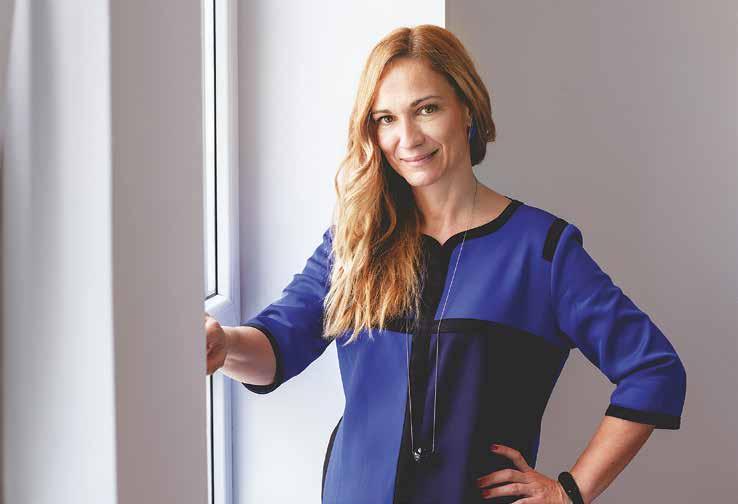
Instead of listing everything you do, or boasting about successful projects and important clients, people from Smart Vision agency would rather talk about what sets you apart from the rest. Why is that? We don’t like to talk about the what, but
rather want to explain the how! About the way we approach projects and clients, the energy we put into the process of creating a strategy and coming up with ideas, or the energy with which we „carry“ the communication and the emotion which comes after the results. All of that depicts the work of an excellent team I am extremely proud of. It is a compact, creative team with a lot of talent, led by people who have been at Smart Vision from the very beginning.
Communications 2023 26 Business
Bojana
Stanković, Head of communications, Smart Vision
For 15 years, we have continuously been growing and developing with the same passion that we had at the very beginning
Last year you have marked a 15 years jubilee and opened a new office in Dubai. What are your impressions and could you tell us more regarding the future plans and activities?
The year we left behind marked a great jubilee. For the last 15 years, we have continuously been growing and developing the agency and continue to do so with the same passion that we had at the very beginning. From a three-person team strictly focused on PR in IT, we have grown into a full-service marketing agency, a member of the GlobalComm PR network, which, apart from communication, has event organization, Trade Show booth building, BTL and design as its main pillars. And what better way to celebrate such an important jubilee than with a „smart vision“ and expanding outside the borders of our region. For that reason, last year we opened an office in Dubai, covering the Middle East, where plan to convey our experience, energy and passion towards work throughout a new meridian, ready to take on new challenges.
In business, you see not only clients and requests, but partners and ideas. Does this mean that instead of the “you give us the brief, we give you the project” model, you choose to search together with clients for the best solutions that push the boundaries?
The fact that among our clients we mostly have companies that we have been working with for a long number of years, some of them from the very beginning, allows us to do so. We have grown together, and throughout the years have worked on building mutual trust, as well as our friendship. We understand each other’s needs, but also possibilities, so we can easily and quickly react to every opportunity and demand of the market, in communication but also all other spheres of marketing.
Many of your colleagues point out that the biggest enemies of market communications are lack of ideas, lack of time and lack of money. How do you at Smart Vision deal with these challenges?
I can’t agree with the lack of ideas. The ideas are here, following the development
of technologies and modern communication channels.
Sadly, there is never enough time. The creative process needs time, and the main challenges we face are usually short deadlines. Fortunately, one of the main virtue of our team is speed, and so far we have successfully managed to win the race against time. It is very important to create a good balance and know when to draw the line.
And when it comes to lack of money, we have all faced that challenge at some point. It is a well-known fact that marketing is usually first on the chopping block when it comes to cuts during a big crisis. But, a long time ago wise men from our industry made a nice comparison between advertising and the flight of a plane. When the engines go off it won’t start to fall immediately, but will start to descend at some point. Given that PR today is mostly a commercial item, one can say that in our case the same will happen if investments stop coming in. We who live and bread communication know that fact well and we are here to educate the public as well as our clients.
Despite all that, as someone who has spent 20 years in communication, I have to give my personal and professional opinion – great, successful communication projects are not always backed by big budgets, but by big creative thinkers and professional individuals. No one said this job is easy!
Digital holds the first place in the presentation of content, whether it is about sales or influence profiles. Will it be the same in 2023? Can we expect some new trends in the sphere of modern communications? Another turbulent year is ahead of us. Digital will continue to hold the throne, but there will be some changes. Social networks are facing some challenges, from the legal ones which are limiting their planned growth, like Tik-Tok is facing, or the fall in interest Instagram is facing, to some new players coming onto the scene, like BeReal.
The short form will remain dominant. The budgets for influencer marketing will continue to grow but will be more focused on long-term cooperation with more credibility.
Virtual reality and AI will continue to affect the marketing landscape and even the communication of digital channels in 2023.
Web 3 is here and we must not leave it out. It will bring big changes and shape further communication whether we are ready for it or not.
All in all, the trends in communications, shaped by technological progress, have led us far from the traditional press releases from which it all started.

Communications 2023 27
Successful communication projects are not always backed by big budgets, but by grat creative thinkers and professional individuals
A Partner With The High-QualityFactor

Nova Concept is a young company for whom it is important that the client is satisfied, not only with the service, price, business and results, but also with the relationship, to feel how important it is to them. In addition, they strive to provide their staff with the best working conditions

In addition to customer service projects, we are open for cooperation in the field of ‘mapping’, placing products on the online shops of clients from Germany, Austria and Switzerland, and in the distant future we would also like to implement an outbound project, they say at this Novi Sad start-up.
Your speciality is customer care, customer service and support, but you are open to other areas as well. What other services do you offer?
We are currently building a project where we solve customer inquiries from Germany, Austria and Switzerland and process a wide range of customer inquiries from a renowned online fashion shop. Our goal is for each contact to be processed carefully, in detail and within the given norm, because a satisfied customer will return to the same place.
Since we are a start-up, this is currently our only client, but we are working on expanding our business. We are open for cooperation in the field of ‘mapping’, that is, for placing products on the online shops of clients from the “DACH-region” (Germany, Austria, Switzerland), and we would also like to implement an outbound project in the distant future. Our focus is on inbound projects, and our goal is to become a platform with a high-quality factor for our clients.
You offer maximum flexibility, dynamism and space for innovation, but these are not your only advantages. What else makes you stand out?
We always provide our clients with maximum quality, and we also believe that honesty and transparency are the secret
of a successful partnership. When you are honest from the start and define your abilities, possibilities, vision, goals, and even the philosophy of your business, you will quickly recognise whether the client shares the same attitude. In business as well as in interpersonal relationships, there is a kind of chemistry that brings people together. And just as in interpersonal relationships there should be a strong foundation on which everything rests, it
is also necessary that there is an equally strong foundation in a relationship with a business partner. This is the foundation that we build first, and only after that do we continue with all our business. Well, that perhaps separates us from others to some extent.
It is very important for you that the client feels how important he is to you. It’s not common to do this kind of work with the heart, is it...?
You’re right, it’s not common, but that’s the only way we can do it. When you do something you love, then your heart guides you through work and through all actions, but that doesn’t mean you can forget about focus.
I believe that it is much easier to work with emotions, but only positive ones, because with them, with faith in your team, every problem in business and every fall is easier to bear. This applies to the work itself, but also to conversations with customers, because your mood will be transferred to them as well.
Communication is not just an exchange of words; communication is a complex instrument that includes many factors, from rhetoric and gestures to facial expressions and tone of voice. Every feeling is felt during a conversation, and that’s why we try to provide our workers with the best conditions so that they feel good and comfortable at their workplace. We want them to transfer that positive energy to their clients during a call.
An employer who is guided by his heart spreads positive energy to his team, and they then transfer it to customers through their conversations, so that at the end of the day, everyone is happy and satisfied.
Communications 2023 28 Business
Dragana
Tomić, CEO, Nova Concept doo
We always provide our clients with maximum quality, and we also believe that honesty and transparency are the secret of a successful partnership
Five Predictions For 2023

From sustainability claims to tech regulations around the world and greater emphasis on capability building: the WFA team share some predictions for what the next 12 months hold for brands
CAN REGULATORS END THE GREENHUSH?
Will 2023 be the year that marketers finally step up on climate change? Critics and most senior marketers agree that there is a big gap between what’s actually being done today and what needs to be done. The good news is that many at COP27 saw marketers as allies; creativity and innovation can help
deliver the consumer behaviour changes we need to meet critical climate goals.
Right now, however, too many marketers are doing too little while also claiming too much – hence the torrent of brands who have been caught out for greenwashing. This, in turn, has led to many to ‘greenhush’,and stay quiet about their green credentials.
2023 could be the year that regulators start giving companies the legal frame -
works and back up they need to be bolder about communicating their environmental efforts. In the EU, for instance, we might see the banning of standalone generic claims (e.g. ‘eco-friendly’, ‘biodegradable’) without recognition by an EU or other publicly-recognised eco-labelling scheme. Could tighter regulation help end the industry’s caution and help marketing be bolder in driving change on the scale required?
Communications 2023 29 World Federation of Advertisers
CAPABILITY FOR SUSTAINABLE GROWTH
Despite the current economic uncertainty, 2023 is – bizarrely – the perfect time for capability building. If consumers are likely to have less disposable income, they’ll need even more convincing reasons to choose brands – which is where enhanced capability within marketing teams can help. Getting serious about investing in upskilling marketing teams is also a key element in a successful and sustainable employee retention and attraction strategy. In times of unprecedented churn in labour markets, this is something clients won’t want to ignore. Expect to see more marketing capability academies pop up within client organisations in 2023.
COMPLIANCE DEADLINES FOR TECH BEHEMOTHS

After years of largely unregulated growth, big tech platforms will have to meet deadlines to comply with new EU regulations in 2023. The Digital Services and Digital Markets Acts will prohibit platforms such as Google and Meta from targeting ads to minors or targeting based on data revealing religious beliefs, sexual orientation and health.
They will also require them to be more transparent about their content moderation and open up their walled gardens so that advertisers can independently measure the performance of their ad campaigns. Much like GDPR, these new rules are likely to set new precedents for tech regulations around the world.
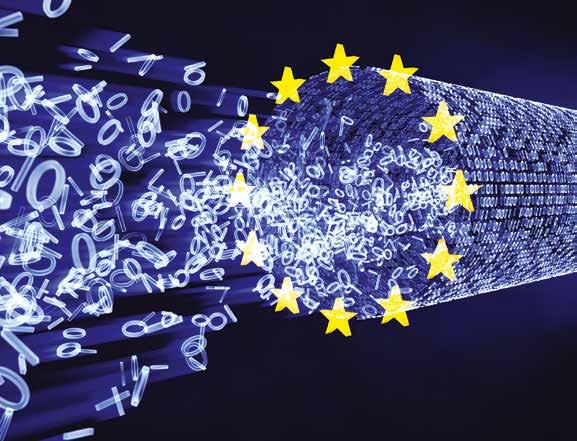
Communications 2023 Ime i prezime, funkcija 30 Interview
IS TIKTOK FACING A SQUEEZE?

TikTok’s exponential growth during and post pandemic has been a double-edged sword given its appeal to younger audiences. Because if there are two things Democrats and Republicans can agree on it is being tough on Big Tech and China.
Put that together with the ever-popular refrain for child protection and that puts TikTok squarely in the regulatory crosshairs. Data protection authorities are already reviewing its practices and with the EU DSA being implemented and the UK Online Safety Bill also due out next year, we can expect more scrutiny of TikTok’s data practices and probably more challenging headlines.
A NEW DAWN FOR DATA ETHICS?
As data protection and privacy regulation continue to put pressure on ad targeting and the market continues to ready itself for the death of the third-party cookies, there could be a new dawn for data ethics in 2023. With 90% of CMOs now saying that data ethics is a key priority for their organisation, 2023 will see marketers rethink their ways of working and lead the shift towards more ethical models of digital advertising.
Expect CMOs to focus particular attention on implementing data ethics principles, sharing these with their external partners and providers, moving away from hyper-targeted solutions and exploring the myriad of privacy-preserving technologies that are currently being developed on the market.

Communications 2023 Ime i prezime, funkcija 31 Interview

“Communication works for those who work at it.”
- John Powell
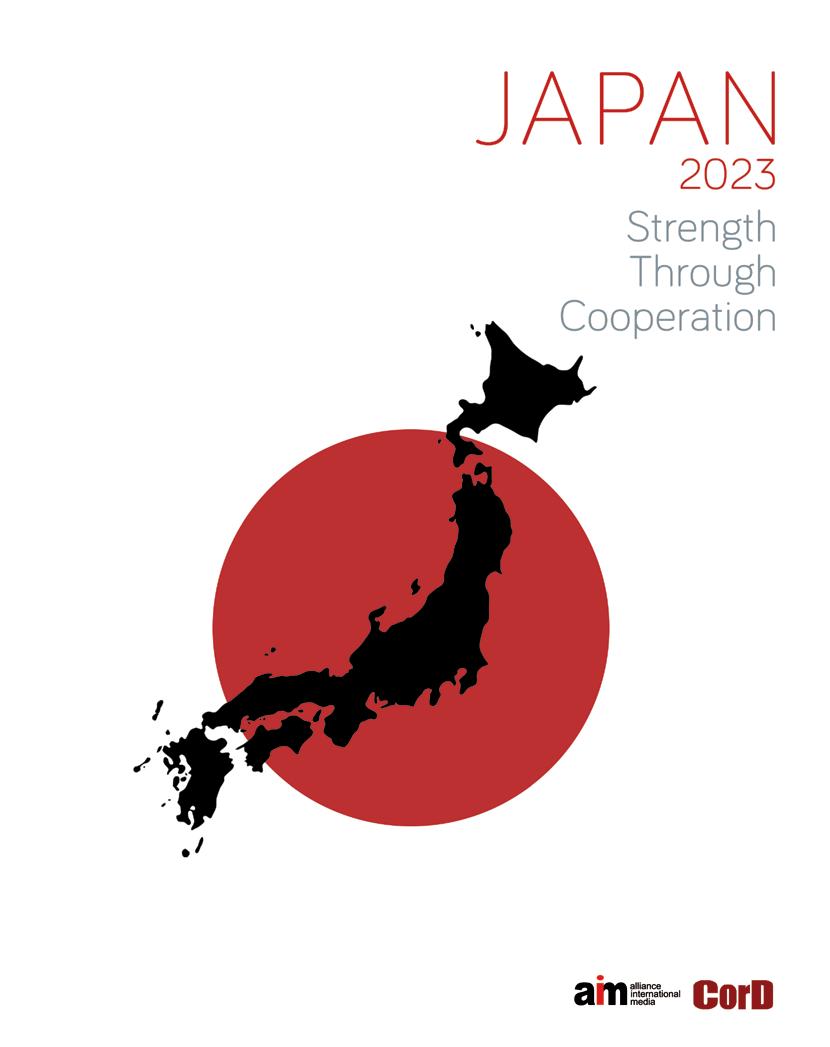

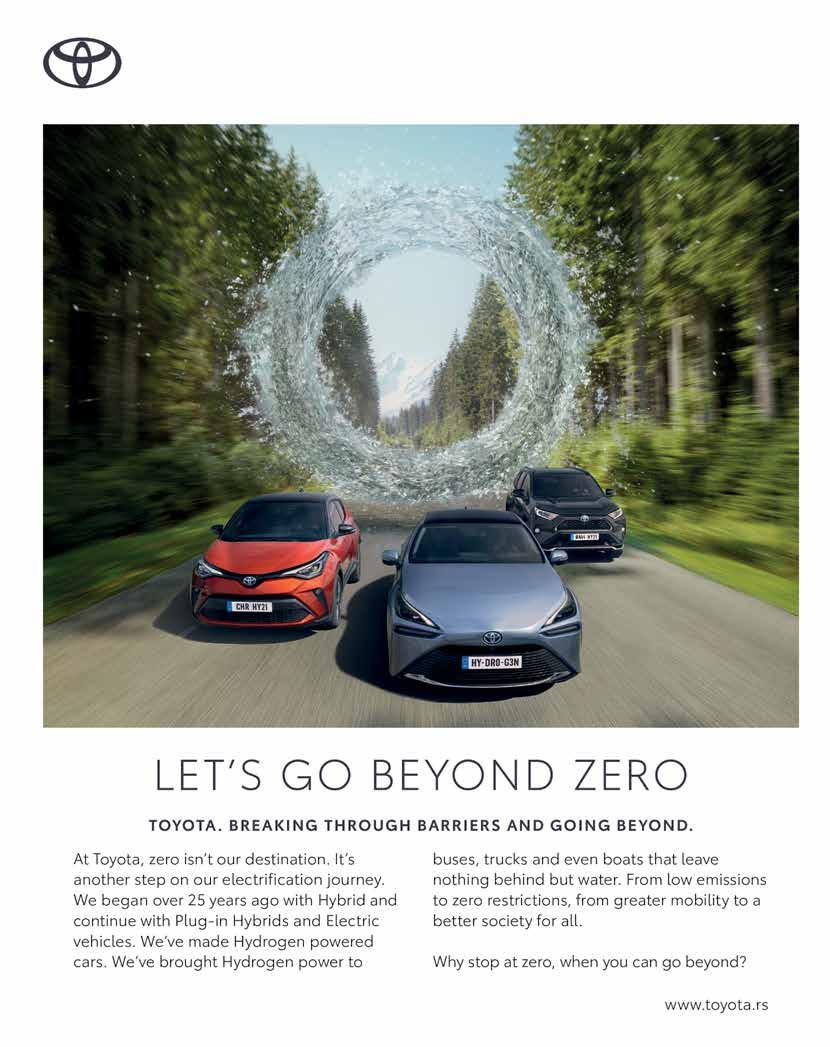
CONTENTS IMPRESSUM
08 COMMENT WHY JAPANESE COMPANIES ARE GETTING SERBIAN ADDRESSES
20 TATSURO MASUDA, FIRST SECRETARY OF THE EMBASSY OF JAPAN INVESTMENT IN PEOPLE

26 MASAHIRO UEKI, CHIEF REPRESENTATIVE, JICA BALKAN OFFICE
MANY NEW OPPORTUNITIES FOR COOPERATION

10
H.E. TAKAHIKO KATSUMATA, AMBASSADOR OF JAPAN TO SERBIA NEW START FOR FURTHER DEVELOPMENT
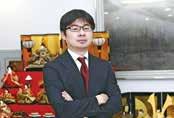
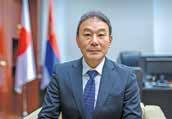
22 LINAS LIBIKAS, JTI GENERAL MANAGER FOR THE WESTERN BALKANS STABILITY, TRANSPARENCY AND PREDICTABILITY MORE NEEDED THAN EVER
29 SENKA ALEKSIĆ, EXECUTIVE DIRECTOR, SHARED MOBILITY D.O.O. HOW KINTO JOIN AND KINTO RIDE PROTECT THE PLANET
16 GORAN PEKEZ, PRESIDENT OF THE JAPANESE BUSINESS ALLIANCE IN SERBIA (JBAS) RISING INVESTMENT INTERESTS

24 MILENA ARGIROVIĆ, MD, COUNTRY HEAD FOR SERBIA, MONTENEGRO, ALBANIA, NORTH MACEDONIA AND KOSOVO AT TAKEDA WE USE DATA AND DIGITAL TO IMPROVE PATIENTS´ LIVES AND CREATE BETTER SOCIETY

30 EPSON MONOZUKURI IS THE KEY TO SUSTAINABLE MANUFACTURING

EDITOR IN CHIEF:
Neda Lukić n.lukic@aim.rs
ART DIRECTOR: Branislav Ninković
b.ninkovic@aim.rs
CONTRIBUTORS:
Rob Dugdale, Maja Vukadinović, Mirjana Jovanović, Miša Brkić, Ljubica Gojgić
Radmila Stanković, Steve MacKenzie, Zorica Todorović Mirković, Sonja Ćirić, Miloš Belčević
PHOTOS:
Zoran Petrović
COPY EDITOR: Mark Pullen
TRANSLATION & EDITING: PULLEN EDITORIAL
HALIFAX
SALES MANAGERS: Biljana Dević, b.devic@aim.rs

Mihailo Čučković, m.cuckovic@aim.rs
Renata Šteković Zagorac r.zagorac@aim.rs
Bojana Nikolić b.nikolic@aim.rs
OFFICE MANAGER: Svetlana Petrović s.petrovic@aim.rs
FINANCE: Dragana Skrobonja finance@aim.rs

EXECUTIVE DIRECTOR: Maja Vidaković m.vidakovic@aim.rs
DIRECTOR: Ana Novčić a.novcic@aim.rs a.novcic@cordmagazine.com
PUBLISHER: Ivan Novčić i.novcic@aim.rs
JAPAN 2023
PRINTING:
Rotografika d.o.o. Segedinski put 72, Subotica
CorD is published by: alliance international media
Prote Mateje 52, 11111 Belgrade 17, PAK 126909, Serbia
Phone: +(381 11) 2450 508
E-mail: office@aim.rs
office@cordmagazine.com
www.cordmagazine.com
www.aim.rs
ISSN no: 1451-7833
All rights reserved
alliance international media 2023
JAPAN 2023 4

CONTENTS
40 OLIVER LEPORI, JBAS EXECUTIVE DIRECTOR INTRODUCING NEW VALUES, CREATING A BETTER SOCIETY
32 RADOŠ GAZDIĆ, DIRECTOR OF THE DEVELOPMENT AGENCY OF SERBIA (RAS)
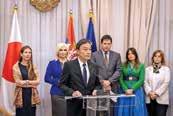
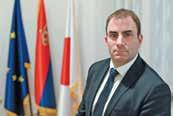

WE HANDLED THE CRISIS WELL
42 SHINKANSEN THE THINGS YOU DIDN’T KNOW ABOUT THE SHINKANSEN

54 HANAMI VRŠAC TRUE FRIENDSHIPS ARE
35 KONICA MINOLTA INNOVATIVE SOLUTIONS THAT IMPROVE LIFE

44 JBAS ACTIVITIES 2022
57 REVIEW OF JAPANESE FILMS 2023

36 NINA DUSPER SUŠIĆ, PRESIDENT OF THE BOARD OF HITACHI ENERGY BALKANS CLUSTER, HITACHI ENERGY JAPAN ENERGY TRANSITION IS KEY

48 JAPANESE AWARDS & ACCOLADES DECORATED FOR SINCERE CONTRIBUTIONS TO FRIENDSHIP
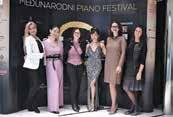
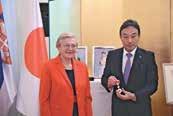
38 NTT DATA RECOGNISED GLOBAL LEADER

50 KYOTO’S JIDAI MATSURI FESTIVAL OF THE AGES

58 TRADITION
EHOMAKI: THE SUSHI ROLL THAT BRINGS YOU LUCK

JAPAN 2023 6
TO BE CELEBRATED

Why Japanese Companies Are Getting Serbian Addresses
After many years during which bilateral relations between Japan and Serbia were mainly nurtured through good political and cultural relations, the economic perspective is finally making its way into this picture. It would be fair to say that foreign direct investments from Japanese companies in Serbia have been steadily progressing in recent history, changing the structure of the domestic economy
Japanese companies today employ around 7,000 people in Serbia, mostly in agriculture, the automotive industry and the IT sector. This is a result of continuous efforts exerted by the central and local governments of Serbia to improve the country’s business environment and establish Serbia as an interesting investment spot that provides easy access to the large markets of various regions, such as the European Union and beyond. Although we are witnessing deep demographic shifts and suffering from the so-called brain drain, the country is still able to offer a good workforce at a reasonable cost. On top of that, there are a number of support mechanisms for foreign investors at the national and local levels that render the investment climate even more attractive. However, this is only part of the answer to the question - why more Japanese companies are getting Serbian addresses. Specifically, efforts on the Serbian side have been met by equally important strides on the Japanese side, which has flourished under the Western Balkans Cooperation Initiative that was launched by late Prime Minister Abe in 2018. While the current global economic situation is not conducive to further economic growth
The Western Balkans Cooperation Initiative is the Japanese diplomatic concept that was developed with the aim of supporting the EU accession of Western Balkan countries. The Initiative has had the most visible effect in Serbia, where a number of Japanese companies have made high-quality investments in alignment with the concept of the Initiative
and investments, the partnerships already established between the Embassy of Japan, the Japanese Business Alliance in Serbia and the Japan External Trade Organisation, on one side, and the Development Agency of Serbia and the aforementioned national and state bodies, on the other, are providing Japanese
companies with enough information and support if they wish to consider Serbia as their investment destination. On top of that, all of the noted actors are working together to contribute to further improving the investment environment in Serbia.
Vojvodina is particularly attractive to investors from Japan at present, thanks to its good geostrategic position, human resources and strong connections with other regions. However, the Serbian Government has established 15 free zones nationwide – not only in Vojvodina, but also in many regions that are gradually being discovered by various foreign companies. Knowing that proximity to external markets is an important and often decisive factor for any foreign company thinking of Serbia as a production spot, the Serbian Government has been exerting a lot of effort to develop key infrastructure throughout the country. Japanese companies have yet to discover these new destinations, which offer access to the human resources being sought by many of the businesses that are relocating their production facilities closer to the markets of the EU.

JAPAN 2023 8
COMMENT

New Start For Further Development
H.E.
KATSUMATA, Ambassador of Japan to Serbia
Easy access to major European markets and favourable trade agreements with other regions of the world, competent workers with “reasonable” salaries and incentives provided to foreign investors by the state are the reasons for the increased interest in investing in Serbia among Japanese companies. The strengthening of economic relations is built upon friendly bilateral relations that have been confirmed
during the times of the greatest challenges, both for Serbia and for Japan, says Japanese Ambassador Takahiko Katsumata in this interview for CorD Magazine, referring to the major anniversary of bilateral relations commemorated in 2022.
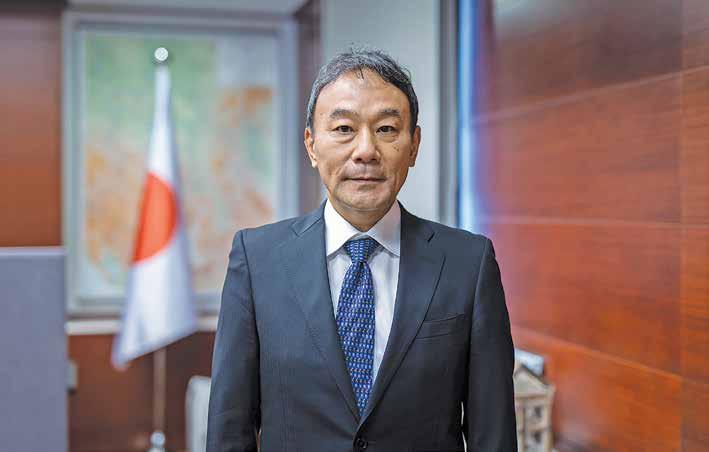
Your Excellency, we have left behind a year that was dedicated to the commemorating of the 140 years of
friendship and bilateral relations between Japan and Serbia. Are you satisfied with the way this important date was marked?
Yes, I am very satisfied. During this important year, the Embassy of Japan, the Serbian Government, local communities, Japanese business associations, various cultural and sports organisations and many friends of Japan and Serbia energetically planned and
JAPAN 2023 10
TAKAHIKO
Based on the long history of friendship between Japan and Serbia, and the sharing of values in a wide range of fields, such as diplomacy, economics, culture, sports, education and regional development, has steadily progressed and is truly significant
~ Takahiko Katsumata
INTERVIEW
ROYAL VISIT IMPROVEMENT WB COOPERATION INITIATIVE
We sincerely hope to realise such a royal visit in order to deepen the friendly relations between our two countries
implemented more than 40 commemorative events. Each event involved many people and they offered unconditional support in celebrating our friendship. Through these events, we conveyed our gratitude to all the people of Serbia who have made efforts to strengthen relations with Japan, and confirmed the bonds of friendship.
Based on the long history of friendship between Japan and Serbia, the sharing of values in a wide range of fields, such as diplomacy, economics, culture, sports, education and regional development, have steadily progressed and that is truly significant.
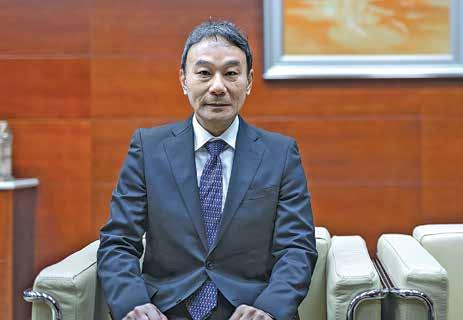
It can also be said that the bilateral relationship has been underpinned by a common tradition of mutual respect and support – especially when Serbia was in a difficult situation after the 1990s and when Japan was hit by a major earthquake and tsunami in 2011, the spirit of mutual friendship was demonstrated. Japan will never forget the warm support and kind hearts of the Serbian people.
With this 140th anniversary of friendship as a new start for the further development and strengthening of bilateral relations, to bring them to a higher level, I and the Embassy of Japan would like to work together with all of you.
Serbian Prime Minister Brnabić stated recently that she has sent invitations to visit Serbia to the Prime Minister of Japan and members of the imperial family. Do plans exist to realise such a visit at the highest level?
Prime Minister Ana Brnabić met with Prime Minister Fumio Kishida during her last visit to Japan in September last year, on the occasion of the state funeral of late Prime Minister Shinzo Abe.
I was pleased to hear that, during the meeting, Prime Minister Brnabić expressed her intention to invite the imperial family to Serbia, recalling that our two countries’ friendship was established by the exchange
I would like to express my sincere appreciation to the central and local governments of Serbia for their continuous efforts aimed at improving the business environment in Serbia
of letters between Their Majesties Emperor Meiji and King Milan Obrenović in 1882.
We sincerely hope to realise such a royal visit in order to deepen the friendly relations between our two countries.
Japanese companies employ around 7,000 people in Serbia, mostly in agriculture, the auto industry and the IT sector. Given that the arrival
I am very pleased with the fact that, on the territory of the Western Balkans, the Initiative gave the most visible effect in Serbia, leading to a drastic increase in the presence of Japanese companies
of Japanese companies is dependent on recommendations from the government, what would you say about Serbia’s current investment climate? First of all, I would like to express my sincere appreciation to the central and local governments of Serbia for their continuous efforts aimed at improving the business environment in Serbia. There are three main reasons behind the acceleration of
Japanese companies’ investments in Serbia in recent years.
First is easy access to large markets in various regions like the EU, other European countries and Turkey, with free trade agreements or open economic access. Second is Serbia’s human resources, in terms of an excellent workforce at a reasonable cost. Third are the various forms of support and incentives from the central and local governments. Japan has also been taking various measures to promote Japanese companies’ investments in Serbia under the Western Balkans Cooperation Initiative announced by late Prime Minister Abe in 2018. Specifically, the Tax Convention between Japan
JAPAN 2023 11
The bilateral relationship has been underpinned by a common tradition of mutual respect and support – especially when Serbia was in a difficult situation after the 1990s and when Japan was hit by a major earthquake and tsunami in 2011, the spirit of mutual friendship was demonstrated. Japan will never forget the warm support and kind hearts of the Serbian people
and Serbia entered into force in December 2021 and facilitates companies’ business activities in Serbia, while a JETRO Business Mission representing a variety of Japanese industries visited in October last year.
Although the outlook remains uncertain due to the pandemic and the situation in Ukraine, the Embassy will continue to work with JBAS (Japanese Business Alliance in Serbia) and JETRO (Japan External Trade Organization) to provide Japanese companies with precise and objective information on Serbia and to work with the Serbian authorities to further improve the investment environment in the country.
You pointed out during your recent visit to the Chamber of Commerce of Vojvodina that this province is particularly attractive to investors from Japan, due to its good geostrategic position and strong connections with other regions, as well as its good connectedness with the academic
community and the economy. Japanese companies in Vojvodina include Toyo Tires in Inđija and NIDEK in Novi Sad. Do you see opportunities for Japanese companies to invest in other parts of Serbia?
As you pointed out, large-scale investment by Japanese companies in AP Vojvodina has
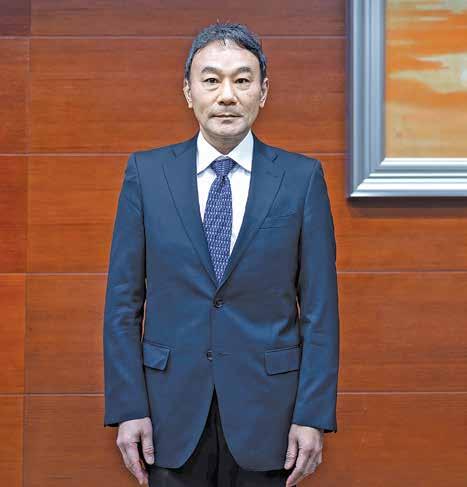
continued in recent years. On the other hand, the Serbian Government has established 15 free zones – not only in Vojvodina, but also in many regions, and various foreign companies have been promoting business in these regions.
The Serbian Government has additionally been promoting infrastructure projects throughout the country, such as railways and highways, which will help to reduce regional gaps and further improve the investment environment.
Japan would like to continue working together with the Government of Serbia to promote new investments in various regions, with a view to the sustainable development of Serbia as a whole, including the promotion of human resources that represent any country’s core driving force.
Environmental protection has become a topic that’s of interest to an increasing number of Serbian citizens. What could you tell us about the Japanese-funded desulphurisation projects attheNikolaTeslaThermalPowerPlant and the installation of waste processing systems in Vinča? Are there plans to include Japanese companies in other environmental projects?
This year, the Flue Gas Desulphurisation Project financed by a Japanese Government yen loan will be completed at the Nikola Tesla Thermal Power Plant. Regarding the Waste Management Project in Vinča (public-private partnership), an “energy-from-waste” facility that represents the uniqueness of this project is scheduled to be fully operational this year. In addition, since last year, Japan has been working with UNDP on a project to support Serbia’s green transition and decarbonisation.
I think these line-ups of ecological approach show Japan’s serious consideration of environmental protection, which should be addressed not only by specific countries and regions, but also in cooperation on a global basis. Japan will therefore continue to contribute to the sustainable development of Serbia, in cooperation with Japanese companies, JICA (Japan International Cooperation Agency), international organisations and other partners, by providing its expertise, knowledge and technology.
JAPAN 2023 12
Although the outlook remains uncertain due to the pandemic and the situation in Ukraine, the Embassy will continue to work with JBAS and JETRO to provide Japanese companies with precise and objective information on Serbia and to work with the Serbian authorities to further improve the investment environment in the country
On the occasion of PM Brnabić’s recent visit to Japan and her meeting with her Japanese counterpart PM Fumio Kishida, there was also discussion of Serbia’s stance with regard to the war in Ukraine and Belgrade’s decision not to impose sanctions against Moscow. As ambassador of a country that has joined the sanctions against Russia to the greatest extent, how do you view Serbian reservations over the introduction of such sanctions? During that Summit meeting held last September in Tokyo, Prime Minister Kishida stressed the importance of a united response from the international community towards the Russian invasion against Ukraine, which threatens the very foundations of the international order. At the same time, he appreciated Serbia’s efforts in standing with Ukraine, as in adopting relevant resolutions of the UN General Assembly condemning the Russian invasion, as well as extending assistance to Ukrainian evacuees.
I have personally spoken with officials of the Government of Serbia in order to share the importance of a coordinated response from the international community, including the introduction of sanctions against Russia. While Serbia is still not applying the sanctions against Russia, through a series of conversations with them I have come to understand that Serbia is well aware of the importance of such a united response of the international community, as mentioned by PM Kishida, and that it does not take Russia’s side on this matter at all.
With reference to Serbia’s support to Ukraine, I visited the reception centre for Ukrainian evacuees in Vranje, established by the Government of Serbia, and I witnessed that they were treated rather adequately and expressed thanks for the assistance from the Serbian side.
I think the importance remains in unifying our unwavering response against the Russian aggression to stop current tragedies in Ukraine.
An incident unprecedented in the more recent history of Japan occurred this summer, when former Prime Minister Shinzo Abe was assassinated in July 2022. What impact did that
murder have on Japanese society? Six months have already passed since the tragic assassination of former Prime Minister Abe on 8 th July last year. The unforgivable brutality of gunshot in the middle of an election campaign that is the foundation of democracy had a tremendous impact on Japanese society. His state funeral was attended by 700 delegates from approximately 218 countries, regions and international organisations, including Prime Minister Brnabić from Serbia. I would like to again express my gratitude to the Government of Serbia for its high respect to late former Prime Minister Abe. Through the state funeral, Japan responded to the condolences of other countries with courtesy and demonstrated its determination to protect freedom and democracy.
Mr Abe visited a total of 196 countries and regions during his tenure, which was
by Mr Abe, PM Kishida emphasised Japan’s intention to act proactively in the interests of the peace and stability of the world.
Following in the footsteps of Mr Abe, who laid the foundations for Japan’s diplomacy in the future, we will work hard to cooperate to achieve peace and prosperity of the international community, further strengthening the Japan-U.S. Alliance, cooperation with ASEAN, Europe and other like-minded countries. We will demonstrate, both nationally and internationally, our determination to firmly inherit and develop the diplomatic legacy cultivated by former Prime Minister Abe.
Could you tell us more about the effects of the “Western Balkans Cooperation Initiative”, which was launched in January 2018 by former PM Abe with the aim of supporting socioeconomic reforms in the Western Balkan countries that aspire to join the EU and promoting cooperation among those countries?
The “Western Balkans Cooperation Initiative” is the first diplomatic concept of Japan to clarify its support for the EU accession of the Western Balkan countries and the facilitation of their regional cooperation.
the most among previous prime ministers of Japan and developed the Japanese diplomatic concept “diplomacy that takes a panoramic perspective of the world map”. Mr Abe advocated a “Free and Open Indo-Pacific Strategy” and led the strengthening of security cooperation with such key countries as the United States, Australia and India. He shared fundamental values and strived to shape a free and open international order based on the rule of law. In order to carry on his diplomatic legacy, Prime Minister Kishida met with more than 30 foreign dignitaries, including Prime Minister Brnabić, both before and after his state funeral. Inheriting the diplomatic principles set forth
Under the scope of this Initiative, we promoted bilateral relations by realising high-level dialogues, extending development and social assistances, promoting Japanese companies’ investments and so on. I am very pleased with the fact that, on the territory of the Western Balkans, the Initiative gave the most visible effect in Serbia, leading to a drastic increase in the presence of Japanese companies in these years making high-quality investments in aligning with the concept of the Initiative.
The Initiative also promotes regional cooperation and cooperation with third parties, i.e., cooperation among Japan, the Western Balkans, the EU and its member states. For example, the Government of Japan organises seminars for experts on the common agenda of the Western Balkans, such as the prevention of natural disasters. I believe this provides all participating countries with effective and useful opportunities to strengthen their mutual relations.
We are also working with EU member
JAPAN 2023 13
Following in the footsteps of Mr Abe, who laid the foundations for Japan’s diplomacy in the future, we will work hard to cooperate to achieve peace and prosperity of the international community, further strengthening the Japan-U.S. Alliance, cooperation with ASEAN, Europe and other likeminded countries
states on joint projects in the Western Balkans. In Serbia, we successfully completed the project to reconstruct the Centre for Returnees and Local People in Prokuplje last year, in cooperation with the Government of Germany. We are very happy to work together with EU member states interested in the further development of the Western Balkans, including Serbia.
It was announced recently that the Government of Japan will provide the country’s domestic economy with almost 270 billion dollars to help overcome the consequences of rising inflation and the impact on the national currency. Are you worried about concerns over a new global economic crisis?
Although the outlook remains uncertain, I don’t believe this is the first time such a situation has arisen. In any era, it is necessary to carefully gather and analyse information on the international and domestic situation, and to identify the issues that need to be addressed. Based on calm and precise analysis, it is important to take timely and steady measures with a broad, long-term perspective and in close international collaboration. We will continue to work this year with warm hearts and cool heads towards
“Friends in hard times are true friends.” During last year, marking the 140th anniversary of the friendship between Japan and Serbia, we made efforts to restore our ties that were almost broken apart by the pandemic, keeping these words of belief in our mind
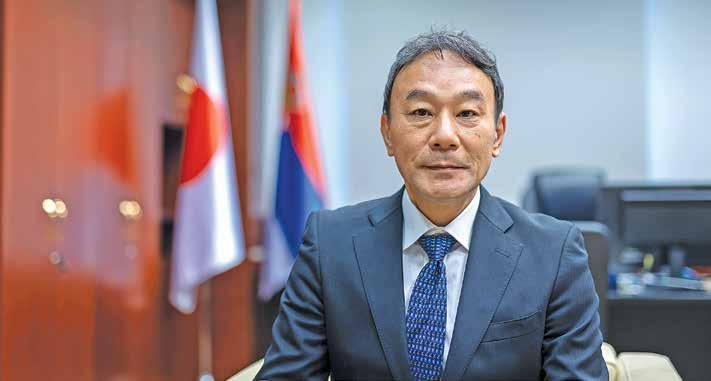
sustainable development that also takes future generations into account.
The enduring friendship between Japan and Serbia is also reflected in the expression of mutual support during troubling times. You often mention the support shown for Japan by Serbia in the aftermath of the catastrophic earthquake of 2011, while Serbian citizens remember Japan’s support during the post-2000 years of economic hardship. You recently presented awards to members of the team responsible for maintaining the public transport buses that arrived in Belgrade as a donation from Ja -
pan almost 20 years ago. Have you ridden on those buses and are you satisfied with the positive effects of that donation?
“Friends in hard times are true friends.” During last year, marking the 140th anniversary of the friendship between Japan and Serbia, we made efforts to restore our ties that were almost broken apart by the pandemic, keeping these words of belief in our mind.
The “yellow buses” have been carefully maintained and continuously used by Serbian citizens for almost 20 years, and have become a symbol of friendship between our two countries. As our appreciation for such efforts, last year I decided to present awards to the engineer who has been involved in the maintenance of these buses for many years, in order to reconfirm our firm ties. As for economic cooperation, I feel that mutual trust can only be fostered through implementation based on a good understanding of the other party’s position and difficulties. On the other hand, efforts need to be exerted to maintain trust, and it is easy for it to break down without these efforts. Japan would therefore like to continue to maintain and deepen our trust with our strong efforts both this year and beyond. We should never leave our friends behind.
JAPAN 2023 14
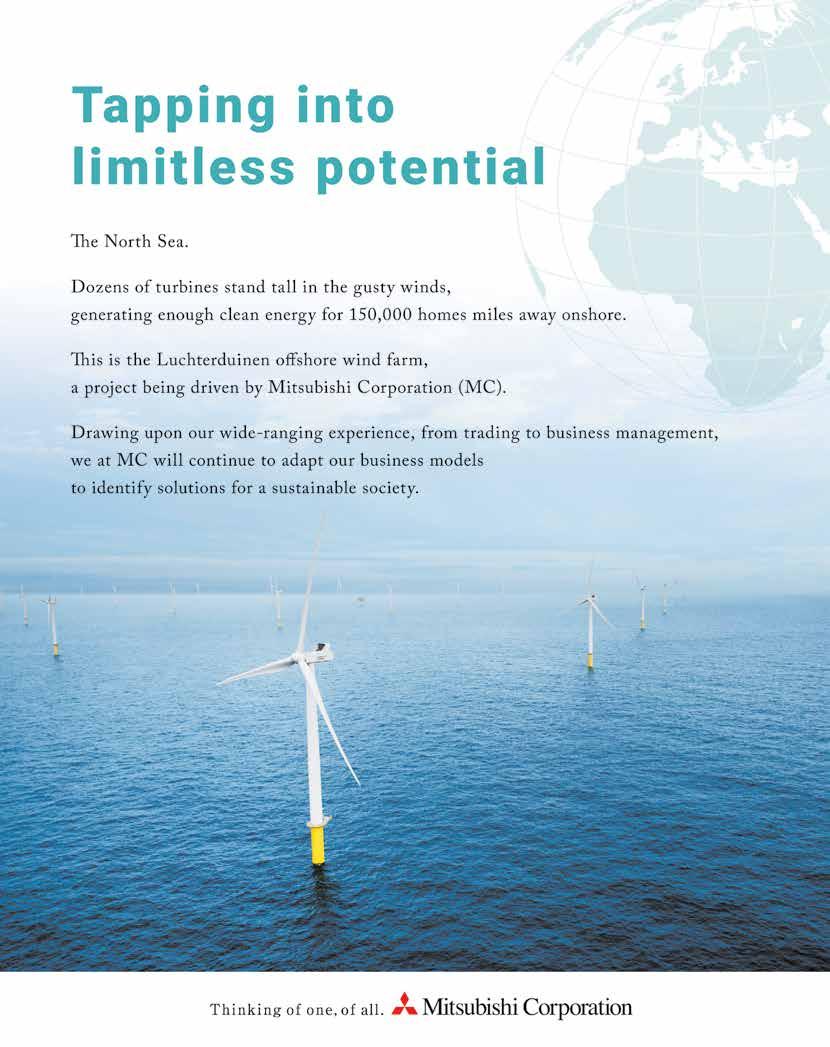 GORAN PEKEZ, President of the Japanese Business Alliance in Serbia (JBAS)
GORAN PEKEZ, President of the Japanese Business Alliance in Serbia (JBAS)
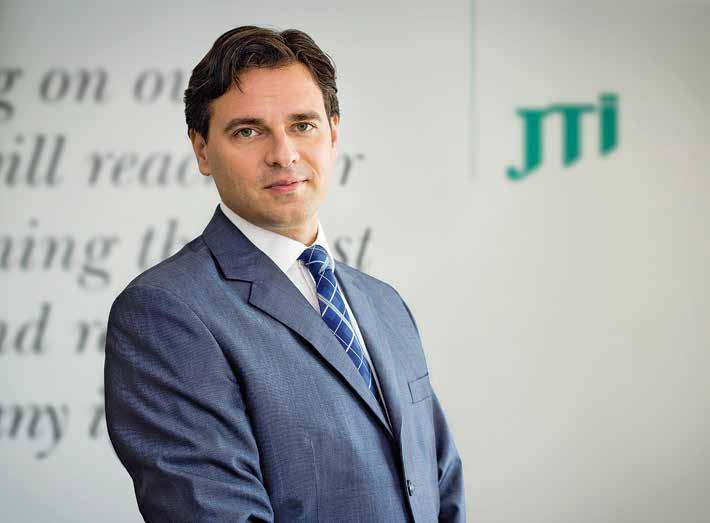
Rising Investment Interests
Thanks to the economic measures implemented by the Serbian Government over recent years, but also its incentive programme for attracting foreign investments in targeted sectors, Japanese companies have come to appreciate Serbia’s competitive advantages. Recent global developments have had a particular impact in terms of our need to shorten supply chains, but the experiences of Japanese companies already operating in Serbia clearly contributed to Serbia being chosen as an investment location”, says Goran Pekez, President of the Japanese Business Alliance in Serbia (JBAS).
Last year marked the 140th anniversary of the establishing of diplomatic relations between Japan and Serbia. When it comes to the economic area of cooperation, how much has it evolved over the last decade?
Both Japanese and Serbian businessmen will tell you that the 2018 visit of then Japanese Prime minister Shinzo Abe was a very important milestone. While interest among Japanese companies was growing well before that, the fact is that PM Abe was accompanied by a very influential delegation of the largest Japanese companies visiting Serbia for the first time.
JAPAN 2023 16
The success stories of our members and interest in cooperating with Japan among local companies are important incentives for new investments and the expansion of cooperation. Developments in this field are fast-paced and it is JBAS’s duty to be in the driving seat
INTERVIEW
INVESTMENTS FOCUS OPPORTUNITY
We are now witnessing a new trend of hightech, strategic projects in our country that’s worth billions of euros, which has placed Serbia directly in the centre of top global investment destinations
They were jointly hosted by JBAS, JETRO, the Chamber of Commerce & Industry of Serbia and Serbian institutions at a major conference. Furthermore, thanks to the economic measures implemented by the Serbian Government over recent years, but also its incentive programme for attracting foreign investments in targeted sectors, Japanese companies have come to appreciate Serbia’s competitive advantages. Recent global developments have had a particular impact in terms of our need to shorten supply chains, but the experiences of Japanese companies already operating in Serbia clearly contributed to Serbia being chosen as an investment location.
Japanese Ambassador to Serbia H.E. Takahiko Katsumata has said that said Serbia’s geographical position and educated workforce, but also the strong support to Japanese companies provided by the Government of Serbia, represent important factors when it comes to advancing Japanese-Serbian economic and trade cooperation. What does JBAS single out as the main factors that could attract future Japanese investors? Those factors clearly represent the basis for future growth too. For our part, in joint efforts with the Government of the Republic of Serbia, the Embassy of Japan and JBAS’s industrial committees, the Serbian market’s conditions for investing are improving every day. The success stories of our members and interest in cooperating with Japan among local companies are important incentives for new investments and the expansion of cooperation. Developments in this field are fast-paced and it is JBAS’s duty to be in the driving seat.
JBAS plays an important role as an advisor to new Japanese investors arriving in Serbia. We heard recently that the level of Japanese investment in Serbia has now reached approximately
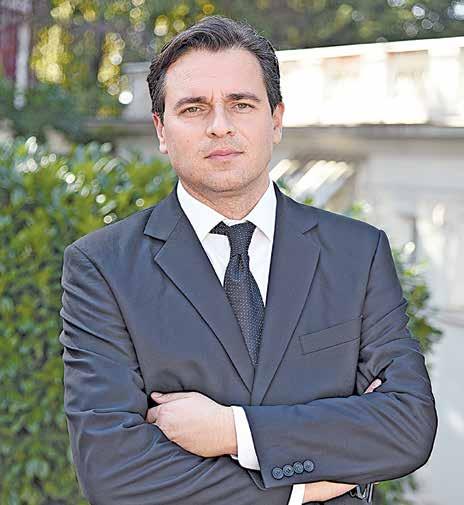
Our focus will remain on searching for opportunities to advance the business operations of Japanese investors already present on the Serbian market
Having in mind the trend of increasing prices of agricultural products, attracting such high-tech investors can represent an opportunity that Serbia shouldn’t miss
Nidec electric motors made in Serbia will be installed in the latest generation vehicles and products. The newly opened Toyo Tires factory includes a solar energy plant designed to eliminate 200,000 tons of CO2 over its working life. Japanese companies are long-term investors that have come to Serbia for strategic reasons
300 million dollars. How good is that result and how can you raise the bar? Until a few years ago, Japanese companies included their investments in a wider map of their European operations. We are now witnessing a new trend of high-tech, strategic projects in our country that’s worth billions of euros, which has placed Serbia directly in the centre of top global investment destinations. The Serbian public is now becoming increasingly aware of the added value of Japanese flagship investments. Nidec electric motors made in Serbia will be installed in the latest generation vehicles and products. The newly opened Toyo Tires factory includes a solar energy plant
JAPAN 2023 17
designed to eliminate 200,000 tons of CO2 over its working life. Japanese companies are long-term investors that have come to Serbia for strategic reasons. Many of them have been operating here for more than 20 years and managed to prove that well-organised agricultural production in Europe without government subsidies is possible. Having in mind the trend of increasing
prices of agricultural products, attracting such high-tech investors can represent an opportunity that Serbia shouldn’t miss.
On the occasion of the national holiday of Japan, the Emperor’s birthday, JBAS was presented with a special award for outstanding achievements in strengthening ties between Japan and Serbia. What do you see as being the most important future directions of JBAS’s activities?
Working with the Embassy of Japan and H.E. Ambassador Katsumata is one of the key factors in expanding bilateral cooperation with Japan in the period ahead. Our focus will remain on searching for opportunities to advance the business operations of Japanese investors already present on the Serbian market. In addition, we will support business missions and inquiries from potential new Japanese investors. Another new project on the horizon is Expo 2025, where we hope that Serbia will receive a fair share of attention for its investment offer and we will duly support that effort.
With the generous support of the Government of Japan, UNDP recently launched implementation of the project “Real Green Transition and Decarbonization in Serbia”. What role does JBAS play in the implementation of this project?
T op economic development goals set by the EU – such as being climate-neutral, the green economy, fit for the digital age, rural development and highly developed and regulated digital services – have topped the agenda in Japan for decades already. Serbia and Serbian companies can learn and benefit significantly from the further improvement of cooperation with Japan. This is why JBAS strongly supported promotions and applications for this important project of UNDP and Japan.
How do you coordinate your work with the Japanese institutions that support trade cooperation and exchange?
We highly appreciate and respect the work of all chambers and associations in both Serbia and Japan. As for later, JETRO and JICA are among our honorary members, while JBAS is the official reference for Serbia from the Japanese Chamber of Commerce and Industry. Cooperation with these institutions
is necessary, because our members operate together on the Serbian market and we both share its good practices while also facing the same obstacles to doing business. Together we can do more to improve capacities to build a competitive economy and improve the regulatory framework, which will have a positive impact on industry and the Serbian economy in general.
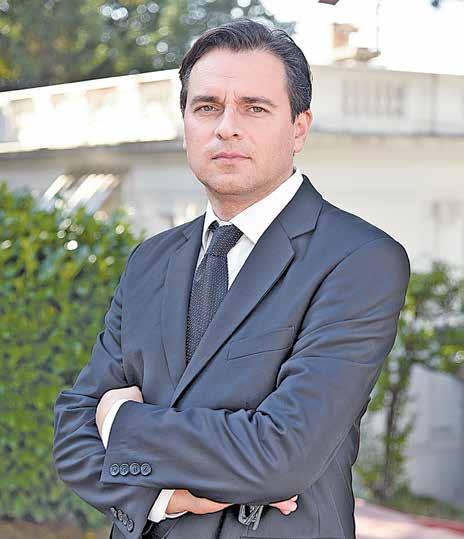
How do you see the rest of 2023 unfolding? How concerned and optimistic are you considering the current economic situation?
JBAS member companies share global optimism that the Serbian economy will resume its positive trends in the coming period. We also fully support Serbia’s efforts to join the EU, in the hope that those efforts will advance further. The outcome of these changes is expected to improve legislation, the environment, conditions for doing business and, ultimately, quality of life.
JAPAN 2023 18
Another new project on the horizon is Expo 2025, where we hope that Serbia will receive a fair share of attention for its investment offer and we will duly support that effort

Investment In People
TATSURO MASUDA, First Secretary of the Embassy of Japan
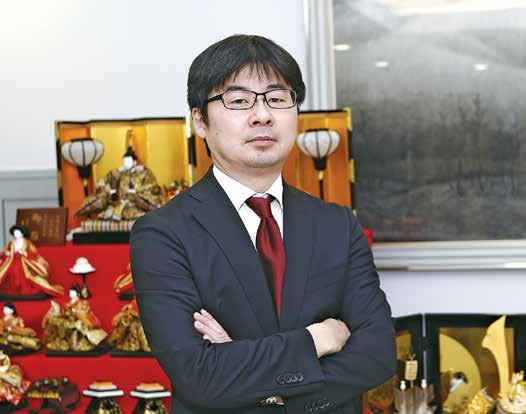
Under the leadership of Prime Minister
Fumio Kishida, Japan is implementing various policies aimed not only at overcoming the difficult circumstances arising from global challenges in the short term, but also to strengthen efforts related to its national growth strategy known as “New Capitalism”
The foundation of the “New Capitalism” promoted by Japan is a diverse society in which everyone can feel a sense of fulfilment in life. We spoke with Tatsuro Masuda, First Secretary of the Embassy of Japan, about the specific characteristics of this initiative and the challenges currently confronting the Japanese economy.
How well has Japan’s economy been responding to global threats since the outbreak of the COVID-19 pandemic? We are living in difficult times. In addition to international challenges like the pandemic, Russia’s aggression against Ukraine and climate change, Japan is simultaneously facing difficult social challenges at home, such as soaring import resource prices in the midst of a still fragile recovery, declining and ageing populations, as well as potential growth stagnation.
Japan has been proceeding with various policies under PM Kishida, not in order to
simply overcome these difficult circumstances from a short-term perspective, but also to position efforts to solve these social issues within our growth strategy over the medium and long term. Specifically, Japan is promoting initiatives to activate the “New Form of Capitalism” in order to make economic and social structures more resilient and sustainable, by implementing prioritised investments through public-private collaboration and regulatory and institutional reforms in a systematic manner.
What does the near future hold in terms of economic growth and job creation?
The “New Form of Capitalism” announced by PM Kishida is an initiative to realise a ‘virtuous cycle of growth and distribution’, whereby the public and private sectors work together to achieve economic growth and distribute the fruits of that growth appropriately, and lead to the next stage of
economic growth. The core investment areas of this initiative are science and technology/ innovation, start-ups, green transformation (GX) and digital transformation (DX), with the aim of expanding economic growth and high-quality employment through investment in growth sectors. In addition to new job creation, Japan is also promoting the enabling of workers to upgrade their skills and move into growth sectors through “investment in people”, to accumulate human capital by investing in vocational training, lifelong education etc.
Japan has a lower inflation rate than Europe and the United States. What are your country’s major sources of price stability?
It is said that the recent global inflation has been caused by a rapid rise in prices of commodities, including energy and grain, triggered by Russia’s invasion of Ukraine, supply-side constraints that have arisen
JAPAN 2023 20
INTERVIEW
during the course of recovery from the pandemic, and the tightening of labour market conditions.
It has been pointed out that one of the reasons behind the lower inflation in Japan is the mindset and behaviour of Japanese people, based on the assumption that prices will not increase easily, which have become deeply entrenched because of the experience of prolonged deflation. In particular, service prices are seen as being less likely to rise because wages are not rising, and labour costs have not increased. In view of these circumstances, the central bank of Japan aims to achieve the price stability target of two per cent in a sustainable and stable manner, accompanied by wage increases.
Prime Minister Kishida has placed the economic empowerment of women at the core of his so-called “New Capitalism” agenda. How represented are women in the Japanese labour force and in the management structures of large companies?
The share of women in the total workforce was about 45% in 2021, and the number of female executives in listed companies has a growth tendency, but still only accounted for less than 10% of all executives as of July 2022. In addition, Japan is ranked 116th of 146 countries according to the Global Gender Gap Index published by the World Economic Forum last year, so Japan needs to further accelerate its gender equality efforts. The foundation of the New Capitalism is a diverse society in which everyone can feel a sense of fulfilment in life. We hope to build a society in which people in various situations can realise their own dreams, regardless of their gender, and in which the percentage of women – as you have asked – is not even a topic of discussion.
According to Bloomberg’s latest survey on Foreign Direct Investment (FDI), Japan’s advantages are to be found in its business-friendly policies, strong talent and high productivity – particularly when it comes to technology and advanced manufacturing. How do you maintain such quality despite an ageing population?
As I mentioned, we aim to build a diverse
society in which everyone can feel a sense of fulfilment in life and in which elderly people are also major players in society. It is expected that the experience, knowledge and wisdom of elderly people can be fully utilised in accordance with their wishes and motivation. Furthermore, I believe that various knowledge and experiences can be combined by providing reskilling opportunities, and this will lead to the creation of a
I won’t repeat it. All I can say is that there is a firm friendly relationship between Japan and Serbia, which was built up by our predecessors over many years, and that Serbia has great potential and job satisfaction for many Japanese companies. I strongly believe that we try to take on new challenges together with the people of Serbia, while looking ahead to the new era, and this will lead to a further deepening of
The Embassy of Japan will continue working with JETRO and JBAS to provide precise and objective information on the political and economic situation in the region and to encourage high quality investments by Japanese companies
positive environment for innovation. World Expo Osaka, Kansai, Japan will be held in 2025 and will provide a great opportunity to bring hope for the future through new technology. We look forward to witnessing cutting-edge technology from around the world at this Expo in Japan.
We have recently witnessed the arrivals in Serbia of some of very advanced Japanese companies. What attracts them to our country?

Ambassador Katsumata has already answered this question on various occasions, so
our friendly relations. It is for this purpose that I would like to underline that political and economic stability – not only in Serbia, but across the entire region – is extremely important for the further development of our relations.
How do you estimate the potential for new Japanese investments in the region?
Following recent large-scale investments in Serbia by Japanese companies, such as TOYO TIRES and the Nidec Corporation, ever-more Japanese companies are becoming interested in Serbia. In October last year, 14 Japanese companies from various sectors visited Serbia as part of a JETRO business mission and had the opportunity to meet President Vučić, PM Brnabić and other relevant, high-ranking officials, which further boosted interest in the region. The Embassy of Japan will continue working with JETRO and JBAS to provide precise and objective information on the political and economic situation in the region and to encourage high quality investments by Japanese companies.
JAPAN 2023 21
LINAS LIBIKAS, JTI General Manager for the Western Balkans
Stability, Transparency And Predictability More Needed Than Ever
The increase in foreign investments in Serbia over the last few years is a clear sign that multinational companies recognise Serbia as a stable and secure country. This trend is positive thanks to Serbia’s position and economic conditions, as well as the country’s links to important markets
which have led to a significant disruption in global supply chains. Market instability, a lack of raw materials and rising energy prices clearly indicated that this is the right time for us to redefine our plans, become more flexible and strengthen partnership relations,” says Mr Libikas.
“In order to continue the uninterrupted supply of our products – not only on the Serbian market, but also across the Western Balkan region, we installed a new production line at our Senta factory, announcing the launch of a five-year investment cycle worth 51 million euros.”
For which markets is this production intended?
At a time when everyone is thinking about the crisis, JT International has once again invested in production. This prompted us to ask Linas Libikas, JTI General Manager for the Western Balkans, to reflect on the company’s expectations when it entered into this venture and the current developments in which it operates today.
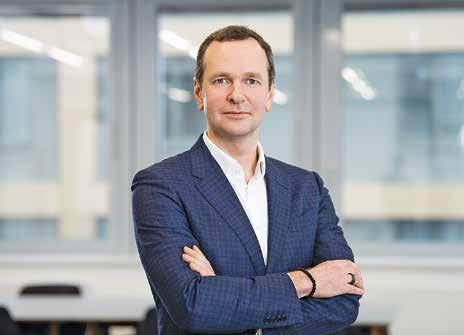

“We live and do business at a time that contains a lot of unknowns – that’s why it is important that we always try to be a step ahead, to anticipate and then adapt to different situations in the best
Our investments will contribute to increasing our factory’s export potential, which will have a direct impact on Serbia’s positive foreign trade balance. They will also create new job opportunities
possible way. The previous year has brought numerous challenges for the whole economy; conflicts in Ukraine, as well as the ongoing COVID-19 pandemic, all of
In addition to the production line, which will double our capacities, the investment cycle will include the construction of two modern cigarette and tobacco warehouses that cover an area of more than 2,000m2. This investment will contribute to increasing our factory’s export potential, which will impact directly on Serbia’s positive foreign trade balance. Due to the expansion of capacities, we’ll have ten new job openings that will contribute to another important field of our business: increasing employment in the local environment. Having in mind the fact that we export our products to the markets of Montenegro, Bosnia-Herzegovina, North Macedonia, Albania and Georgia, as well
JAPAN 2023 22
BUSINESS
Copyrights Georg Wilke
as the EU, we expect the production increase to lead to exceeding last year’s results, when we reached a record in the number of exports and realised a surplus.
Bearing in mind that these are the type of investments we did not have in the previous decade, this is a great success for us, and we look forward to the period ahead.
You announced that part of the investment will be dedicated to construction of the Development Centre. Can you tell us more about that? Will this new centre rely on Serbia’s academic capacities?
That’s right –part of the investment cycle will be dedicated to the construction of the Development Centre, within which we will develop unique modular and flexible machines for the production and packaging of cigarettes over the next two years. These machines will be exceptional, not only in Serbia, but across the whole JTI system worldwide, and the modernisation will have a great effect on increasing the efficiency and speed of work.
One thing that makes Serbia distinct are its hardworking and talented professionals who are eager to progress and improve. They form the core of every company, as the most valuable resource, which should be nurtured by investing in their constant development. Accordingly, this investment cycle will not be an exception and will open the door for ambitious people who want to develop and advance professionally, and they will always be welcome at JTI.
How do you rate the investment climate in Serbia?
In these challenging times, in which global changes have a huge impact on local economies, the need for stability, transparency, predictability and the consistent application of high-quality regulations is greater than ever.
The increase in foreign investments in Serbia over the last few years is a clear sign that multinational companies recognise Serbia as a stable and secure country. This trend is positive thanks to Serbia’s
position and economic conditions, as well as the country’s links to important markets.
Serbia has also had one of the largest inflows of Japanese foreign investments in the region, which exceeded 300 million dollars in 2022 alone. Looking at all the business potentials of our market, companies coming from Japan bring additional value – technological knowhow and new technologies, thereby providing a significant contribution to the development of the economy, but also to technological development.
How do you, as a company, tackle the issue of labour shortages, which is becoming characteristic of Serbia?

It is a fact that the many challenges worldwide, especially the COVID-19 pandemic, have influenced changes on the labour market, and thus led to increasing labour shortage – not only in Serbia, but also around the world. Changes in the way of working and the suspension of numerous activities are just some of the reasons young people are more often opting to work abroad.
At JTI, people really do come first – we are aware that employees are the most important segment of our company and that they are the most influential source of our competitive advantage. It is for this very reason that we invest constantly in the development of our incentivising system of promotions and rewards, private healthcare – not only for employees, but for their closest family members – and we also offer employees the chance to learn more and develop abroad, which is an additional motivational factor for them.
To what extent do innovations at the company demand the improvement of employees’ knowledge, and how do you meet these needs?
As a company, we firmly believe that investing in our people is the true path to success, and that employee satisfaction is of outmost importance.
Year after year, we establish ambitious goals in this area, striving to provide employees with growth and development opportunities at all levels and to elevate the standard of people management practices. Growth and development are not exclusively related to external training and development, but also to following new business trends and introducing modern tools and work systems, which help our colleagues to more easily perform everyday tasks.
That’s why we are the winner of the prestigious Top Employer certificate for the eighth consecutive year, which is awarded to companies that demonstrate an excellent performance in terms of offering the best working conditions for their employees and fostering the development of talent at all levels.
JAPAN 2023 23
One thing that makes Serbia distinct are its hardworking and talented professionals who are eager to progress and improve. Ambitious people who want to develop and advance professionally will always be welcome at JTI
Copyrights Georg Wilke
MILENA ARGIROVIĆ, MD, Country Head for Serbia, Montenegro, Albania, North Macedonia and Kosovo at Takeda
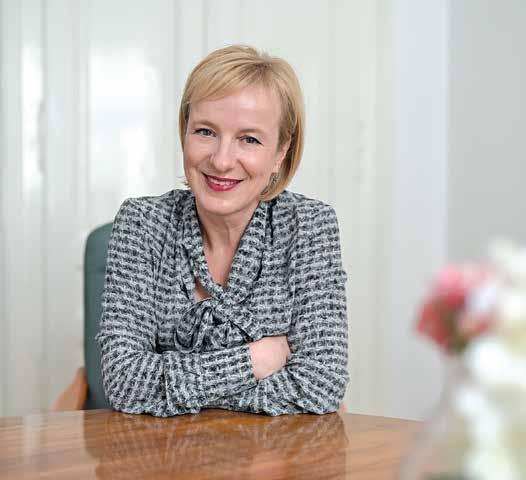
We Use Data And Digital To Improve Patients´ Lives And Create Better Society
Last year was a very important one for Takeda in Serbia. It was a year ago that Takeda commemorated 10 years of operations in Serbia, 240 years of providing healthcare globally and, importantly, we celebrated an unbelievable 140 years of friendly diplomatic relations between Japan and Serbia
with our stakeholders from all over the world, including the Serbian Government and the Embassy of Japan to Serbia, and discuss where and how we want to together support Serbian healthcare in the future. We continue focusing on areas with the highest unmet needs, where we bring transformative products and services that add value to patients in need and the healthcare system as a whole.
You strive to ensure that your unique products and solutions reach patients in our region at the same time as they become available in EU countries, or only shortly afterwards. You really change people’s lives, restoring a sense of hope and dignity to many patients?
By bringing innovations to Serbia, Takeda not only provides products, but also establishes scientific and clinical centres of excellence that can support patients from all over the region. Nothing would be possible without working tirelessly and continuously with the different stakeholders – including policymakers ~ Milena Argirović

The pharmaceutical industry has been among the fastest growing branches of the economy for decades already, thanks largely to innovations. Did the last year provide you with an extra boost; what did last year bring?
It was really a special year. We had time to reflect on what we have achieved, to sit
I would be even bolder here and state that in past years we brought innovations to Serbia not shortly afterwards, but even shortly before the EU! In every step we take, we strive to understand all the possibilities for our patients and to turn challenges into opportunities. In some therapy areas we ensured therapies for patients in need at the same time as those therapies became available in the U.S. and even before they were available in the EU. We are very proud that Serbia is also one of the first countries in Europe where patients have access to the first ever approved stem cell therapy.
Nothing would be possible without working tirelessly and continuously with different stakeholders – including
JAPAN 2023 24
BUSINESS
policymakers – because science, and especially medicine, is developing very fast. Therefore, in order to leverage the fast development of science, we have to be very agile with regulatory changes. This is something that we are constantly working on together with the Government. We cooperate closely together to identify various unmet needs of patients and effectively address them through regulatory change.
The future dream is not only to adopt changes that will support the needs of innovation, but to bring together scientists, academia, and industry in continuous collaboration and to be bold in implementing changes to regulations that will even precede the development of science.
And, more importantly, existing regulations, as well as new ones, have to be followed strictly, especially in the field of healthcare, because predictability and sustainability are critical conditions for companies like Takeda to stat considering an even stronger presence in Serbia.

A passion for innovation represents an indivisible area of your operations, whether that relates to new medicines and products, or the quest to find the best digital solution for a particular healthcare system. How far has Serbia advanced in this regard?
As a company that has been dedicated to improving patients’ lives for the last 240 years, we strive to provide value beyond medicines. As of last year, we established a regular “Open door” event where our teams dedicate time to listen to representatives of patient organisations and understand their challenges. Based on that, we create unique programmes that support patients and their families in every therapy area where we are present. Many of these programmes include, but are not limited to digital services.
During the last year we initiated two very important projects in close collaboration with the National Institute for Molecular Genetics and Genetic Engineering and the National Institute for Artificial Intelligence. We are very proud that we are able to support research and development in
these centres with cutting-edge projects: one of them includes utilisation of optimisation of diagnosis of rare diseases using AI (artificial intelligence) tools and second is related to personalisation of IBD treatments or precise medicine, through pharmacogenomics, again using AI. These projects are aligned with the strategic direction of Serbian science focused on biotech development and we are proudly partnering for the future with Bio4, the
most important and most ambitious scientific project in Serbia.
Despite being considered as belonging to the distant future, you have nonetheless already started implementing telemedicine in the public healthcare system. What have experiences been like for the patients and doctors who have felt the benefits of remote therapy?
Telemedicine has been our signature project for the last two years that we have implemented it in the public healthcare system. It is constantly evolving on the basis of continuous feedback from both doctors and patients.
Beyond the obvious and anticipated benefits for the patients and physicians, as well as tremendous cost-savings for the healthcare system, telemedicine has even more aspects. One of them is environmental protection, since that has significantly reduced unnecessary travel for patients and their families. This impact was carefully analysed and calculated by our team and the project was recognised within the scope of the initiative “Green Transition and Decarbonisation in Serbia” by UNDP, in cooperation with the Ministry of Mining and Energy and the Ministry of Environmental Protection. As part of this recognition, additional support was granted and, thanks to that, telemedicine is now being expanded to seven major clinical and hospital centres across the country.
RESPECTING DIVERSITY TO MANAGE WORK COMPLEXITY
To conclude, I have to stress that none of the aforementioned successes would have been possible without my amazing team, which takes a passionate and authentic approach to each and every project. At Takeda, one of our strategic priorities is diversity, equity and inclusion, but not only in the “traditional” sense of gender and/or racial equality. We go beyond by providing all individuals with the possibility to be different and bring their authentic self, to express their opinion and feel free to speak up, without being afraid of making mistakes. It is particularly important to our team that is led from Belgrade, but includes employees from five other neighbouring countries, with different cultures, languages, religions etc. I strongly believe that this “freedom” and inclusive culture enables people to grow and be courageous and bold in bringing their best in order to ensure better health for patients and brighter future for people.
JAPAN 2023 25
MASAHIRO UEKI, Chief Representative, JICA Balkan Office
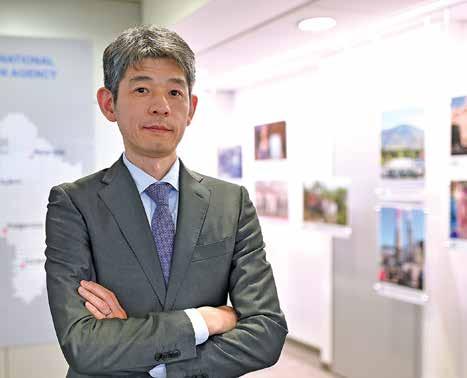
Many New Opportunities For Cooperation
JICA’s cooperation in Serbia will continue based on the Initiative and Country Assistance Policy, while the priority sectors for cooperation will remain private sector development and environmental protection
JICA is an incorporated administrative agency established on the basis of Japanese law and responsible for administering Japan’s Official Development Assistance (ODA). As one of the world’s largest comprehensive bilateral development assistance agencies, JICA is implementing cooperation in 139 countries and regions around the world, including the Western Balkans. This cooperation includes the ODA loan scheme, with 12 billion USD allocated annually, as well as Technical Cooperation and Grant Aid, with an annual budget of 2.4 billion USD.
“For Western Balkan countries, which are on the path of accession to the EU, 2022 was a year of noticeable progress. In July, Albania and North Macedonia officially started accession negotiations, while in December Bosnia-Herzegovina obtained candidate country status. Furthermore, a new cabinet was inaugurated in Serbia last October and Prime Minister Brnabić stated that EU accession was one of the country’s main priorities. Based on these facts, we recognise that the opportunity to achieve EU accession is increasing,” says Masahiro Ueki, Chief Representative of the JICA Balkan Office.
As a cooperation strategy of the Government of Japan towards the Western Balkans, previous Japanese Prime Minister Abe launched the “Western Balkans Cooperation Initiative” in January 2018. This initiative aims to support socioeconomic reforms towards EU accession and promote cooperation among the Western Balkan countries. As an agency of the Japanese government, JICA also leads the cooperation that is aligned with this Initiative. “JICA’s cooperation therefore also supports the Western Balkans’ EU accession and we can say that now is the right moment for us to cooperate for the Western Balkans,” says our interlocutor.
How do you approach green transition in the region and what are your major projects in Serbia in that area?
The aforementioned Initiative raises environmental protection as one of the cooperation areas. Moreover, in the “Country Assistance Policy for Serbia”, the Ministry of Foreign Affairs of Japan lists the environmental sector as the priority area of cooperation. Cooperation in the environmental sector, including green transition, is therefore also one of the very important pillars for JICA.
I can give an example from Serbia. As one green transition measure, renewable energy, such as wind and solar power, have been introduced worldwide. However, as power generation from renewable sources depends on the climate and time, and fluctuates so much, it is difficult to generate enough power to meet the demand. In Japan, more renewable energy has been generated, and the power grid is planned and in operation
JAPAN 2023 26
INTERVIEW
IMPACT START-UPS KNOWLEDGE
to be able to maintain its overall efficiency and reliability even if the power grid accepts renewable energy. If this kind of technology, knowledge and experience is shared in Serbia, which is planning to introduce more renewable energy, it would contribute to the overall improvement of power supply reliability and also the future realisation of a decarbonised society. In this regard, JICA has invited 10 engineers from Serbian public enterprises EMS and EPS to visit Japan for one month from January this year. During their stay in Japan, they will visit Japan’s electric power company and transmission company to learn about the latest power grid planning theory and the facility’s operational method, and also to devise an action plan to incorporate the knowledge gaind into their efforts to include more renewable energy in the future. This type of programme doesn’t imply mimicking Japanese example, but rather jointly creating an action plan that’s applicable in Serbia. We therefore call this type of programme a Knowledge Co-Creation Programme (KCCP).
Which other areas of intervention are in your focus?
According to Japan’s Country Assistance Policy for Serbia, private sector development has been recognised as another priority area of cooperation. Most efforts have been exerted in the promotion of small and medium-sized enterprises (SMEs) and tourism. JICA and RAS (the Development Agency of Serbia) have been collaborating for over 15 years in establishing a mentoring service based on the Japanese model, in which mentors and managers of SMEs jointly diagnose problems and work on the improvement of operations. At this moment, JICA has been supporting the introduction of mentoring services to neighbouring countries and RAS has been participating in the project by generously sharing its achievements in the mentoring field. This kind of promotion of cooperation among
the Western Balkan countries is one of the goals of the Initiative. JICA considers RAS a long-term reliable partner.
Furthermore, a new project in the development of the private sector is the Project NINJA (Next INnovation with JApan). This acronym is symbolic and easy to relate to cooperation with Japan. JICA last year selected seven start-up companies from Serbia, which received a mentoring service and management capacity building from Japanese companies during the acceleration programme phase over the following three months. At the pitch event, to be held in
Grant Aid scheme. Not long after the Balkan Office was established, market-oriented economy and environmental protection were recognised as important sectors requiring assistance, and JICA started cooperating in those sectors. This change actually leads to the fact that private sector development and environmental protection are the main pillars of cooperation in the current Country Assistance Policy for Serbia. Around this period, JICA began changing its activities by monitoring the situation and needs of Serbia.
early February this year, each start-up will present their business plan to Japanese investors. We expect Project NINJA to lead Serbian start-ups to get interested in Japan and Asia as their future business markets.
How has the engagement of JICA in Serbia changed over years and where do you see the greatest impact of the work of JICA in Serbia?
The turning point for JICA was the opening of its Balkan Office in Belgrade in October 2006. The gap between JICA and Serbian government institutions has narrowed ever since, and the efficiency of work has improved significantly. Interestingly, JICA’s cooperation in Serbia prior to that was focused on the restoration and reconstruction of socioeconomic infrastructure. One example is the donation of “yellow buses” through the
The biggest impact of JICA’s activities in Serbia is reflected in the establishment of a relationship of mutual trust between Japan and Serbia. If we take KCCP as an example, more than 800 officials from Serbian public institutions have participated in KCCPs in Japan. For those people who visited Japan from Serbia, KCCP brought not only a learning experience regarding Japan’s superb technology, but also an opportunity to experience the Japanese culture and lifestyle. Former KCCP participants, after returning to Serbia, have continued to support JICA’s activities all around the country. Moreover, these former KCCP participants have established an alumni association in Serbia, through which they disseminate the knowledge gained during their KCCP, but also promote Japanese culture. These activities are highly valuable for JICA. Not to forget that Serbia generously supported Japan after an earthquake that hit the country in 2011. Relations of mutual trust between our two countries have been strengthened at individual, institutional and cross-national levels, and JICA is proud to have contributed to this.
Where do you see potential to develop your activities in Serbia over the long run?
JICA’s cooperation in Serbia will continue based on the Initiative and Country Assistance Policy, while the priority sectors for cooperation will remain private sector
JAPAN 2023 27
JICA’s volunteers have been warmly welcomed by their host institutions, colleagues and citizens, who make them feel at home. If you happen to see our volunteers somewhere, try to speak to them in Serbian
The greatest impact of JICA’s activities in Serbia is reflected in the establishment of relations of mutual trust between Japan and Serbia
We expect Project NINJA to lead Serbian start-ups to get interested in Japan and Asia as their future business markets
The JICA Programme for Japanese studies offers the opportunity for future leaders at leading universities to learn about Japan's modernisation and development experiences
development and environmental protection. Regarding public sector development, JICA has been conducting a survey of current conditions in the tourism sector in the Western Balkans. The tourism sector was hit hard by the pandemic and was followed by the changing behaviour of tourists compared to the time prior to the outbreak. It is therefore obvious that government policies in the tourism sector and business models also need to change accordingly. In Japan, during the peak of the pandemic, overseas travel was restricted and our government introduced subsidised costs for domestic travel. There were even times when the number of infected people was low and domestic tourism was thriving. Many people realised that they could still enjoy travelling in the country, without travelling abroad. Maybe something similar happens here as well, and people from the Western Balkans might realise that they can enjoy travelling around the region. Having these points in mind, JICA will consider the needs of the tourism sector and the cooperation JICA can implement. Our government received a request from the Serbian Government last summer to dispatch a Japanese expert on the promotion of tourism and now our government is processing this request. If this request is adopted, our government will instruct us to dispatch an expert. In this case, we will reflect the results of the mentioned survey in this expert’s terms of reference and launch the procedure to secure the expert.
The JICA Balkan Office and the University of Belgrade recently established the “JICA Chair” Programme at the University. What are your expectations of that programme?
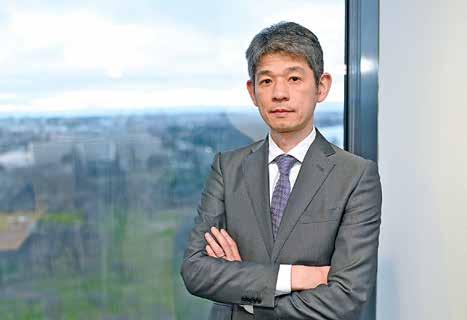
Japan is the very first country and still one of the very few countries to have modernised from a non-Western background. Based on this recognition, JICA started the “JICA Chair (JICA Programme for Japanese studies)” in 2020, in order to offer an opportunity for future leaders at leading universities to learn about Japan’s modernisation and development experiences, which differ from those of Western countries. A JICA Chair has so far been introduced to leading universities in 62 countries, including the University of Belgrade.
The JICA Chair in Serbia was established in March 2022, as one of the events marking the 140th anniversary of friendship between Japan and Serbia, and also as a joint programme with the University of Belgrade. Four lectures have to date been held on topics related to diplomacy, education, the position of Japan in Asia and philosophers of the Meiji era. Moreover, in June 2022, JICA donated 64 books on Japan to the Faculty of Philology and, recently, DVD material with lectures on Japanese modernisation with subtitles in Serbian. JICA hopes that future leaders will contribute to the development of Serbia and the further strengthening of bilateral relations between our two countries.
The JICA Volunteer programme is again active in Serbia. How many of your volunteers are in Serbia today and where are they placed?
Since 2009, when the volunteer programme started in Serbia, 34 Japanese volunteers have been dispatched to Serbia. When the pandemic broke out in March 2020, JICA asked all volunteers dispatched worldwide to return to Japan and, unfortunately, all volunteers also had to leave Serbia. However, in December 2020, when the situation
with COVID-19 stabilised for a while, some volunteers started returning to Serbia, so Serbia again welcomed JICA volunteers. As of January 2023, seven volunteers have been engaged in activities in Serbia. Based on the request from the Serbian government, we plan to increase the number of incoming volunteers in the coming period.
There is currently one volunteer in the capital city of Belgrade, while all others are dispatched across the country – from Novi Sad in the north to Niš in the south. The activities that they are mainly focused on include support to persons with disabilities, martial arts, rural development (food production, tourism, disaster risk reduction etc.). All of them have experience from Japan in their respective fields and came to contribute to Serbia with their knowledge and experience. Since the volunteers work at public institutions, educational institutions and NGOs, they are also making efforts to learn Serbian, as they are working alongside their Serbian colleagues. JICA’s volunteers have been warmly welcomed by their host institutions, colleagues and citizens, who make them feel at home. If you happen to see our volunteers somewhere, try to speak to them in Serbian.
JAPAN 2023 28
The turning point for JICA was the opening of the Balkan Office in Belgrade in October 2006. The gap between JICA and Serbian government institutions has narrowed ever since, and the efficiency of work has improved significantly
SENKA ALEKSIĆ, Executive Director, Shared Mobility d.o.o.

How KINTO Join And KINTO Ride Protect The Planet
Shared Mobility is part of the start of the transformation of the automotive industry as a whole and the new mobility industry. Founded in 2020 as a start-up called Faxi, it was acquired by Toyota Financial Services UK for the purposes of its KINTO brand

Shared Mobility’s executive director Senka Aleksić reveals how this Niš-based company will utilise technology to influence the behaviour of drivers and people who travel in order to reduce the number of cars on the streets on a daily basis, as well as how the future of transportation should look.
We would like to wish you a happy birthday and lots of success, and to ask you to tell us something about your company...
Alongside the two brands that it owns, in TOYOTA and LEXUS, over the next three years Toyota will also transition to a third brand, KINTO, with which it will enter the newly emerging area of MaaS (Mobility as a Service) and shift from being a car manufacturer to a provider of mobility, transitioning from an ownership model to a user model.
We are currently working on two in-house applications, Kinto Join and Kinto Ride (in IOS, Android and Web versions), and our ambition is to become Toyota’s Tech Hub and to take over the development of other applications from the KINTO ecosystem. Apps are made according to the B2B model, so we make applications for partner companies that then distribute them further.
You have spent the past three years working committedly to develop technology that protects the environment while making traffic safer and the society we live in more sustainable. What kind of technology is this? This is patented technology that enables us, in a healthy way, to change people’s habits towards sharing transportation, i.e., we provide companies with the possibility to prevent their employees from cheating and actually reward them when they share transportation. All shared journeys
Sitting alone in a car and driving to work is a luxury and a habit. However, that “freedom” comes at a cost when you realise that thousands of others from your area are doing the same
are verified by a combination of GPS and Bluetooth systems on the actual devices. The more people we manage to “accommodate” in the fewest possible vehicles, the less harmful gases (CO2 and NOx) are emitted into the atmosphere. The system is also smart enough that it recommends people who are going to the same place as clients, with whom they can travel together.
What does it really mean when you say that “through the KINTO Join and Ride applications you promote carpooling and ride hailing, as the
most suitable form of transport for modern man in the digital society”?
At KINTO Join we’re fighting to free man from the jaws of his own “freedoms”, which unconsciously enslave him. Sitting alone in a car and driving to work is a luxury and a habit. However, that “freedom” comes at a cost when you realise that thousands of others from your area are doing the same. Then you are all free to get stuck in congestion and idle on the road while spending your own money and releasing toxic gases into the atmosphere.
What if we can influence the behaviour of drivers and people travelling to work or school with the help of technology? What if we succeed in halving the number of cars on the streets during the course of a day by educating and motivating people to share rides or go by bike or on foot? As Werner Herzog said, “The world reveals itself to those who travel on foot”. That is the goal of the KINTO Join team.
KINTO Ride essentially has the same aim: to solve mobility problems with the help of advanced technologies. Imagine being able, with the help of an app, to reserve a ride for your child and send him to a language class, karate practice or any other activity, in complete safety, and without having to get in the car and drive him... That’s a huge saving in terms of energy and time for the parent and means fewer cars on the streets. That idea has also been extended to encompass more target groups and really functions well on several European markets.
JAPAN 2023 29
BUSINESS
Monozukuri Is The Key To Sustainable Manufacturing
By applying the principle of Monozukuri, Japanese companies create products that are not only functional, efficient and reliable, but also aesthetically pleasing, timeless and, most importantly, durable and sustainable. One of the best examples is the electronics giant Epson. Although Japan is one of the most technologically advanced countries on the planet, tradition is woven into every part of modern business. Connoisseurs of Japan are familiar with the Monozukuri principle, known as the “art and science of manufacturing”, which for centuries has been the core of all craft production, and often the guiding idea for modern techniques. The name itself consists of two Japanese words, “mono”, the object that is made, and “zukuri”, the act of making it. The Monozukuri concept focuses both on tools for continuous improvement of production and on the culture of making, and throughout history it has been associated with a work ethic based on broad knowledge, many skills and a deep passion for achieving perfection. All of this is accompanied by pride in an achievement, a sense of responsibility and a deep respect for the materials used.
As the Japanese first focus on the longterm vision, and only then on the short-term results, Japanese companies are strongly committed to sustainable development, adhering to the old principles of manufacturing and its contribution to society. Whether it is cars or electronics, this country is synonymous with quality, and commitment to this is reflected in every product made in Japan.
MONOZUKURI RESTS ON THREE PILLARS
We live in an era where companies’ attitudes towards social and environmental issues, from global warming to plastic pollution and human rights, are being tested on a daily basis, and now we expect initiatives for environmental and social sustainability, and a contribution to environmental social corporate governance (ESG).
In manufacturing, the Monozukuri concept dictates that great care should be taken in the use of resources, so as not to be wasteful. Everything should be in harmony
with nature and be beneficial to society, while maintaining a balance between manufacturing, resources and society.

Monozukuri rests on three pillars, each of which exists to achieve the least expensive, most sustainable processes while accelerating continuous improvement. For businesses, this means three key areas. The first covers the product and its development in the design phase, focused on reducing resources and costs to a minimum by standardising processes, optimising transparency and teamwork. The second area is manufacturing, where the goal is to eliminate or reduce waste, and the third is the supply chain, where it is important to reduce the overall impact and costs.
MONOZUKURI AND THE IMPACT ON BUSINESS
By adopting the Monozukuri concept, businesses can focus on eliminating waste and streamlining processes to ensure sustainable cost reductions, leaving the opportunity to
JAPAN 2023 30
In a world where the word “innovation” is overused, it is easy to forget that some of the best ideas come from old traditions that have stood the test of time. This is why Japanese companies have a long history of creating high quality products and a leading role in sustainable business
BUSINESS
reinvest profits and effort into employees, society and the planet. This holistic approach not only results in a positive impact on the business and its customers, but also ensures sustainable growth.
Many Japanese companies exemplify this, Epson in particular. Epson’s core values rest on a sense of duty to contribute to the development and well-being of society as a whole by delivering innovative products that reflect the needs of customers today. Epson is dedicated to its users and employees, but it is also dedicated to preserving the world in which we live.
This is also confirmed by the platinum status of the Responsible Business Association (RBA) for responsible manufacturing, awarded to a factory in the Philippines in November 2022. RBA is the world’s largest industry coalition dedicated to corporate social responsibility in global supply chains, whose aim is to support the rights and well-being of workers and communities.
There are many lessons we can learn from the Japanese and the way they manage business. Innovative technologies are not the only way to success, because traditional methods that have stood the test of time can still be applicable, and it is always essential to achieve harmony with the entire environment.
MONOZUKURI’S FOCUS IS ON THE USER
Although a vision is important, both for an individual and for a business, it must be realistic and meet the needs of those
around us. Putting users first is part of the Monozukuri concept, which helps Japanese companies think for the long term. Care is taken of what the user might want and what is needed for manufacturing itself, and in return this concept brings the best quality products and services that win the trust of the user.
In Japan, great importance is attached to the choice of materials and it is believed that a product should be made to last. Monozukuri holds several basic principles that differentiate it from other forms of manufacturing. To begin with, all manufacturing processes strive for perfection. Everything the company does should be directed towards a higher goal so that even when challenges arise, this approach contributes to the preservation of the business.
Essentially, the ultimate goal is to achieve the highest quality product created in the most efficient way that generates original value and really makes a difference in people’s lives, all without having a negative impact on the environment around us.
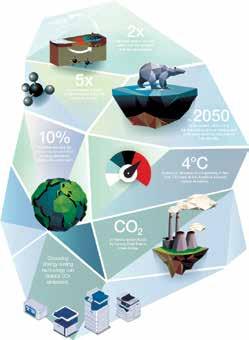
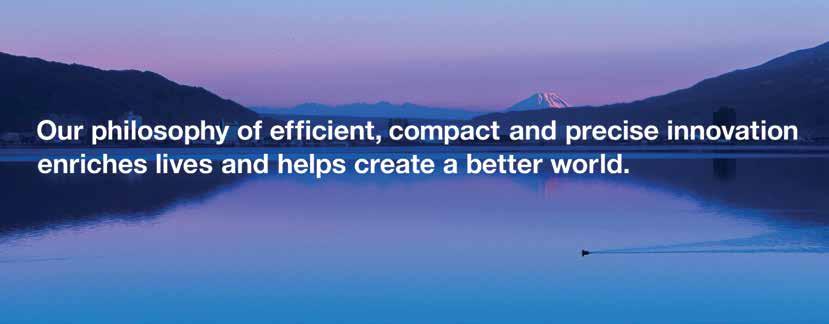
MONOZUKURI ENCOURAGES ENTREPRENEURSHIP
Monozukuri encourages a company’s staff to freely contribute their ideas and express themselves as much as possible. It empowers and trains them to deal with various situations so that they feel belonging and responsibility. This is not only about making a product, but also about instilling pride and passion in what is done. For Monozukuri, you need to open the creative mind. Since it is all about people who make things, manufacturing is impossible if people do not have support. This is where the Hitozukuri concept comes into play, the organisation’s commitment to the lifelong development of the skills and knowledge of all of its staff. It is a continuous process that allows people to mature along with their work, to achieve success in all fields and in all skills.
Epson, for example, has a special programme for new employees. The first year of employment is considered to be a training period in which new staff learn about the company and adopt its business philosophy. The new staff gather for group training, where they are encouraged to practice Monozukuri, which is the foundation of Epson’s efficient, compact and precise technologies.
JAPAN 2023
RADOŠ GAZDIĆ, Director of the Development Agency of Serbia (RAS)
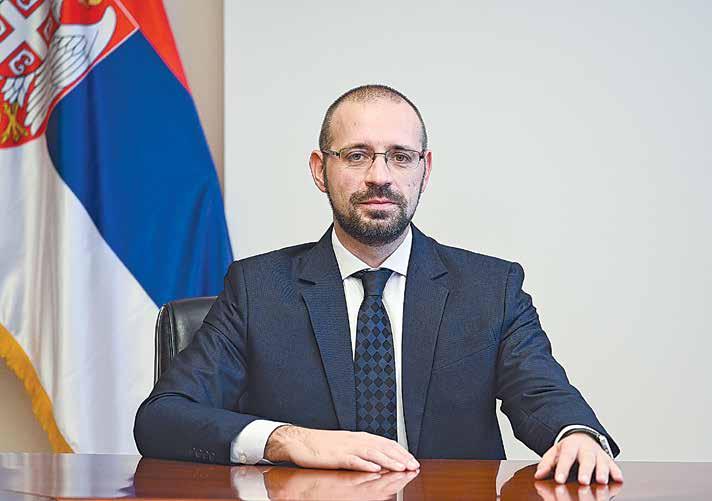
We Handled The Crisis Well
Serbia attracted record inflows of FDI during the three years of crisis that are behind us, averaging more than 3.7 billion euros annually. However, given the challenges that are set to continue confronting the world economy this year, including the countries from which Serbia receives the most FDI, it will prove extremely difficult to maintain the same level of investment over the course of 2023. RAS will certainly continue providing essential support to all interested investors
The year ahead is a challenging one on many fronts. The crisis brought about by the COVID-19 pandemic, which broke global supply chains, was followed by an unprecedented energy crisis and inflation that have further negatively impacted many elements of life, especially related to the economy. Despite this, notes Development Agency of Serbia (RAS) Director Radoš Gazdić, “Serbia coped very well with the numerous challenges that came in previous years
JAPAN 2023 32
INTERVIEW
CONSISTENCY COOPERATION RECORD
as a consequence of events influencing the world economy. Numerous government measures provided support to the economy, and that trend has continued.”
Following the declaring of the pandemic and fearful announcements at the global level regarding reduced investment activities, Serbia was fortunate to be bypassed by those reductions. Indeed, major companies like Barry Callebaut, NIDEC, BMTS, Continental, ZF, Brose and Toyo Tires actually launched some of the implementation phases of their investment projects precisely during these last three years, i.e., in the midst of the pandemic and the current energy crisis, explains our interlocutor.
“Practical experience to date has taught us that serious companies approach possible investment moves very cautiously and studiously, even during carefree times. The trust Serbia has so far amassed as a reliable investment destination, thanks to its business conditions and high-quality and highly educated workforce, as well as the increasingly current practice of nearshoring, are just some of the factors that are favourable to us when it comes to attracting FDI,” concludes Gazdić.
With what kind of balance sheet totals did we end 2022 and what do you expect of 2023?
The trend of growing FDI inflows that began back in 2012 has continued to this day. According to unofficial data from the National Bank of Serbia (NBS), 2022 broke a new record in attracting FDI –with more than 4.3 billion euros arriving. This stat becomes even more significant when we consider that last year was another in the series of pandemic-hit years, and that it was also marked by the energy crisis and war just beyond the neighbourhood. It is interesting that these crisis years actually brought record
FDI inflows to Serbia, with an average of more than 3.7 billion euros annually over the last three years.
most FDI, it will prove extremely difficult to maintain the same level of investment over the course of this year as well. RAS
Similarly, 45 agreements on the allocating of incentive funding were approved in 2022, the implementation of which will result in investment exceeding 1.1 billion euros and the creation of 5,531 new jobs. However, given the challenges that are set to continue confronting the world economy this year, including the countries from which Serbia receives the
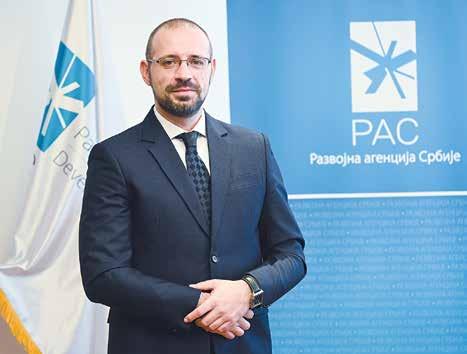
will certainly continue providing essential support to all interested investors.
During the previous few extremely economically challenging years, we actually received several very important Japanese investments. How significant are they for the Serbian economy over the long term?
What’s important for all serious companies, and particularly companies arriving from Japan, is that they spend a long time considering potential investment destinations. However, once they decide to invest somewhere, they do so as a longterm investment, or – to be more precise – they come intending to stay. Serbia has already had the good fortune, and shown the required quality, to become the home of several extremely important Japanese companies. Starting with JTI, as a kind of
JAPAN 2023 33
The presence of renowned Japanese companies here is a privilege and confirmation of the capacities and quality of Serbia, but it also obliges us to continue working at the same rhythm and to continue improving
RAS and JICA last year launched their fifth consecutive cooperation project on the promotion of mentoring for micro, small and medium-sized enterprises and entrepreneurs in the countries of the region
According to unofficial data from the National Bank of Serbia (NBS), 2022 broke a new record in attracting FDI – with more than 4.3 billion euros arriving
Serbia has already had the good fortune, and shown the required quality, to become the home of several extremely important Japanese companies… The list is impressive, and we hope that it will expand
pioneer of Japanese investing in Serbia, via the Yazaki company, Kansai Group, Hi-Lex, Mayekawa, NTT Data, Itochu and Mitsubishi Corporation, to the more recent arrivals of NIDEC Corporation and Toyo Tires. The list is impressive, and we hope that it will expand. Their presence here is a privilege and confirmation for Serbia, but it also obliges us to continue working at the same rhythm and to continue improving.
Can we finally say that Japanese investors are today more accustomed to the idea of considering Serbia, and the wider Western Balkan region, as an investment destination?
Certainly. It is evident that Japanese companies are slowly becoming present in an increasing number of fields in Serbia, and that existing Japanese companies in Serbia are already busily expanding their capacities. Their initial investments are also high, while their plans promise further growth. On our part, we try to be an adequate partner in pursuing joint successes.
To what extent does your cooperation with Japanese agencies that
It is evident that Japanese companies are slowly becoming present in an increasing number of fields in Serbia, and that existing Japanese companies in Serbia are already busily expanding their capacities
are present in Serbia, like JICA and JETRO, serve to help deepen Japanese-Serbian economic cooperation? Our cooperation with JICA and JETRO can already be measured in decades, to our great satisfaction. Their activities and assistance in promoting Serbia is truly exceptional. Even during the times of the pandemic, we succeeded in organising so-called virtual events that were attended by dozens and even hundreds of participants and interested Japanese companies. Likewise, RAS and JICA last year launched their fifth consecutive cooperation project on the promotion of mentoring for MSMEEs (micro, small and medium-sized enterprises and entrepreneurs) in the countries of
the region. This kind of cooperation, which has now already developed into a friendship, is really something we’re particularly proud of.
In your opinion, what is crucial in the work of RAS and the Government of Serbia when it comes to gaining credibility among Japanese investors?
Japanese companies are very conservative in their decision-making when it comes to selecting a country for investment. They thus don’t invest in countries where business is unpredictable and where they don’t see long-term prospects. We believe that Serbia is able to offer precisely that. It is certainly very helpful to our cause that a number of Japanese companies are already present in Serbia and that they are, I believe, satisfied with the support they’ve received in their investment journey from the Government and RAS, and that mutual trust has thereby been created. We should also add to this the fact that diplomatic relations have existed between Serbia and Japan for 140 years, which is also significant.
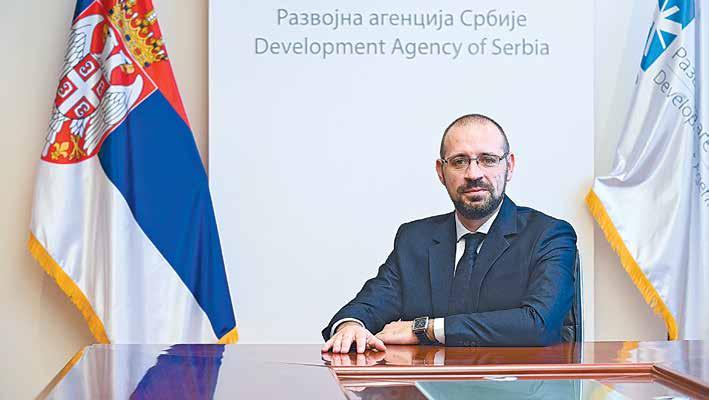
JAPAN 2023 34
Innovative Solutions That Improve Life
Konica Minolta has been successfully operating in the Adriatic region for years, and its innovative solutions and business areas attract a large number of clients in various verticals, from healthcare and education to transport and industry
With internally developed technical solutions, direct communication with users and partners in the field, quality education and our own network of integrators and distributors, the whole of Serbia and the Belgrade office will remain an inevitable factor in introducing users in the region to global technological trends.
With over 40,000 employees in more than 150 countries, Konica Minolta has been producing innovation and transformation for 150 years to facilitate business and create an ideal working environment. Both globally and locally, Konica Minolta demonstrates its superiority day by day in all branches of industry and in all fields of business that include IT services, the digital office, professional printing, measuring instruments, and especially in the field of video surveillance.
SECURITY IS TODAY’S PRIORITY

This technological giant in the field of video surveillance offers a robust system based on MOBOTIX cameras that provide advanced cyber-security and surveillance functions for every company. The cameras are used for mobile surveillance, protection of public areas, prevention of vandalism and theft, and are characterised by reliable coverage and image quality. They

are used in the manufacturing sector, retail, education, healthcare, logistics, tourism, industry and other branches of industry.
Although Konica Minolta cameras are the best on the market, today’s customers expect more, from simple face recognition, through temperature reading and item counting, to motion detection. Konica Minolta achieves this thanks to software solutions that are often custom made, tailored to the customer.
No solution is “off the shelf”, because the customer is always approached individually so that each of them receives a complete service fully adapted to individual needs.
What else sets Konica Minolta apart are its experts, both globally and locally. Each of them is an expert in their field and that is why Konica Minolta, with its entire portfolio, offers all-in-one solutions, which almost no-one else can offer.

LISTEN TO THE DEMANDS OF THE MARKET
Listening to market demands, with the help of KMLE (Konica Minolta Laboratories Europe), the company develops its own video analytical solutions for defect detection, shape recognition and recognition of security-sensitive situations, and detection of the use of PPE - Personal Protective Equipment. Video analytics of this kind enable users in various industries to improve processes and control security challenges in real time. Ubiquitous AI solutions are the backbone of Konica Minolta’s business today, which rely on its own hardware, MOBOTIX cameras.
In the coming period, the company will focus on solutions related to video analytics, not only for hardware, but for solutions that can cover many verticals, and the backbone will be MOBOTIX and the solutions it develops itself. Konica Minolta is recognised first of all as a printing provider, one of the leaders in the world market of printing solutions. Digital transformation is a direction in which they have been moving for a long time, but now even more actively. They definitely see themselves as a leading integrator leader in professional printing, IT, ICT, video surveillance and security markets. prodaja@konicaminolta.co.rs
JAPAN 2023 35
BUSINESS
Energy Transition Is Key
More than 3,000 Hitachi Energy engineers are working every day to deliver new projects and new solutions that contribute to our sustainable energy future. They believe in their experience, investments in research and the latest technologies
Despite COVID-19 and the Russia-Ukraine situation, the global energy crisis, high inflation, and supply chain disruptions, we have the opportunity to leverage the sustained tailwinds on the demand side that are being driven by the transition to clean energy ~ assesses Hitachi Energy’s Nina Dusper Sušić.
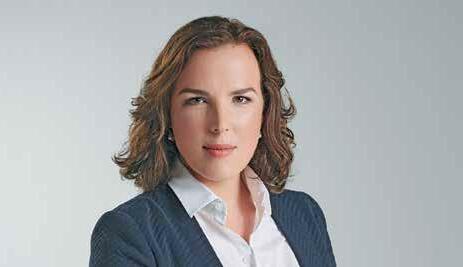
The world is going through one of the worst ever energy crises, with no end in sight. How do you see this situation? Are there any solutions? The political and economic situation has shown continued uncertainties across the globe. The COVID-19 situation continues to impact on people and cause disruptions to business, the Russia-Ukraine situation is having a devastating impact on millions and generating the global energy crisis. The complex relationship that Western economies have with China, persistently high inflation and supply chain disruptions are adding complexity and uncertainty to global trade and markets. While practically every sector is impacted by these unprecedented situations, we have an opportunity to leverage the sustained tailwinds on the demand side that are being driven by the
In January 2022, Hitachi Energy reached its first step target of using 100% fossilfree electricity in its own operations

transition to clean energy. Together with customers and partners, we have continued to collaborate to deliver projects and launch new solutions that contribute to our sustainable energy future.
Your innovative solutions are dependent on experience, investments in research and the latest cutting-edge technologies. Are these solutions universal or do they require adaptation to certain markets, countries, industries etc.?
Our smart and innovative solutions are based on over 230 years of combined experience and continuous investment in research & development, which over 3,000 engineers are working on daily.
In order to help its customers achieve their sustainability goals, Hitachi Energy
has developed advanced services, amongst other things, as a part of the EconiQ™ portfolio, where products, services and solutions are proven to deliver exceptional environmental performance.
These services utilise Hitachi Energy’s domain knowledge of energy systems and local market requirements and standards to find sustainable solutions in many different sectors, including renewable energy, industries, data centres and transportation. The main advantages of EconiQ services is that they can be customised to local requirements and smoothly integrated at any phase of the asset lifecycle in order to evaluate and reduce impacts on the planet, thereby significantly supporting critical energy investment decisions and efficient energy operations across the planning, building, operating and maintaining of power assets.
One of your goals is to fight for a future free of harmful carbon emissions, in which electricity will represent the backbone of the entire energy system. How distant is such a future?
In January 2022, Hitachi Energy reached its first step target of using 100% fossil-free electricity in its own operations. By using 100%
JAPAN 2023 36
NINA DUSPER SUŠIĆ, President of the Board of Hitachi Energy Balkans Cluster, Hitachi Energy Japan
BUSINESS
fossil-free electricity in our own operations, we managed to reduce our CO2 equivalent emissions by over 50% compared to 2019.
We are continuing to invest in the journey to carbon-neutrality by further increasing energy efficiency, as well as electrifying our own operations. For example, in Ludvika, Sweden, the company is now using 100% renewable electricity generated from hydropower and, to a lesser extent, from solar panels to support its operations. Ludvika, which is one of Hitachi Energy’s largest production facilities, has gone beyond tackling its electricity supply and is now close to removing the use of all fossil fuels from its entire operations.
We believe that, over time, renewable energy sources will be effectively integrated into the world energy system, which will contribute greatly to ushering in the carbon-neutral future.
There are numerous challenges when it comes to sourcing electricity from Renewables. How difficult is it to ensure the stability of the grid and the predictability of supplies?
It is not easy to ensure the predictability of supply, but there are solutions to leverage on stability. For example, a mix of renewable sources (microgrid), as well as implementing solutions like our battery energy storage system (BESS).
BESS is a longer-term solution that strengthens grid resilience, reduces energy costs and represents a large back-up power source, while improving the efficiency, reliability and user availability of the power system.
That’s why BESS and the microgrid are today becoming increasingly popular around the world. They enable reliable access to the power supply and allow for a significant reduction in use of fossil fuels, as well as a reduction in overall maintenance costs, thus supporting a future based on sustainable energy.
Reducing the use of fossil fuels is a step towards accelerating energy transition to a carbon-neutral energy system. In order to limit the impacts of global climate change, it is necessary to look to renewable sources like solar, wind and hydropower that capture naturally occurring energy and convert it into electricity. Investing in clean
energy technologies makes energy systems more modern, more resilient and cleaner, stimulating much needed job creation in the short term, and also enhances future economic competitiveness and productivity.
What can you tell us about your Lumada platform?
It is one of the many strategies that are key to creating a carbon-neutral future. Hitachi outlined its growth strategy and commitment to strengthening its digital and green portfolio, which is focused on Lumada. Lumada encompasses a pletho -

health and encroachment from a variety of sources, recommending ways to manage and reduce risks by alerting field crews. It thus provides industrial organisations with the tools they need to get the right information to the right teams when they need it most. The result is improved asset reliability, safety, and global sustainability efforts.
Analyses conducted by your experts show that the consumption of electricity globally will grow from today’s 20 per cent of all energy use to more than 40 per cent by 2050. Will we be able to secure that much electricity? How can this be achieved?
Energy transition is key. Together with our customers and partners, we are energised and motivated by the shared goal of accelerating a carbon-neutral future. To achieve carbon-neutrality in our own operations, the main goal is turn to renewable energy, investing in fossil-free electricity and energy efficiency, ensuring our facilities are as
ra of software solutions from basic Asset management, via Workforce management and Field service management, to entire Enterprise Software management.
The Lumada ecosystem is accelerating the journey to a sustainable society through the data-driven cycle of value co-creation with customers. It represents a complete solution that provides an easier, more cost-effective and scalable way to gauge the visibility of assets and factors like the current state, asset
efficient as possible – aimed at the recovery of the green economy. This electricity will become the backbone of our entire energy system, powering all elements of modern society from transportation to heating and cooling, to myriad industrial processes that lead us to a sustainable energy future. The region is surely well on its way to becoming greener and we are looking forward to developing and supporting the energy transition in these dynamic times.
37
Investing in clean energy technologies makes energy systems more modern, more resilient and cleaner, while stimulating much-needed job creation
Recognised Global Leader
The strong relationship established with different sister companies across the NTT and NTT DATA group fosters collaboration and global knowledge-sharing. Technologies and best practices can be shared and leveraged from Japan to Serbia, and vice versa, like never before
At NTT DATA, continuous improvement and openness to sharing knowledge is key to achieving a forward-looking society that transcends all borders. Here three NTT DATA managers discuss this approach.
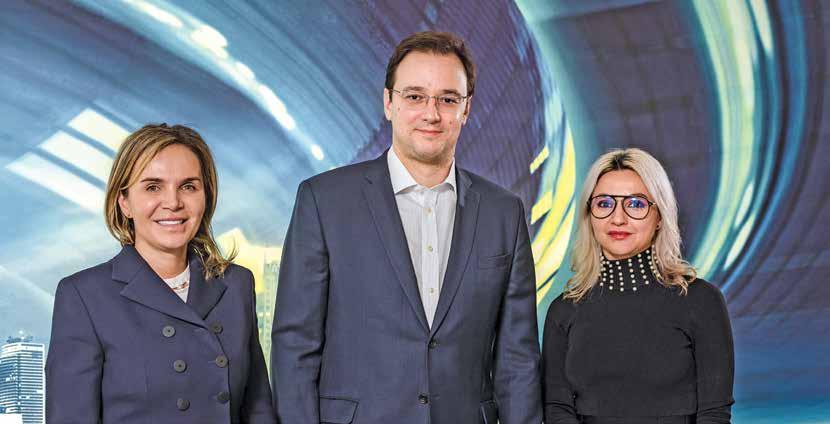
Maria Metz - CEO, NTT DATA Romania
WE DECIDED TO EXPAND OUR PORTFOLIO OF SERVICES
We have been part of the NTT DATA group since 2013, but we had joint projects even before the acquisition. I can
say that they are characterised by being people-oriented and by their high level of responsibility towards their work. In our interactions, I have always felt that
similar culture and values meant that the integration was gradual and easily accepted by our colleagues. This was a very important step in the company’s development and brought us opportunities, both in terms of access to technologies and in extending our client portfolio to important global brands in the premium market segments.
teamwork and collaboration are very important to them and that they have great respect for each other’s work.
These elements played an important role in the integration process. Having a
Integrating into the group has been a step-by-step process, maintaining the spirit and philosophy that we already had. We found inspiration in the experience and tradition of the NTT DATA group and evolved on all levels, gaining knowhow, expertise and business performance from our colleagues within the group.
JAPAN 2023 38
Maria Metz - CEO, NTT DATA Romania, Bojan Mrazovac, Head of Innovation and Site Manager Serbia, and Adela Negru, Chief HR Officer, NTT DATA Romania
BUSINESS
Business decisions are made in a way that provides financial stability and supports the company’s vision and goals
This proved mutually beneficial for colleagues, clients and community, as this integration will bring attractive projects, international career opportunities, access to the latest technologies and solutions and, last but not least, financial stability and strength.
As part of a global NTT (Nippon Telegraph and Telephone) concern, our strategy and decisions need to be aligned with the plans of the group. What I can say is that the well-being of our colleagues and their job satisfaction is our number one priority, and business decisions are made in a way that provides financial stability and supports the company’s vision and goals.
We want to provide our colleagues with a strong organisational culture in which a sense of belonging and social cohesion prevails. It is important for them to work on projects that are as diverse and interesting as possible, that stimulate and reward them. It is for this reason that we decided to expand our portfolio of services and entered new market segments. We have invested in developing skills and infrastructure in new segments, such as utilities and cybersecurity, where we already have our first clients.
In such a society, any product or a service will be optimally delivered to humans and tailored to their needs by overcoming different social challenges. NTT DATA has already built a strong footprint in each of these technology areas and has even been recognised as a global leader for the majority of them.
Innovation is critical for every organisation that wants to grow and deliver successful solutions for both its customers
Adela Negru - Chief HR Officer, NTT DATA Romania
TOGETHER WE CAN MOVE MOUNTAINS
Ihadthe great honour to be part of the team that opened our branch in Novi Sad. Then and now, I can confess that I was impressed by the people I met, their professional capabilities and, last but not least, their strength of character. I have repeatedly told my colleagues in Novi Sad that we can move mountains together. They have confirmed this every single time — the feeling is mutual.
Bojan Mrazovac - Head of Innovation and Site Manager Serbia
WE REALLY BELIEVE IN CHANGING THE WORLD
Being recognised as a global innovator is an attribute that is strongly linked to responsibility. At NTT DATA we do not see innovation just as a buzzword or a pie-in-the-sky thinking; we really believe in changing the world to contribute to transforming the complete society to a ubiquitously human-centred society that balances economic, industrial, infrastructural and healthcare advancements with the resolution of social challenges, by strongly integrating cyberspace and the physical world.
and society in general. The acquisition and utilisation of data have accelerated the way organisations approach both their transformative journeys and the daily protection of critical data. One of the biggest challenges is to fuel the need to focus constantly on innovations and bridge the gap between scalable, agile solutions and reliable data governance. Data security has become one of the most critical areas and our responsibility to provide our clients with a secured and reliable cyber-physical environment is a key goal. Technologies are evolving faster than ever before and timeframes for understanding and adopting new results are significantly shorter, therefore balancing between both short-term resilience and the longterm growth of innovations is probably the biggest challenge. Cybersecurity, data and intelligence, the IoT and Cloud infrastructure have to be orchestrated in a symphony to create new paradigms and values that help contribute to a more harmonious society.
Data and privacy protection, secured information distribution in zero-trust environments, trustworthy manufacturing and digital citizenship are top priorities of our innovation strategy. Solutions implemented by our teams have already reached markets on different continents.
Every company is defined by its people; each individual brings their own unique contribution to the company, and people are we. For NTT DATA Romania, the concept of being people-centric is not at all new, as it was already in place when I joined the company in 2009. What has changed
company is defined by
in the last few years is the strong desire of colleagues to be part of the company’s evolution, and that is captured precisely by the new organisational culture that our CEO has started implementing. Together we are always stronger.
NTT DATA globally aims for its companies around the world to be “The Best Place to Work” for its employees. This certification has helped us confirm what we do well, but also where room exists for improvement and innovation.
The key is to be aware of these differentiators, which you need to identify by looking through the eyes of your employees. NTT DATA Romania, together with Babes Bolyai University, has done this exercise for two consecutive years and each time we have received confirmation from colleagues that our Japanese origin is a strong differentiator. For our colleagues, Japanese heritage means stability, security and respect.
JAPAN 2023 39
One of the biggest challenges is to fuel the need to focus constantly on innovations
Every
its people, each individual brings their own unique contribution to the company, and people are we
OLIVER LEPORI, JBAS Executive Director
Introducing New Values, Creating A Better Society
Japanese companies active in Serbia entered 2023 aware that it would be a challenging year, yet they’re committed to long term operations and value creation in Serbia. They are thus ready to continue improvements to their businesses and will remain the planned business track, says Japanese Business Alliance in Serbia (JBAS) Executive Director Oliver Lepori. These words are indeed comforting during times when global economic uncertainty remains elevated, weighing on growth.
We recently had the opportunity to read about the grand opening of
the new Toyo Tires factory and new investment in JTI. How important are they for your association, but also for future Japanese investments in Serbia?
JBAS is honoured to be running a community of investors that contributes to the local economy from many different aspects. At the first level, such investments contribute directly to the improved economic performance of Serbia in terms of FDI, tax income, GDP, exports and employment. Further to this, there is a transfer of knowledge and technology that impacts positively on Serbian development in general. Additio -
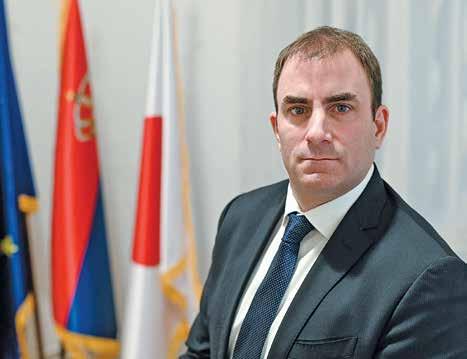
nally, such investments serve as positive indicators and encouragement to other companies – not just from Japan, which are considering extending their businesses in this area. Last, but by no means least, Japanese investments always imply care for the environment, sustainability, and good governance, and therefore contribute to overall efforts aimed at achieving the ESG goals in the investment recipient country. We believe that all the various layers are important both for Serbia and our association. These investments, and many others, serve as shining examples of long-term and mutually beneficial ventures across the entire Balkan region.
Perusing your website shows that many of your other members also had good news in 2022. How does 2022 look from this perspective?
The beginning of last year was economically challenging, due to global post-COVID disruption, while the subsequent outbreak of the conflict in Ukraine imposed an additional burden. It was a year of risks and challenges – geopolitical confrontations, trade wars, inflation, rising interest rates, energy market turmoil and social unrest.
And yet, JBAS member companies managed to maintain a steady pace in improving their businesses, investing in their resources and developing their businesses here in Serbia, which makes us especially proud as a community. Moreover, in 2022 we celebrated the 140th anniversary
JAPAN 2023 40
We expect to reinforce the existing cooperation between the government and our business sectors in order to create the conditions for a strong and durable recovery, which has to be more resilient, more sustainable and responsive to immediate and critical needs. We are also here to contribute in this regard
INTERVIEW
of bilateral relations between Serbia and Japan and five years since the founding of JBAS. This joyous occasion inspired all our members to participate in the promotion of not only business relations, but all aspects of friendly connections between Serbia and Japan. On the national holiday of Japan, the Emperor’s Birthday, JBAS was presented with a special award for extraordinary achievements in strengthening ties between Japan and Serbia, which represents a special acknowledgement of the work and activities of all our member companies. Therefore, despite the unfavourable circumstances, we all managed to make 2022 a positive, memorable year.
Which JBAS activities would you single out as being the most important in supporting new investments and connecting member companies with new partners?
Apart from building a strong community of Japanese investors and their local partners for the purposes of growth, JBAS is also committed to supporting new investments and establishing new partnerships.
In this regard, one of the most important advances was the elevating of our cooperation with institutions of the Serbian Government, with the aim of providing support in all important areas of the country’s growth. Our companies have contributed to the development of Serbia’s energy system, digitalisation, personal data protection, environmental protection, green transition, the healthcare system and in many other areas.
We also partnered with other international organisations in 2022 and managed to support our members in acquiring additional funds for decarbonisation projects. It was wonderful to see the highest Serbian officials and our members attending the launch of a project implemented jointly by UNDP, the Ministry of Mining and Energy, the Ministry of Environmental Protection, the Embassy of Japan and JBAS and, following the tradition of the Japanese Tanabata festival, symbolically writing down their wishes for a greener, healthier and economically stronger Serbia, which they left in the bamboo trees of Belgrade’s Botanical garden.
When it comes to investments, JBAS has always acted as a strong pillar of support to the Embassy of Japan in Serbia, but also to JETRO and JICA.
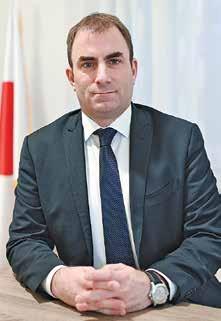
On the other hand, we are connecting our members with other important local stakeholders, including municipalities, technology parks and scientific institutions, thus creating an ever-stronger local network for sharing experiences and building partnerships for the future.
Given the current global economic situation, what are your members’ expectations for 2023?
here. They will all continue making improvements to their businesses and will remain on the planned business track. As a community, we expect to reinforce cooperation between the government and our business sectors in order to create the conditions for a strong and durable recovery. All our companies are aware that economic development needs to be more resilient, more sustainable and responsive to immediate and critical needs. We are also here to contribute in this regard.
We always talk about JBAS primarily as a business association, but you are also very active in promoting Japanese business culture and Japanese culture in general. How close is Japanese business culture to the Serbian public today?
The Serbian people, especially the business community, are rather well-acquainted with Japanese business culture. On the one hand, Japan is advanced in terms of technology and infrastructure, while on the other, it is wedded to traditional cultural approaches to all things corporate. Japanese companies are simultaneously innovative and strongly aligned with traditional hierarchical structures, risk aversion and attention to detail. Generally speaking, Japanese business culture is highly regarded around the whole world – due in particular to the kaizen concept, which implies a business philosophy of continuous improvements of working practices and personal efficiency. There is a lot to learn. This is also the reason we organise kaizen courses each year…
It is thanks to such a business culture that, in general, our members believe that business is not just about profits, but rather about creating value, including in culture and art, as the most sophisticated forms of human expression. It is for this reason that we’ve supported many cultural events in Serbia and assisted in paving the way for Japanese artistic performances in Serbia.
We are aware that 2023 is yet another year filled with business challenges, due to myriad unfortunate international political, economic and social circumstances. However, our members are committed to long term operations and value creation
In the following period, we will continue building on the friendship between Japan and Serbia – one that’s grounded in business terms, but adorned with social values, with a view to creating a better world for all of us.
JAPAN 2023 41
Our companies have contributed to the development of the energy system, digitalisation, personal data protection, environmental protection, green transition, the healthcare system and in many other areas
The Things You Didn’t Know About The Shinkansen
What you didn’t know about the world-famous bullet trains, Japan’s favourite mode of transport and one of the most enjoyable ways to travel the country
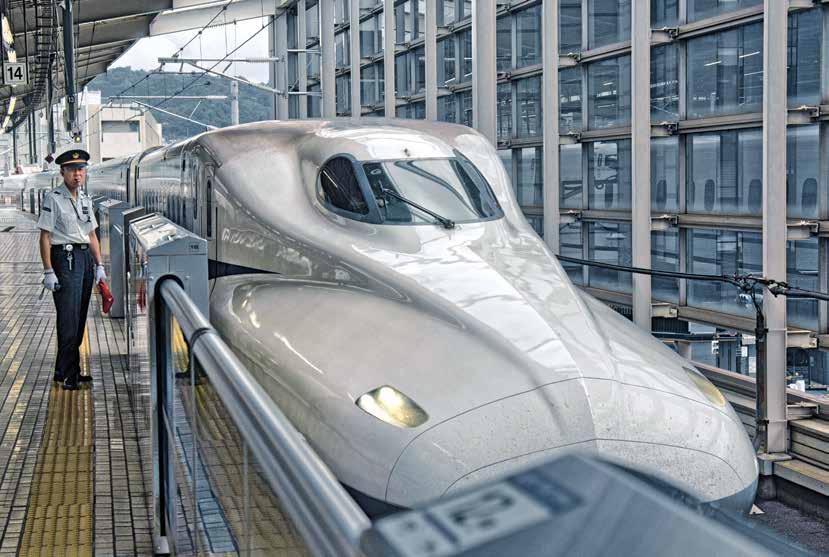
Free wifi, beautiful bento meals and spectacular window views – Japan’s shinkansen are second to none when it comes to travelling in ease and comfort. These bullet trains are notoriously fast and can take you anywhere from the former Japanese capital of Kyoto to Hiroshima (360km) or Tokyo to the ski slopes of
Yamagata (348km) within the duration of a ‘Lord of the Rings’ film.
Japan’s high-speed trains have a reputation around the world for being one of the fastest and most efficient ways to get around – but what else is there to know about the shinkansen? Here are several fun facts about the world’s best form of travel.
The world’s first shinkansen was launched to coincide with the 1964 Tokyo Olympics Shinkansen is considered to be one of the pinnacles of modern Japanese technology, but it’s been around for over half a century. The world’s first bullet train was launched on the Tokaido Shinkansen line connecting
JAPAN 2023 42
SHINKANSEN
Tokyo and Osaka on 1st October 1964 – just a few days ahead of the first Tokyo Olympics.
Shinkansen can travel up to 320km an hour

Japan’s bullet trains that are currently in operation can reach a maximum speed of 320km per hour, but there’s also a freight that has broken the Guinness World Record for an even higher maximum speed. With shinkansen being so essential to boosting the national economy, making them even faster is a major contribution to the advancement of Japan’s biggest cities.
In 2015, Japan Railways Group (JR) broke the world railway speed record after the L0 Series maglev train that the company has been developing and testing over the last several years hit a speed of 603km/h (375mph). JR plans to move ahead with its record-breaking maglev by integrating it into everyday transportation for the future.
Shinkansen is the safest form of transport
Air travel is widely considered to be the safest form of transport due to the low number of accidents compared to trains or automobiles – but bullet trains aren’t like the locomotives of yesteryear. In the 59 years since the launch of the world’s first bullet train, Japan has had zero cases of death caused by shinkansen derailment or collision.
Shinkansen is so punctual the average delay time is less than a minute
Everyone knows that Japan’s train companies pride themselves on punctuality, where a shinkansen departing the platform 24 seconds earlier than scheduled will make national headlines. But even on the rare occasions when they don’t show up on time, you’re not likely to notice the delay. According to the 2021 annual report released by Japan Railways, Tokaido Shinkansen trains had a delay of 0.9 minutes per train on average.
Shinkansen have built in earthquake-safe features
One of the biggest causes for delay or temporary suspension is the occasional earthquake that can disrupt the power sources that feed the bullet trains. Thanks
Shinkansen is considered to be one of the pinnacles of modern Japanese technology, but it’s been around for over half a century. The world’s first bullet train was launched on the Tokaido Shinkansen line connecting Tokyo and Osaka on 1st October 1964 –just a few days ahead of the first Tokyo Olympics

fast as planes just yet, they only consume 12.5% of the energy planes require and produce about 92% less carbon emissions per seat. JR is looking to further improve these percentages by developing more energy-efficient rolling stocks for the future.
For perspective: the N700S model that JR Central uses in 2020 can travel at a speed of 285km per hour compared to 270km per hour on the 1992 model. Yet the 2020 model consumes just 72% of the energy the 1992 model required to operate.
Japan still sets the benchmark for bullet trains despite competition from around the world
When Japan’s inaugural shinkansen travelled from Tokyo to Osaka in 1964 at 204km per hour, it was the fastest train the world had ever seen. Now, similar bullet trains have popped up in different parts of the globe, harnessing high-speed technology to push for a brighter future.
to a new lithium-ion battery developed in 2019, bullet trains are now able to run on an independent power source which will allow the train to move slowly and steadily towards a safe tunnel.
Shinkansen is the most eco-friendly way to travel
Worried about your carbon footprint? Though bullet trains may not travel as
Over in China, bullet trains can now run at a maximum speed of 350km per hour. Meanwhile in the United States, Elon Musk is looking to develop a freight transport system that would allow travellers to go at a speed of 700 miles (1,127km) per hour.
Still, Japan isn’t planning on letting anyone else take the spotlight for the best mode of transport. With sights now set on bumping up the maximum speed of bullet trains across Japan as well as completing the maglev by 2045, other railway companies would have to work overtime in order to catch up to Japan.
JAPAN 2023 43
JBAS Activities 2022
March
SPECIAL AWARD FOR EXTRAORDINARY ACHIEVEMENTS
On the occasion of the national holiday of Japan, the Emperor’s Birthday, JBAS received a special Ambassador’s award for extraordinary achievements in strengthening ties between Japan and Serbia.

March
ILLUMINATIONS IN THE COLOURS OF JAPAN
The governments of our two countries, which have been building good relations throughout their long history, commemorated the 140th anniversary of friendship between Japan and Serbia in 2022. To mark the anniversary, central landmarks of the city of Belgrade were illuminated in the colours of Japan on the evening of 30th March.

March
KOPAONIK BUSINESS FORUM
As one of the most influential investor community associations, JBAS representatives shared their views on the investment climate in Serbia at the Kopaonik Business Forum. JBAS president Goran Pekez emphasised that Serbia is witnessing a new trend in high-tech, strategic projects worth billions of euros, which places the country directly at the centre of top global investment destinations.
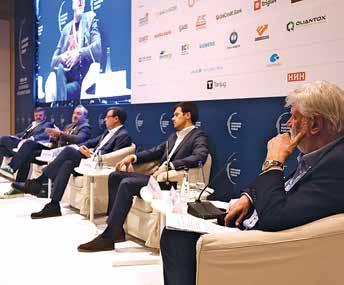
April
PANEL DISCUSSION ON DIGITALISATION AND PERSONAL DATA PROTECTION
JBAS organised a panel discussion on digitalisation and personal data protection, with the support of CANSEE, the Canadian-Serbian Business Association, and the Slovenian Business Club.
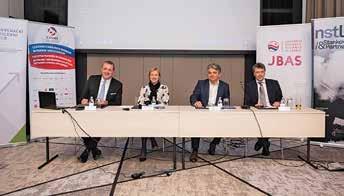
April
“JUST GREEN TRANSITION AND DECARBONIZATION IN SERBIA” PROJECT
With generous support from the Government of Japan, UNDP launched the implementation of the project: “Just Green Transition and Decarbonization in Serbia”, in close collaboration with the Serbian
JAPAN 2023 44
Ministry of the Environment and the Ministry of Mining and Energy, throughout 2022, with JBAS providing support to the project.
June
OPEN-AIR GALA OPERA EVENING

As part of celebrations marking the 140 th anniversary of the establishing of diplomatic relations between Japan and Serbia, and as a special gift to all JBAS members, citizens of Belgrade and Serbia, JBAS organised an OPEN-AIR GALA OPERA NIGHT together with the Opera of the National Theatre of Serbia, the City of Belgrade, the Embassy of Japan and JTI Serbia. The evening’s special guest, famous Japanese soprano and Puccini Festival star Ms Shoko Okada, delivered an extraordinary and unforgettable performance.
April
JBAS GENERAL ASSEMBLY
JBAS held its Annual Assembly at Belgrade’s prestigious Hotel Moskva. On this occasion, Ambassador of Japan to Serbia H.E. Takahiko Katsumata expressed his satisfaction and gratitude for the efforts of the Alliance in supporting the development of economic relations, encouraging the companies present to continue their mission in such difficult times for international trade.
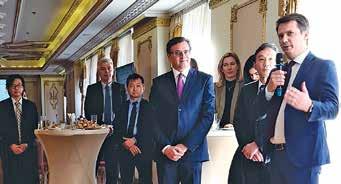

July
TANABATA FESTIVAL AND JUST GREEN TRANSITION IN SERBIA
June
“SEE AUTOMOTIVE – CONNECT & SUPPLY”
The SEE Automotive Conference - Connect & Supply, organised by AC Serbia, saw JBAS host a panel discussion entitled “Insight into the Japanese automotive industry”, which attracted the attention of more than 200 attending professionals and specialists from this important business sector.
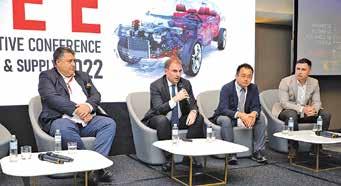
Belgrade’s Jevremovac Botanical Garden provided the setting for the formal announcing of the “Public call for innovative solutions for decarbonisation contributing to a just green transition in Serbia”, launched by UNDP in partnership with the Serbian Ministry of Mining and Energy and the Ministry of Environmental Protection, and with the support of the Embassy of Japan in Belgrade and in cooperation with JBAS. In accordance with Japanese tradition, officials and other participants wrote their wishes for a greener, healthier and economically stronger Serbia on colourful pieces of paper, which they then hung on a black bamboo tree in the Botanical Garden.
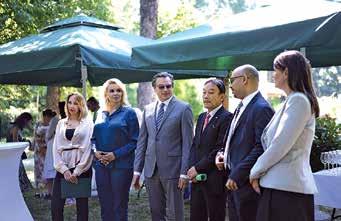
JAPAN 2023 45
August
AMBASSADOR OF JAPAN TO SERBIA H.E. TAKAHITO KATSUMATA VISITS CHAMBER OF COMMERCE OF VOJVODINA
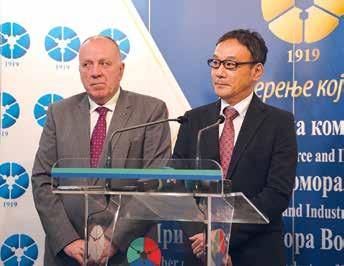
A Japanese business delegation, headed by Japanese Ambassador to Serbia H.E. Takahito Katsumata and including JBAS members, visited the premises of the Chamber of Commerce and Industry of Vojvodina (Privredna komora Vojvodine).
plant in Senta. Besides being among the top employers, Japanese companies in Serbia are also dedicated to creating a better working and living environment by improving people’s quality of life in local communities through the sharing of high work ethics and standards.
September
INTEGRATED NATIONAL ENERGY AND CLIMATE PLAN OF THE REPUBLIC OF SERBIA UNTIL 2030, WITH A VISION UNTIL 2050
The Japanese business community in Serbia supports the Serbian government aims to cut greenhouse gas emissions by 40.3% and achieve a share of 41% energy from Renewables in gross final energy consumption by 2030. Over the course of 2022, JBAS actively participated in the Working Group for the “Integrated National Energy and Climate Plan of the Republic of Serbia Until 2030, with a Vision Until 2050”, headed by the Ministry of Mining and Energy of the Republic of Serbia and with the participation of the ministries of finance and environmental protection.
October
JETRO MISSION TO SERBIA
Serbian President Aleksandar Vučić met with representatives of the Japan External Trade Organization (JETRO) to discuss past, present and future Japanese investments in Serbia, the strengthening of economic cooperation and the overall advancement of Serbia-Japan relations.
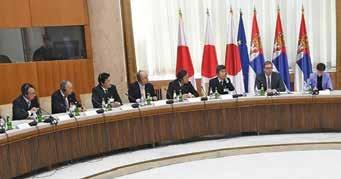
September
JTI
KAIZEN OPEN DOOR DAY
More than 40 members of JBAS in Serbia attended an amazing Kaizen Open Door Day organised by JTI Serbia at their impressive
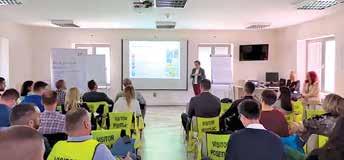
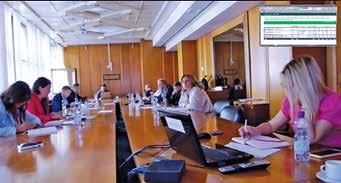
October
TOYOTA GAZOO RACING EXPERIENCE
Representatives of Japanese companies in Serbia, members of JBAS, had an opportunity to experience an adrenaline-fuelled event that was specially created by Toyota Serbia and allowed them to enjoy driving the amazing 261 Hp GR Yaris.
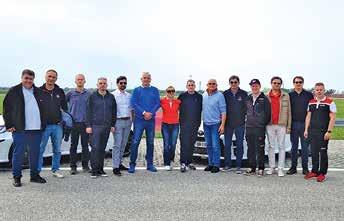
JAPAN 2023 46
November
CANON DIGITAL SOLUTIONS
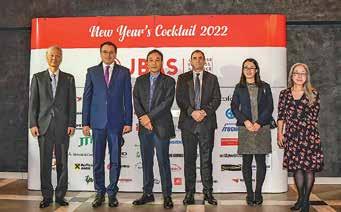
Thanks to Canon Serbia and Aigo Business System, JBAS members had an opportunity to participate in the exclusive event “Take a look at the future”, held on the premises of the Embassy of Japan in Belgrade and organised specifically for representatives of Japanese companies operating successfully on the Serbian market.
December
JBAS NEW YEAR’S COCKTAIL PARTY 2022
JBAS members gathered for the annual New Year’s cocktail party to mark the end of the year at the Promenade event centre in Belgrade. The cocktail party provided an excellent opportunity for both long-standing and new members to gather with officials and representatives of the Embassy of Japan.
November
JSFF AWARDS NIGHT
JBAS members and friends attended a special Japanese Movie Night at the Yugoslav Cinematheque Film Archives. A screening of the movie The Way of the Househusband, based on the homonymous cult manga series by Kousuke Oono, was followed by an official awards ceremony and a cocktail party.
The highlight of the evening was the JSFF Toyo Tire Awards Ceremony for the best works among 70 feature-length and short productions on the topic of CULTFRONTATION in three main categories.
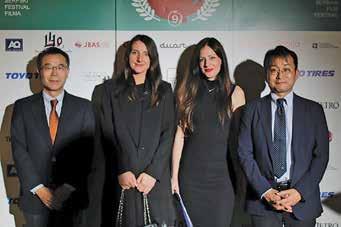
December
BUSINESS MISSION IN VRŠAC
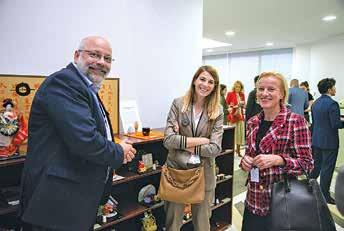
JBAS BoD member Goran Đuric hosted JBAS and Japanese Embassy First Secretary Tatsuro Masuda on a visit to the Municipality of Vršac town hall, the famous Vladičanski dvor – historical building, which serves as the seat of the Banat regional Orthodox Church administration, the Catholic Cathedral of St. Gerhard, and the City Museum.
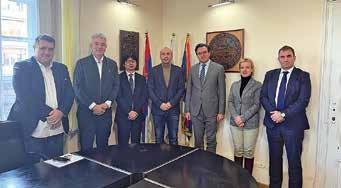
November
INDUSTRY-ACADEMY FORUM “UPSKILLING FOR INDUSTRY 5.0”
A Japanese business delegation that included JBAS members and Japanese Ambassador Katsumata participated in the Industry-Academy Forum “Upskilling for Industry 5.0”, held at Science & Technology Park Novi Sad.
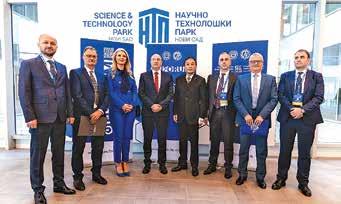
JAPAN 2023 47
JAPANESE AWARDS & ACCOLADES
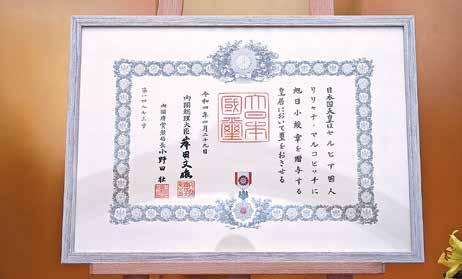
Decorated For Sincere Contributions To Friendship
On the occasion of the 140th anniversary of the establishing of friendly diplomatic relations between Serbia and Japan, Japanese Ambassador to Serbia H.E. Takahiko Katsumata presented awards for outstanding achievements to prominent individuals, institutions and associations in Serbia that have contributed to the strengthening of cooperation and good relations between our two countries
of friendship between Japan and Serbia in an effort to further deepen their already friendly relations.
“This year represents a significant turning point for our countries, which will be of great importance to further strengthening the ties that unite us,” said Ambassador Katsumata.
Adrijana Barši, one of the recipients of the award for exceptional achievements and the president of the “Hanami” Serbian-Japanese Friendship Association, said that Hanami has been promoting Japan in Serbia for years, but also Serbia in Japan, emphasising that the association will continue to do so.
Professor Ljiljana Marković, Ph.D., was awarded the special ’Order of the Rising Sun – Gold Rays with Rosette’ in recognition of her contribution to promoting and deepening cooperation between Japan and Serbia throughout her long career, with a special emphasis on improving and advancing Japanese studies and the study of the Japanese language in Serbia.
Despite our world’s history having been marked by many conflicts and wars, Serbia has always endeavoured to maintain good relations with its neighbours and other countries around the world, and with one of them, Japan, it continues to deepen cooperation that was first established in the late 19th and early 20th centuries. Thanks to carefully nurtured contacts, and the fact that we haven’t allowed ourselves to be separated by distance and some historical events, we last year celebrated 140 years of Serbian-Japanese friendship.
This occasion prompted Japanese Ambassador to Serbia H.E. Takahiko Katsumata to present awards for exceptional achievements. Awards for contributing to the strengthening of the existing friendship between the two countries were presented to the Japanese Business Alliance in Serbia (JBAS), Vršac-based Serbian-Japanese Friendship Association “Hanami”, basketball coach Marina Maljković and the team that has maintained the famous “Japanese” yellow buses that Japan donated to public transport company GSP Beograd almost two decades ago.
TARGETING THE FURTHER DEEPENING OF COOPERATION
Speaking after the presenting of awards at the Japanese Ambassadorial Residence in Belgrade’s Senjak neighbourhood, Ambassador Katsumata said that the governments of Serbia and Japan had decided to commemorate 2022 as the 140th anniversary
“The association has the mission to promote the culture of Japan and make it accessible to all citizens of Serbia. We try to bring the culture of Japan closer to both the youngest and connoisseurs of that culture through various events,” explained Barši.
Other recipients of the award also thanked the Japanese ambassador.
The same event saw the ambassador present five acknowledgements for 2022 that recognise commitments and contributions to promoting Japanese culture and improving friendly relations between Serbia and Japan. The awards were presented to the Belgrade Philharmonic, the Museum of the Yugoslav Cinematheque Film Archives, the Serbian-Japanese Association “Srce Srema” [Heart of Srem], the “Šabac Fudimi” Friendship Club and the Niš-based Taka Association.
“I believe that this year, together with you, we succeeded in properly commemorating and celebrating 140 years of friendship between our two peoples. I’m certain that our relations are now even stronger. I con-
JAPAN 2023 48
gratulate each of you and thank you for your contribution,” said Ambassador Katsumata.
OUR RELATIONS WILL BE EVEN BETTER AND STRONGER
A slightly different acknowledgement, the Spring Imperial Decoration, went to Belgrader professor Ljiljana Marković, Ph.D., who found herself included on a select list. The Government of Japan decreed that she be awarded a significant accolade, one that’s awarded to both Japanese and foreign citizens for their outstanding contributions to establishing and improving friendly relations with Japan. Professor Marković was awarded the ‘Order of the Rising Sun - Gold Rays with Rosette’ by the Government of Japan for having contributed, throughout her long career, to promoting and deepening cooperation between Japan and Serbia, with a special emphasis on improving Japanese culture studies and studies of the Japanese language in Serbia. She graduated from the Faculty of Economic and Political Sciences and the Faculty of Oriental Studies at the University of Cambridge, where she later earned her master’s degree, before receiving her doctorate from Tokyo’s Chuo University.
This isn’t the first accolade she has received, with the Government of Japan having already presented her with the Award of the Minister of Foreign Affairs of Japan (Gaimu Daijin Sho) back in 2010 for her special contribution to developing Japanology as a scientific discipline and promoting cultural ties between Japan and Serbia.
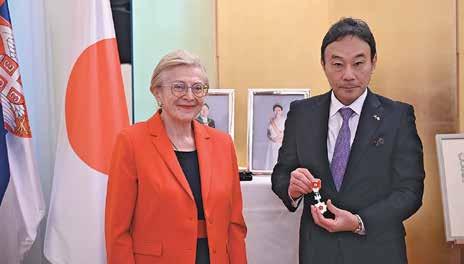
A reception to mark the occasion of the awarding of the Order of the Rising Sun - Gold Rays with Rosette, which Marković received as a foreign citizen for her exceptional contribution to establishing and improving friendly relations with Japan, was held last October at the Japanese ambassadorial residence.
ORDER OF THE RISING SUN AWARDED BY THE GOVERNMENT
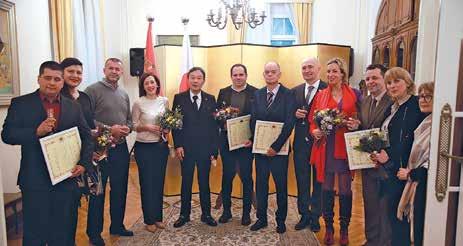
The Order of the Rising Sun is a Japanese order that was established in 1875 by Emperor Meiji and represented the first national decoration awarded by the Japanese government. The badge features rays of sunlight emanating from the rising sun, symbolising energy as powerful as the rising sun and the concept
of the “rising sun”, with Japan famously nicknamed the Land of the Rising Sun.
The Order of the Rising Sun is awarded for outstanding services to the state in various fields, excluding military service.
Until 2003, the Order of the Rising Sun held the same rank as the Order of the Precious Crown, with the Order of the Rising Sun being awarded only to men and the Order of the Precious Crown exclusively for women. The Order of the Sacred Treasure was classed as an order of slightly lower rank than the Order of the Rising Sun and the Order of the Precious Crown. As of 2003, the Order of the Rising Sun has been awarded not only to men, but also to women, while the Order of the Precious Crown has become a special order awarded only to members of the Imperial Family in Japan and female members of foreign royal families, and only when that’s deemed especially essential for diplomatic ceremonies. The Order of the
Rising Sun is awarded with an emphasis on achievements within the state, while the Order of the Sacred Treasure places an emphasis on long-term public service.
Despite being the third highest-ranked decoration awarded by the Japanese government, it is generally the highest decoration that’s ordinarily awarded. Japan’s highest order, the Supreme Order of the Chrysanthemum, is reserved for heads of state or royalty, while the second highest order, the Order of the Paulownia Flowers, is generally reserved for politicians.
Apart from professor Marković, the Order of the Rising Sun has to date been awarded to celebrated footballer Dragan Stojković ’Piksi’, current coach of the Serbian national football team, Ivan Mrkić, former Serbian foreign minister and ambassador to Japan... The three of them have all contributed to strengthening ties between Serbia and Japan through their personal commitment.
JAPAN 2023 49
The Jidai Matsuri (時代
祭, “Festival of the Ages”) celebrates the foundation of the city of Kyoto and is held each 22nd October. Along with the Aoi Matsuri and Gion Matsuri, it is one of Kyoto’s three great festivals
Festival Of The Ages
The Jidai Matsuri consists of a large parade that heads from the Imperial Palace to Heian Shrine. Meaning “Festival of the Ages” in Japanese, Jidai Matsuri participants dress in costumes that accurately represent almost every period of Japanese history, as well as famous historical figures. The festival includes around
2,000 participants and it takes two hours to watch the entire procession.
The festival culminates at Heian Shrine, and both the Jidai Matsuri and the shrine were established in 1895 to celebrate the history and culture of Kyoto. It was only a few decades previously, in 1868, that the country’s capital was moved to Tokyo after
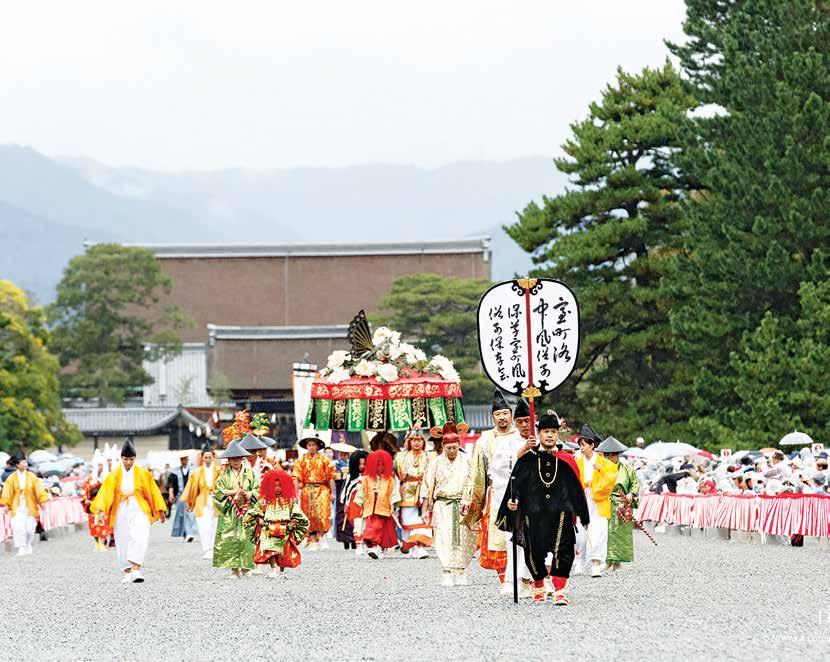
50 JAPAN 2023 KYOTO’S JIDAI MATSURI
having been in Kyoto for over a thousand years. Despite its relatively short history, the Jidai Matsuri is one of Kyoto’s three most famous festivals, alongside the Gion Matsuri, which is held in July, and May’s Aoi Matsuri.
The historical costumes and characters included in the parade cover the approximately 1100-year period during which Kyoto was the nation’s capital. The procession is separated into historical eras, then further divided into around 20 themes. The




parade begins with characters from the Meiji Restoration of 1868, then continues in reverse chronological order until reaching the beginning of the Heian Period (710-1185).
At the very head of the parade are the festival’s honorary commissioners, riding in horse drawn carriages in the style of the mid 1800s. The commissioners include figures like the governor of Kyoto Prefecture, the mayor of Kyoto City and the chairman of the city council. They are followed by figures representing the Meiji Restoration. There
is a marching band with drums and flutes and soldiers who would have fought with the imperial forces, as well as some of the era’s most notable figures, such as samurai Sakamoto Ryoma.
The largest group in the parade depicts the extravagant convoys sent by the shogun to represent him at important imperial ceremonies in Kyoto during the Edo Period (1603-1868). The three most important officials ride horses, while there is also a palanquin carried by attendants
51
that officials would use when travelling. Afterwards there is a much smaller group that consists of around half a dozen famous women from the period, including a princess sitting on a wheeled platform.
As the parade continues, spectators are able to see the armour of Oda Nobunaga and his commanders, the dress of the warriors and common folk of the Muromachi Period (1338-1573), more famous historical women and nobles of the Heian Period (794-1185). The costumes and characters of the military,




cultural, aristocratic and common people are all on display.
The parade’s last group is the most important in terms of Shinto rituals. A large number of attendants accompany and carry two mikoshi (portable shrines) containing the spirits of Emperor Kammu and Emperor Komei, respectively the first and last emperors to reign from Kyoto. Heian Shrine is dedicated to the spirits of these two emperors, who normally reside in the shrine. However, during the Jidai Matsuri

52
JAPAN 2023 KYOTO’S JIDAI MATSURI
The aspect of the Jidai Matsuri parade to which the most attention should be paid is the historical attire. Each garment has been made to be as authentic and close to those warn at the time as possible, right down to the materials and dyes used
With historical figures like Toyotomi Hideyoshi and Nobunaga Ieyasu on horseback, Sakamoto Ryoma on foot, and Murasaki



Shikibu on a float, this festival is a history buff’s dream. The “ladies of the Edo period”, who appear in the latter half of the parade, are also very much worth mentioning
they are able to travel through the city in the mikoshi.
The procession leaves Kyoto Imperial Palace at around midday, then loops south to arrive at Heian Shrine by around 2.30pm. The route stretches over a distance of approximately five kilometres and takes about two hours to pass.
The aspect of the Jidai Matsuri parade to which the most attention should be paid is the historical attire. Each garment has been made to be as authentic and close to those warn at the time as possible, right down to the materials and dyes used. The garments are made using iconic Kyoto techniques, such as hand-painted yuzen dyeing and gold brocade, and are all worthy of closer inspection.
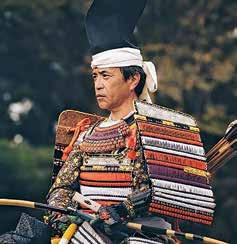

53
True Friendships Are To Be Celebrated
The Vršac-based “Hanami” association organised a series of cultural and sporting events throughout the course of 2022 in commemoration of the 140th anniversary of the establishing of bilateral relations between Japan and Serbia, celebrating 140 years of friendly relations between our two countries
“Hanami” isn’t resting on its laurels, but is rather implementing major preparations for its traditional review of Japanese films, exhibitions of manga drawings, calligraphy and photography, the Balkan Cup in Japanese fencing, an international piano festival, the upcoming tour of trumpeter Danijela Veselinović, the new issue of its Serbian-Japanese newspaper and much more.
“At the start of last year, His Excellency Takahiko Katsumata, Japanese ambassador to Serbia, awarded an accolade to “Hanami” for exceptional achievements that have contributed to furthering mutual understanding and improving friendly relations between Japan and Serbia. This award provided additional encouragement for our team to work hard throughout 2022 and to
start making precise plans for 2023,” says Adrijana Barši, founder of the “Hanami” Association of Serbian-Japanese Friendship. Here, exclusively for our magazine, Mrs Barši provides a detailed presentation of all the events and happenings that the association organised between January and December last year and which marked the strong and sincere friendship between the two countries.
VRŠAC HOSTS THE BEST SAMURAI
Firstly, in cooperation with the Embassy of Japan, the Cultural Centre of Vršac hosted a review of Japanese films that symbolically marked the end of the pandemic, while Vršac hosted the best samurai based in
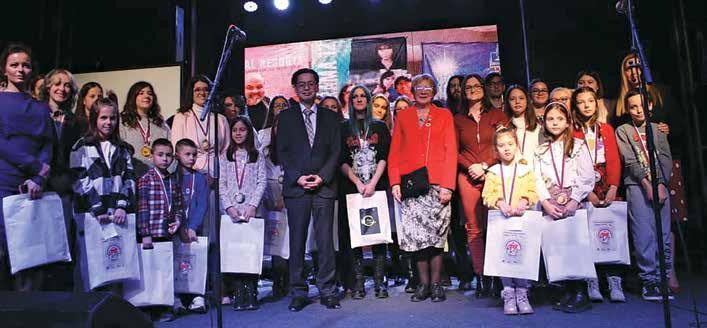
Europe from 6th to 9th May. Club Goshinkan organised the 12th European Sport Chanbara Championship, representing the world’s first major Japanese fencing event since the outbreak of the pandemic.
“Thanks to the support of the Ministry of Sport of the Republic of Serbia and the Kendo Federation of Serbia, we staged as many as 700 bouts and broadcast them live, so they were enjoyed by more than 10,000 people around the world. We are particularly proud of the fact that video judging was introduced for the first time in the history of Japanese sport fencing, so the final contests unfolded under the patronage and watchful eyes of the greatest masters from Japan,” notes our interlocutor.
The Serbian national team won 27 me -
JAPAN 2023 54
HANAMI VRŠAC
dals in individual bouts and three medals in team bouts, which marks our greatest success in this sport to date. The competition was formally opened by Japanese Ambassador to Serbia H.E. Takahiko Katsumata and Vršac Mayor Dragana Mitrović.
SUMMER MARKED BY EXHIBITIONS AND REPORTS
Late May saw “Hanami” realise two exhibitions: “Series of Morning Conversations” by academic painter Jelena Gorički and “Kokedama” by artist Gordana Kalnak, who presented plant arrangements created using this special Japanese technique. The third issue of the “Hanami” Serbian-Japanese newspaper, dedicated to the Tokyo Olympics, was published during the summer.
“We also supported exhibitions of Japanese artists at the Bela Crkva Museum, the Fotorama photography festival in Kragujevac, the “Chefs without Borders” event at the Egység Cultural Station and the “Metroplex” futuristic exhibition at the New Cultural Settlement in Novi Sad, as well as almost all events in Belgrade... We also digitised a large number of catalogues of Japanese and Serbian artists, which reached a large number of people in both countries via mobile applications,” explains Barši, listing all the things she worked
arduously, together with her associates, to implement during the summer.
Reportages, photographs, live broadcasts and short films from different parts of Japan were met with great enthusiasm, and enabled the Serbian public to get acquainted with the kabuki theatre form, ikebana flower arranging and origami, calligraphy and sumo wrestling, but also to discover what it’s like to ride a bike through blossoming sakura trees, enjoying the cherry blossom, in the parks of Tokyo and Kyoto...
NUMEROUS PROGRAMMES FOR BOTH CHILDREN AND ADULTS

September showed that there is no rest for “Hanami”, as it was then that the photo exhibition entitled “Tohoku – Japan’s best kept secret” was presented for the first time. The opening of the exhibition
saw the photographer responsible for the works, Masaki Nakamura, thank the people of Serbia, who were the first to collect aid for the earthquake-hit region of Tahoku.
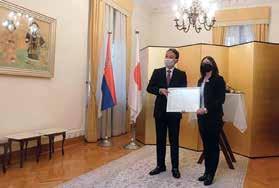
“We subsequently organised Rakugo, a Japanese theatre featuring music from the Edo period performed by artists San’yûtei Rakumaro (rakugo master), Takako Hiraoka (soprano) and Yoshiko Kadota (piano).”
Marking the unfolding of October was the major international piano festival “Aisa&Friends”, held in both Belgrade and Vršac. The festival opened with a concert by Japanese pianist Aisa Ijiri at the Belgrade Philharmonic, while the second day featured a gala concert in the Great Hall of Kolarac Endowment that included the performances of young pianists Yejun Yong (Korea), Anju Nogiwa (Japan), Zosia Dzimitrowicz (UK), Kenichiro Kojima (Japan) and Ekaterina Bonyushkina (Russia). The second part of the concert featured the performances of two duos: Japan’s Maiko Mori and Aisa Ijiri; and Serbian LP DUO Sonja Lončar and Andrija Pavlović.
The festival then moved on to Vršac’s Millennium Centre and the Josif Marinković Music School. The entire week included daily masterclasses and concerts, complete with free masterclasses with professors from Japan for children from 12 music

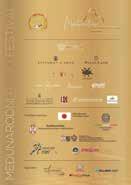

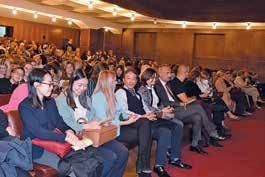
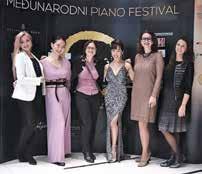
JAPAN 2023 55
We digitised a large number of catalogues of Japanese and Serbian artists, which reached a large number of people in both countries via mobile applications
schools in Serbia. Artist Maiko Mori gave a lecture at the Svilara Cultural Station to students of the Novi Sad Academy of Arts on composing, animation and music production for video games.
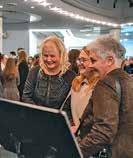

YEAR’S END BROUGHT TOP CONTENT
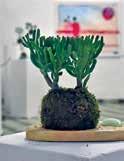
The Aisa&Friends Festival became part of Italy’s prestigious Montecatini International Piano Competition, the premiere and final of which actually took place in Vršac. The competition was opened by Florence Philharmonic representative Paolo Davide Cognetti, while the event’s main sponsors were Palladio East, Confindustria Serbia, the Italian Institute of Culture and the Italian Embassy in the Republic of Serbia. This ensured that, apart from Japan, residents of Vršac could feel the exceptional spirit of Italy throughout the entire final, which included seven competing finalists from Japan, Serbia, Ukraine, Taiwan, Russia and the U.S.
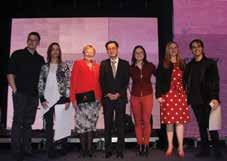
The festival culminated with a concert by Serbia’s princess of the trumpet, Danijela Veselinović, accompanied by an orchestra, which served to announce the upcoming collaboration with a traditional orchestra from Japan for a major tour of Japan and Serbia in 2023.
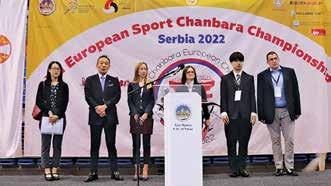
“Hanami” was also part of November’s SPIK Festival of Movement and Choreodrama in Kosovska Mitrovica, which was
set up by Vera Obradović Ph.D. This event included the presenting of an exhibition of photographs by Japanese artists and a lecture on the topic “Japanese swordsmanship – from traditional samurai skills to a modern sports concept”. “Hanami” also organised the workshop of contemporary Japanese artist and choreographer Chiemi Fukumori, entitled “Dance like no one else”.
“For the end of the year, Vršac’s Borislav Petrov-Braca Gymnasium High School and “Hanami” held a contest for fine art and literary works on the topic “Japan and Serbia, 140 years of friendship - What unites us”, which received submissions of 877 works from 36 Serbian towns and cities. In the Millennium Centre’s multimedia hall, we presented the educational video game “Nea&Kuki discover Japan”, which will soon be available via a free application, and the
board game “Japanese Adventure”, which we print in large numbers as educational material,” explains a proud Mrs Barši.
ENTERING 2023 WITH MAJOR PLANS
According to the announcement of our interlocutor, “Hanami” is this year preparing its traditional review of Japanese films, an exhibition of the best drawings by manga artists, the Balkan Cup in Japanese fencing, the second international piano festival, Japanese theatre performances, exhibitions of various artists, calligraphers, photographers, Danijela Veselinović’s tour of Japan, a new issue of the Serbian-Japanese newspaper and much more.
“We receive great support for everything we do from the Embassy of Japan in the Republic of Serbia, the Ministry of Culture, Ministry of Youth and Sports, the Provincial Secretariat for Culture, the City of Vršac, the Kendo Association of Serbia, the Josif Marinković Music School, the Borislav Petrov Braca Gymnasium High School and Club Goshinkan,” says Barši, before formally announcing the construction of the Hanami Centre of Japanese Sport and Culture in Vršac. The design concept project has been entrusted to architect Milorad Ćirić, while the centre – to be presented this coming May – will feature a gallery, a traditional dojo training hall, a tea ceremony house and a Japanese garden.
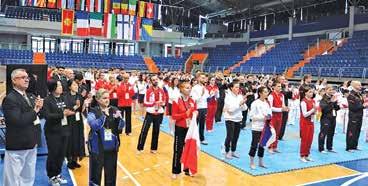
JAPAN 2023 56
Assistance in commemorating the anniversary was provided by the Serbian ministries of culture and information and youth and sports, the Provincial Secretariat for Culture, the City of Vršac and numerous Japanese institutions
Review Of Japanese Films 2023




The Japanese Embassy to the Republic ofSerbia informs all interested parties that four new Japanese Films will be screened between Thursday, 9th February and Sunday, 12th February, 2003, at the Yugoslav Film Archives Cinematheque (Uzun Mirkova 1,Belgrade).These films have been provided in cooperation with the Japanese Foundation and includesubtitles in the Serbian language.
YUGOSLAV CINEMATHEQUE (UZUN MIRKOVA 1, BELGRADE)
THE PROGRAM:
THURSDAY, FEBRUARY 9, 2023 AT 8:00 PM
A BANANA? AT THIS TIME OF NIGHT?
FRIDAY, FEBRUARY 10, 2023 AT 8:00 PM
IWANE: THE SWORD OF SERENITY
SATURDAY, FEBRUARY 11, 2023 AT 8:00 PM
BEAUTIFUL STAR
SUNDAY, FEBRUARY 12, 2023 AT 8:00 PM
ALMOST A MIRACLE
JAPAN 2023 57
Ehomaki: The Sushi Roll That Brings You Luck
Ehomaki (恵方巻), which is made up of the kanji for 恵 (favoured, blessed), 方 (direction), and 巻 (roll), is a thick sushi roll containing a variety of toppings packed in and is eaten on the evening of setsubun, which marks the last day of winter

JAPAN 2023 58
TRADITION



JAPAN 2023 59




















































 BASU, FORMER CHIEF ECONOMIST OF THE WORLD BANK AND CHIEF ECONOMIC ADVISOR TO THE GOVERNMENT OF INDIA
BASU, FORMER CHIEF ECONOMIST OF THE WORLD BANK AND CHIEF ECONOMIC ADVISOR TO THE GOVERNMENT OF INDIA














 Predrag Milutinović MSc eng. Architect, Founder & Owner, Studio MAPA Architects
Milorad Janković General Manager of Gorski Hotel&Spa, Kopaonik Ski Resort
Black Horse FAS, Sombor
Predrag Milutinović MSc eng. Architect, Founder & Owner, Studio MAPA Architects
Milorad Janković General Manager of Gorski Hotel&Spa, Kopaonik Ski Resort
Black Horse FAS, Sombor






















 By Maximo Torero, Chief Economist of the Food and Agriculture Organization of the United Nations
By Maximo Torero, Chief Economist of the Food and Agriculture Organization of the United Nations




 BRANSON, CHIEF PURPOSE AND VISION OFFICER AT VIRGIN
BRANSON, CHIEF PURPOSE AND VISION OFFICER AT VIRGIN







































 ~
Vivienne Westwood
~
Vivienne Westwood






































































































































 GORAN PEKEZ, President of the Japanese Business Alliance in Serbia (JBAS)
GORAN PEKEZ, President of the Japanese Business Alliance in Serbia (JBAS)


























































































